100+ Great Chemistry Research Topics
Table of contents
- 1 5 Tips for Writing Chemistry Research Papers
- 2 Chemical Engineering Research Topics
- 3 Organic Сhemistry Research Topics
- 4 Іnorganic Сhemistry Research Topics
- 5 Biomolecular Сhemistry Research Topics
- 6 Analytical Chemistry Research Topics
- 7 Computational Chemistry Research Topics
- 8 Physical Chemistry Research Topics
- 9 Innovative Chemistry Research Topics
- 10 Environmental Chemistry Research Topics
- 11 Green Chemistry Research Topics
- 12.1 Conclusion
Do you need a topic for your chemistry research paper? Are you unsure of where to start? Don’t worry – we’re here to help. In this post, we’ll go over a series of the best chemistry research paper topics as well as Tips for Writing Chemistry Research Papers on different topics. By the time you finish reading this post, you’ll have plenty of ideas to get started on your next research project!
There are many different subfields of chemistry, so it can be tough to find interesting chemistry topics to write about. If you’re struggling to narrow down your topic, we’ll go over lists of topics in multiple fields of study.
Doing research is important to help scientists learn more about the world around us. By researching different compounds and elements, we can learn more about how they interact with one another and how they can be used to create new products or improve existing ones.
There are many different topics that you can choose to research in chemistry. Here are just a few examples:
- The history of chemistry and how it has evolved over time
- How different chemicals react with one another
- How to create new compounds or improve existing ones
- The role of chemistry in the environment
- The health effects of different chemicals

5 Tips for Writing Chemistry Research Papers
Once you have chosen a topic for your research paper , it is important to follow some tips to ensure that your paper is well-written and accurate. Here are a few tips to get you started:
- Start by doing some background research on your topic. This will help you understand the basics of the topic and give you a good foundation to build your paper on.
- Make sure to cite all of the sources that you use in your paper. This will help to show where you got your information and will also help to add credibility to your work.
- Be sure to proofread your paper before you submit it. This will ensure that there are no errors and that your paper is clear and concise.
- Get help from a tutor or friend if you are struggling with your paper. They may be able to offer helpful advice or feedback.
- Take your time when writing your research paper . This is not a race, and it is important to make sure that you do a good job on your research.
By following these tips, you can be sure that your chemistry research paper will be a success! So what are you waiting for? Let’s go over some of the best research paper topics out there.
Chemical Engineering Research Topics
Chemical Engineering is a branch of engineering that deals with the design and application of chemical processes. If you’re wondering how to choose a paper topic, here are some ideas to inspire you:
- How to create new alloy compounds or improve existing ones
- The health effects of the food industry chemicals
- Chemical engineering and sustainable development
- The future of chemical engineering
- Chemical engineering and the food industry
- Chemical engineering and the pharmaceutical industry
- Chemical engineering and the cosmetics industry
- Chemical engineering and the petrochemical industry
- Biocompatible materials for drug delivery systems
- Membrane technology in water treatment
- Development of synthetic fibers for industrial use
These are just a few examples – there are many more possibilities out there! So get started on your research today. Who knows what you might discover!

Organic Сhemistry Research Topics
Organic chemistry is the study of carbon-containing molecules. There are many different organic chemistry research topics that a student could choose to focus on and here are just a few examples of possible research projects in organic chemistry:
- Investigating new methods for synthesizing chiral molecules
- Studying the structure and reactivity of carbon nanotubes
- Investigating metal complexes with organometallic ligands
- Designing benzene derivatives with improved thermal stability
- Exploring new ways to control the stereochemistry of chemical reactions
- Studying the role of enzymes in organic synthesis
- Investigating new strategies for combating drug resistance
- Developing new methods for detecting explosives residues
- Studying the photochemistry of organic molecules
- Studying the behavior of organometallic compounds in biological systems
- Synthetic routes for biodegradable plastics
- Catalysis in organic synthesis
- Development of non-toxic solvents
Іnorganic Сhemistry Research Topics
Inorganic Chemistry is the study of the chemistry of materials that do not contain carbon. Unlike other chemistry research topics, these include elements such as metals, minerals, and inorganic compounds. If you are looking for inorganic chemistry research topics on inorganic chemistry, here are some ideas to get you started:
- How different metals react with one another
- How to create new alloys or improve existing ones
- The role of inorganic chemistry in the environment
- Rare earth elements and their applications in electronics
- Inorganic polymers in construction materials
- Photoluminescent materials for energy conversion
- Inorganic chemistry and sustainable development
- The future of inorganic chemistry
- Inorganic chemistry and the food industry
- Inorganic chemistry and the pharmaceutical industry
- Atomic structure progressive scale grading
- Inorganiс Сhemistry and the cosmetics industry

Biomolecular Сhemistry Research Topics
Biomolecular chemistry is the study of molecules that are important for life. These molecules can be found in all living things, from tiny bacteria to the largest animals. Researchers who work in this field use a variety of techniques to learn more about how these molecules function and how they interact with each other.
If you are looking for essential biomolecular chemistry research topics, here are some ideas to get you started:
- The structure and function of DNA
- Lipidomics and its applications in disease diagnostics
- The structure and function of proteins
- The role of carbohydrates in the body
- The role of lipids in the body
- How enzymes work
- Protein engineering for therapeutic applications
- The role of biochemistry in heart disease
- Cyanides and their effect on the body
- The role of biochemistry in cancer treatment
- The role of biochemistry in Parkison’s disease treatment
- The role of biochemistry in the immune system
- Carbohydrate-based vaccines
The possibilities are endless for someone willing to dedicate some time to research.
Analytical Chemistry Research Topics
Analytical Chemistry is a type of chemistry that helps scientists figure out what something is made of. This can be done through a variety of methods, such as spectroscopy or chromatography. If you are looking for research topics, here are some ideas to get you started:
- How food chemicals react with one another
- Mass spectrometry
- Microplastics detection in marine environments
- Development of sensors for heavy metal detection in water
- Analytical aspects of gas and liquid chromatography
- Analytical chemistry and sustainable development
- Atomic absorption spectroscopy methods and best practices
- Analytical chemistry and the pharmaceutical industry in Ibuprofen consumption
- Analytical chemistry and the cosmetics industry in UV protectors
- High-throughput screening methods in pharmaceutical analysis
- Dispersive X-ray analysis of damaged tissues
Analytical chemistry is considered by many a complex science and there is a lot yet to be discovered in the field.

Computational Chemistry Research Topics
Computational chemistry is a way to use computers to help chemists understand chemical reactions. This can be done by simulating reactions or by designing new molecules. If you are looking for essential chemistry research topics in computational chemistry, here are some ideas to get you started:
- Molecular mechanics simulation
- Machine learning applications in predicting molecular properties
- Reaction rates of complex chemical reactions
- Designing new molecules: how can simulation help
- The role of computers in the study of quantum mechanics
- How to use computers to predict chemical reactions
- Using computers to understand organic chemistry
- The future of computational Chemistry in organic reactions
- The impacts of simulation on the development of new medications
- Combustion reaction simulation impact on engine development
- Quantum-chemistry simulation review
- Simulation of protein folding and misfolding in diseases
- Development of algorithms for chemical synthesis planning
- Applications of Metal-Organic Frameworks in water sequestration and catalysis
Computers are cutting-edge technology in chemical research and this relatively new field of study has a ton yet to be explored.
Physical Chemistry Research Topics
Physical chemistry is the study of how matter behaves. It looks at the physical and chemical properties of atoms and molecules and how they interact with each other. If you are looking for physical chemistry research topics, here are some ideas to get you started:
- Standardization of pH scales
- Structure of atom on a quantum scale
- Bonding across atoms and molecules
- The effect of temperature on chemical reactions
- The role of light in in-body chemical reactions
- Chemical kinetics
- Molecular dynamics in confined spaces
- Quantum computing for solving chemical problems
- Studies on non-Newtonian fluids in industrial processes
- Surface tension and its effects on mixtures
- The role of pressure in chemical reactions
- Rates of diffusion in gases and liquids
- The role of entropy in chemical reactions
Here are just a few samples, but there are plenty more options! Start your research right now!
Innovative Chemistry Research Topics
Innovative chemistry is all about coming up with new ideas and ways to do things. This can be anything from creating new materials to finding new ways to make existing products. If you are looking for ground-breaking chemistry research topics, here are some ideas to get you started:
- Amino acids side chain effects in protein folding
- Chemistry in the production of nanomaterials
- The role of enzymes in chemical reactions
- Photocatalysis in 3D printing
- Avoiding pesticides in agriculture
- Combining chemical and biological processes
- Gene modification in medicinal chemistry
- The role of quantum mechanics in chemical reactions
- Astrochemical research on extraterrestrial molecules
- Spectroscopy signatures of pressurized organic components
- Development of smart materials with responsive properties
- Chemistry in space: studying chemical reactions in microgravity
- Utilization of CO2 in chemical synthesis
- Use of black soldier fly carcasses for bioplastic production using extracted chitin
- Bioorthogonal chemistry for molecule synthesis inside living systems
If you need a hand, there are several sites that also offer research papers for sale and can be a great asset as you work to create your own research papers.
Whatever route you decide to take, good luck! And remember – the sky’s the limit when it comes to research! So get started today and see where your studies may take you. Who knows, you might just make a breakthrough discovery!
Environmental Chemistry Research Topics
Environmental Chemistry is the study of how chemicals interact with the environment. This can include anything from the air we breathe to the water we drink. If you are looking for environmental chemistry research topics, here are some ideas to get you started:
- Plastic effects on ocean life
- Urban ecology
- The role of carbon in climate change
- Air pollution and its effects
- Water pollution and its effects
- Chemicals in food and their effect on the body
- The effect of chemicals on plant life
- Earth temperature prediction models
- Effects of pharmaceuticals in aquatic environments
- Atmospheric chemistry and urban air quality
- Bioremediation techniques for oil spill cleanup
- Regulatory and environmental impact of Per- and Polyfluoroalkyl (PFA) substances
- Comparison of chemical regulation impacts like PFA with historical cases such as lead in fuel
A lot of research on the environment is being conducted at the moment because the environment is in danger. There are a lot of environmental problems that need to be solved, and research is the key to solving them.
Green Chemistry Research Topics
Green chemistry is the study of how to make products and processes that are environmentally friendly. This can include anything from finding new ways to recycle materials to developing new products that are biodegradable. If you are looking for green chemistry research topics, here are some ideas to get you started:
- Recycling and reuse of materials
- Developing biodegradable materials
- Improving existing recycling processes
- Green chemistry and sustainable development
- The future of green chemistry
- Green chemistry and the food industry
- Lifecycle assessment of chemical processes
- Green chemistry and the pharmaceutical industry
- Development of catalysts for green chemistry
- Green chemistry and the cosmetics industry
- Alternative energy sources for chemical synthesis
A more environmentally friendly world is something we all aspire for and a lot of research has been conducted on how we can achieve this, making this one of the most promising areas of study. The results have been varied, but there are a few key things we can do to make a difference.
Controversial Chemistry Research Topics
Controversial chemistry is all about hot-button topics that people are passionate about. This can include anything from the use of chemicals in warfare to the health effects of different chemicals. If you are looking for controversial topics to write about , here are some ideas to get you started:
- The use of chemicals in warfare
- Gene modification in human babies
- Bioengineering
- How fast food chemicals affect the human brain
- The role of the government in regulating chemicals
- Evolution of cigarette chemicals over time
- Chemical effects of CBD oils
- Ethical issues in genetic modification of organisms
- Nuclear energy: risks and benefits
- Use of chemicals in electronic waste recycling
- Antidepressant chemical reactions
- Synthetic molecule replication methods
- Gene analysis
Controversial research papers often appear in the media before it has been peer-reviewed and published in a scientific journal. The reason for this is that the media is interested in stories that are new, exciting, and generate a lot of debate.
Chemistry is an incredibly diverse and interesting field, with many controversial topics to write about. If you are looking for a research topic, consider the examples listed in this article. With a little bit of effort, you are sure to find a topic that is both interesting and within your skillset.
In order to be a good researcher, it is important to be able to think critically and solve problems. However, innovation in chemistry research can be challenging. When thinking about how to innovate, it is important to consider both the practical and theoretical aspects of your research. Additionally, try to build on the work of others in order to create something new and unique. With a little bit of effort, you are sure to be able to find a topic that is both interesting and within your skillset.
Happy writing!
Readers also enjoyed

WHY WAIT? PLACE AN ORDER RIGHT NOW!
Just fill out the form, press the button, and have no worries!
We use cookies to give you the best experience possible. By continuing we’ll assume you board with our cookie policy.
- Privacy Policy

Home » 300+ Chemistry Research Topics
300+ Chemistry Research Topics
Table of Contents

Chemistry is a fascinating and complex field that explores the composition, properties, and behavior of matter at the molecular and atomic level. As a result, there are numerous chemistry research topics that can be explored, ranging from the development of new materials and drugs to the study of natural compounds and the environment. In this rapidly evolving field, researchers are constantly uncovering new insights and pushing the boundaries of our understanding of chemistry. Whether you are a student, a professional researcher, or simply curious about the world around you, there is always something new to discover in the field of chemistry. In this post, we will explore some of the exciting and important research topics in chemistry today.
Chemistry Research Topics
Chemistry Research Topics are as follows:
Organic Chemistry Research Topics
Organic Chemistry Research Topics are as follows:
- Development of novel synthetic routes for the production of biologically active natural products
- Investigation of reaction mechanisms and kinetics for organic transformations
- Design and synthesis of new catalysts for asymmetric organic reactions
- Synthesis and characterization of chiral compounds for pharmaceutical applications
- Development of sustainable methods for the synthesis of organic molecules using renewable resources
- Discovery of new reaction pathways for the conversion of biomass into high-value chemicals
- Study of molecular recognition and host-guest interactions for drug design
- Design and synthesis of new materials for energy storage and conversion
- Development of efficient and selective methods for C-H functionalization reactions
- Exploration of the reactivity of reactive intermediates such as radicals and carbenes
- Study of supramolecular chemistry and self-assembly of organic molecules
- Development of new methods for the synthesis of heterocyclic compounds
- Investigation of the biological activities and mechanisms of action of natural products
- Synthesis of polymeric materials with controlled architecture and functionality
- Development of new synthetic methodologies for the preparation of bioconjugates
- Investigation of the mechanisms of enzyme catalysis and the design of enzyme inhibitors
- Synthesis and characterization of novel fluorescent probes for biological imaging
- Development of new synthetic strategies for the preparation of carbohydrates and glycoconjugates
- Study of the properties and reactivity of carbon nanomaterials
- Design and synthesis of novel drugs for the treatment of diseases such as cancer, diabetes, and Alzheimer’s disease.
Inorganic Chemistry Research Topics
Inorganic Chemistry Research Topics are as follows:
- Synthesis and characterization of new metal-organic frameworks (MOFs) for gas storage and separation applications
- Development of new catalysts for sustainable chemical synthesis reactions
- Investigation of the electronic and magnetic properties of transition metal complexes for spintronics applications
- Synthesis and characterization of novel nanomaterials for energy storage applications
- Development of new ligands for metal coordination complexes with potential medical applications
- Investigation of the mechanism of metal-catalyzed reactions using advanced spectroscopic techniques
- Synthesis and characterization of new inorganic materials for photocatalytic water splitting
- Development of new materials for electrochemical carbon dioxide reduction reactions
- Investigation of the properties of transition metal oxides for energy storage and conversion applications
- Synthesis and characterization of new metal chalcogenides for optoelectronic applications
- Development of new methods for the preparation of inorganic nanoparticles with controlled size and shape
- Investigation of the reactivity and catalytic properties of metal clusters
- Synthesis and characterization of new metal-organic polyhedra (MOPs) for gas storage and separation applications
- Development of new methods for the synthesis of metal nanoparticles using environmentally friendly reducing agents
- Investigation of the properties of metal-organic frameworks for gas sensing applications
- Synthesis and characterization of new coordination polymers with potential magnetic and electronic properties
- Development of new materials for electrocatalytic water oxidation reactions
- Investigation of the properties of metal-organic frameworks for carbon capture and storage applications
- Synthesis and characterization of new metal-containing polymers with potential applications in electronics and energy storage
- Development of new methods for the synthesis of metal-organic frameworks using green solvents and renewable resources.
Physical Chemistry Research Topics
Physical Chemistry Research Topics are as follows:
- Investigation of the properties and interactions of ionic liquids in aqueous and non-aqueous solutions.
- Development of advanced analytical techniques for the study of protein structure and dynamics.
- Investigation of the thermodynamic properties of supercritical fluids for use in industrial applications.
- Development of novel nanomaterials for energy storage applications.
- Studies of the surface chemistry of catalysts for the optimization of their performance in chemical reactions.
- Development of new methods for the synthesis of complex organic molecules with improved yields and selectivity.
- Investigation of the molecular mechanisms involved in the catalysis of biochemical reactions.
- Development of new strategies for the controlled release of drugs and other bioactive molecules.
- Studies of the interaction of nanoparticles with biological systems for biomedical applications.
- Investigation of the thermodynamic properties of materials under extreme conditions of temperature and pressure.
- Development of new methods for the characterization of materials at the nanoscale.
- Investigation of the electronic and magnetic properties of materials for use in spintronics.
- Development of new materials for energy conversion and storage.
- Studies of the kinetics and thermodynamics of adsorption processes on surfaces.
- Investigation of the transport properties of ionic liquids for use in energy storage and conversion devices.
- Development of new materials for the capture and sequestration of greenhouse gases.
- Studies of the structure and properties of biomolecules for use in drug design and development.
- Investigation of the dynamics of chemical reactions in solution using time-resolved spectroscopic techniques.
- Development of new approaches for the synthesis of metallic and semiconductor nanoparticles with controlled size and shape.
- Studies of the structure and properties of materials for use in electrochemical energy storage devices.
Analytical Chemistry Research Topics
Analytical Chemistry Research Topics are as follows:
- Development and optimization of analytical techniques for the quantification of trace elements in food and environmental samples.
- Design and synthesis of novel analytical probes for the detection of biomolecules in complex matrices.
- Investigation of the fundamental mechanisms involved in the separation and detection of complex mixtures using chromatographic techniques.
- Development of sensors and biosensors for the detection of chemical and biological species in real-time.
- Investigation of the chemical and structural properties of nanomaterials and their applications in analytical chemistry.
- Development and validation of analytical methods for the quantification of contaminants and pollutants in water, air, and soil.
- Investigation of the molecular mechanisms underlying drug metabolism and toxicity using mass spectrometry.
- Development of analytical tools for the identification and quantification of drugs of abuse in biological matrices.
- Investigation of the chemical composition and properties of natural products and their applications in medicine and food science.
- Development of advanced analytical techniques for the characterization of proteins and peptides.
- Investigation of the chemistry and mechanism of action of antioxidants in foods and their impact on human health.
- Development of analytical methods for the detection and quantification of microorganisms in food and environmental samples.
- Investigation of the molecular mechanisms involved in the biosynthesis and degradation of important biomolecules such as proteins, carbohydrates, and lipids.
- Development of analytical methods for the detection and quantification of environmental toxins and their impact on human health.
- Investigation of the structure and properties of biological membranes and their role in drug delivery and disease.
- Development of analytical techniques for the characterization of complex mixtures such as petroleum and crude oil.
- Investigation of the chemistry and mechanism of action of natural and synthetic dyes.
- Development of analytical techniques for the detection and quantification of pharmaceuticals and personal care products in water and wastewater.
- Investigation of the chemical composition and properties of biopolymers and their applications in biomedicine and biomaterials.
- Development of analytical methods for the identification and quantification of essential nutrients and vitamins in food and dietary supplements.
Biochemistry Research Topics
Biochemistry Research Topics are as follows:
- The role of enzymes in metabolic pathways
- The biochemistry of DNA replication and repair
- Protein folding and misfolding diseases
- Lipid metabolism and the pathogenesis of atherosclerosis
- The role of vitamins and minerals in human metabolism
- Biochemistry of cancer and the development of targeted therapies
- The biochemistry of signal transduction pathways and their regulation
- The mechanisms of antibiotic resistance in bacteria
- The biochemistry of neurotransmitters and their roles in behavior and disease
- The role of oxidative stress in aging and age-related diseases
- The biochemistry of microbial fermentation and its applications in industry
- The biochemistry of the immune system and its response to pathogens
- The biochemistry of plant metabolism and its regulation
- The molecular basis of genetic diseases and gene therapy
- The biochemistry of membrane transport and its role in cell function
- The biochemistry of muscle contraction and its regulation
- The role of lipids in membrane structure and function
- The biochemistry of photosynthesis and its regulation
- The biochemistry of RNA splicing and alternative splicing events
- The biochemistry of epigenetics and its regulation in gene expression.
Environmental Chemistry Research Topics
Environmental Chemistry Research Topics are as follows:
- Investigating the effects of microplastics on aquatic ecosystems and their potential impact on human health.
- Examining the impact of climate change on soil quality and nutrient availability in agricultural systems.
- Developing methods to improve the removal of heavy metals from contaminated soils and waterways.
- Assessing the effectiveness of natural and synthetic antioxidants in mitigating the effects of air pollution on human health.
- Investigating the potential for using algae and other microorganisms to sequester carbon dioxide from the atmosphere.
- Studying the role of biodegradable plastics in reducing plastic waste and their impact on the environment.
- Examining the impact of pesticides and other agricultural chemicals on water quality and the health of aquatic organisms.
- Investigating the effects of ocean acidification on marine organisms and ecosystems.
- Developing new materials and technologies to reduce carbon emissions from industrial processes.
- Evaluating the effectiveness of phytoremediation in cleaning up contaminated soils and waterways.
- Studying the impact of microplastics on terrestrial ecosystems and their potential to enter the food chain.
- Developing sustainable methods for managing and recycling electronic waste.
- Investigating the role of natural processes, such as weathering and erosion, in regulating atmospheric carbon dioxide levels.
- Assessing the impact of urbanization on air quality and developing strategies to mitigate pollution in cities.
- Examining the effects of climate change on the distribution and abundance of species in different ecosystems.
- Investigating the impact of ocean currents on the distribution of pollutants and other environmental contaminants.
- Developing new materials and technologies for renewable energy generation and storage.
- Studying the effects of deforestation on soil quality, water availability, and biodiversity.
- Assessing the potential for using waste materials, such as agricultural residues and municipal solid waste, as sources of renewable energy.
- Investigating the role of natural and synthetic chemicals in regulating ecosystem functions, such as nutrient cycling and carbon sequestration.
Polymer Chemistry Research Topics
Polymer Chemistry Research Topics are as follows:
- Development of new monomers for high-performance polymers
- Synthesis and characterization of biodegradable polymers for sustainable packaging
- Design of stimuli-responsive polymers for drug delivery applications
- Investigation of the properties and applications of conductive polymers
- Development of new catalysts for controlled/living polymerization
- Synthesis of polymers with tailored mechanical properties
- Characterization of the structure-property relationship in polymer nanocomposites
- Study of the impact of polymer architecture on material properties
- Design and synthesis of new polymeric materials for energy storage
- Development of high-throughput methods for polymer synthesis and characterization
- Exploration of new strategies for polymer recycling and upcycling
- Synthesis and characterization of responsive polymer networks for smart textiles
- Design of advanced polymer coatings with self-healing properties
- Investigation of the impact of processing conditions on the morphology and properties of polymer materials
- Study of the interactions between polymers and biological systems
- Development of biocompatible polymers for tissue engineering applications
- Synthesis and characterization of block copolymers for advanced membrane applications
- Exploration of the potential of polymer-based sensors and actuators
- Design of novel polymer electrolytes for advanced batteries and fuel cells
- Study of the behavior of polymers under extreme conditions, such as high pressure or temperature.
Materials Chemistry Research Topics
Materials Chemistry Research Topics are as follows:
- Development of new advanced materials for energy storage and conversion
- Synthesis and characterization of nanomaterials for environmental remediation
- Design and fabrication of stimuli-responsive materials for drug delivery
- Investigation of electrocatalytic materials for fuel cells and electrolysis
- Fabrication of flexible and stretchable electronic materials for wearable devices
- Development of novel materials for high-performance electronic devices
- Exploration of organic-inorganic hybrid materials for optoelectronic applications
- Study of corrosion-resistant coatings for metallic materials
- Investigation of biomaterials for tissue engineering and regenerative medicine
- Synthesis and characterization of metal-organic frameworks for gas storage and separation
- Design and fabrication of new materials for water purification
- Investigation of carbon-based materials for supercapacitors and batteries
- Synthesis and characterization of self-healing materials for structural applications
- Development of new materials for catalysis and chemical reactions
- Exploration of magnetic materials for spintronic devices
- Investigation of thermoelectric materials for energy conversion
- Study of 2D materials for electronic and optoelectronic applications
- Development of sustainable and eco-friendly materials for packaging
- Fabrication of advanced materials for sensors and actuators
- Investigation of materials for high-temperature applications such as aerospace and nuclear industries.
Nuclear Chemistry Research Topics
Nuclear Chemistry Research Topics are as follows:
- Nuclear fission and fusion reactions
- Nuclear power plant safety and radiation protection
- Radioactive waste management and disposal
- Nuclear fuel cycle and waste reprocessing
- Nuclear energy and its impact on climate change
- Radiation therapy for cancer treatment
- Radiopharmaceuticals for medical imaging
- Nuclear medicine and its role in diagnostics
- Nuclear forensics and nuclear security
- Isotopic analysis in environmental monitoring and pollution control
- Nuclear magnetic resonance (NMR) spectroscopy
- Nuclear magnetic resonance imaging (MRI)
- Radiation damage in materials and radiation effects on electronic devices
- Nuclear data evaluation and validation
- Nuclear reactors design and optimization
- Nuclear fuel performance and irradiation behavior
- Nuclear energy systems integration and optimization
- Neutron and gamma-ray detection and measurement techniques
- Nuclear astrophysics and cosmology
- Nuclear weapons proliferation and disarmament.
Medicinal Chemistry Research Topics
Medicinal Chemistry Research Topics are as follows:
- Drug discovery and development
- Design and synthesis of novel drugs
- Medicinal chemistry of natural products
- Structure-activity relationships (SAR) of drugs
- Rational drug design using computational methods
- Target identification and validation
- Drug metabolism and pharmacokinetics (DMPK)
- Drug delivery systems
- Development of new antibiotics
- Design of drugs for the treatment of cancer
- Development of drugs for the treatment of neurological disorders
- Medicinal chemistry of peptides and proteins
- Development of drugs for the treatment of infectious diseases
- Discovery of new antiviral agents
- Design of drugs for the treatment of cardiovascular diseases
- Medicinal chemistry of enzyme inhibitors
- Development of drugs for the treatment of inflammatory diseases
- Design of drugs for the treatment of metabolic disorders
- Medicinal chemistry of anti-cancer agents
- Development of drugs for the treatment of rare diseases.
Food Chemistry Research Topics
Food Chemistry Research Topics are as follows:
- Investigating the effect of cooking methods on the nutritional value of food.
- Analyzing the role of antioxidants in preventing food spoilage and degradation.
- Examining the effect of food processing techniques on the nutritional value of fruits and vegetables.
- Studying the chemistry of food additives and their impact on human health.
- Evaluating the role of enzymes in food digestion and processing.
- Investigating the chemical properties and functional uses of food proteins.
- Analyzing the effect of food packaging materials on the quality and safety of food products.
- Examining the chemistry of food flavorings and the impact of flavor on consumer acceptance.
- Studying the role of carbohydrates in food texture and structure.
- Investigating the chemistry of food lipids and their impact on human health.
- Analyzing the chemical properties and functional uses of food gums and emulsifiers.
- Examining the effect of processing on the flavor and aroma of food products.
- Studying the chemistry of food preservatives and their impact on food safety.
- Investigating the chemical properties and functional uses of food fibers.
- Analyzing the effect of food processing on the bioavailability of nutrients.
- Examining the chemistry of food colorants and their impact on consumer acceptance.
- Studying the role of vitamins and minerals in food and their impact on human health.
- Investigating the chemical properties and functional uses of food hydrocolloids.
- Analyzing the effect of food processing on the allergenicity of food products.
- Examining the chemistry of food sweeteners and their impact on human health.
Industrial Chemistry Research Topics
Industrial Chemistry Research Topics are as follows:
- Development of catalysts for selective hydrogenation reactions in the petrochemical industry.
- Green chemistry approaches for the synthesis of biodegradable polymers from renewable sources.
- Optimization of solvent extraction processes for the separation of rare earth elements from ores.
- Development of novel materials for energy storage applications, such as lithium-ion batteries.
- Production of biofuels from non-food sources, such as algae or waste biomass.
- Application of computational chemistry to optimize the design of new catalysts and materials.
- Design and optimization of continuous flow processes for large-scale chemical production.
- Development of new synthetic routes for the production of pharmaceutical intermediates.
- Investigation of the environmental impact of industrial processes and development of sustainable alternatives.
- Development of innovative water treatment technologies for industrial wastewater.
- Synthesis of functionalized nanoparticles for use in drug delivery and other biomedical applications.
- Optimization of processes for the production of high-performance polymers, such as polyamides or polyesters.
- Design and optimization of process control strategies for efficient and safe chemical production.
- Development of new methods for the detection and removal of heavy metal ions from industrial effluents.
- Investigation of the behavior of surfactants in complex mixtures, such as crude oil or food products.
- Development of new materials for catalytic oxidation reactions, such as the removal of volatile organic compounds from air.
- Investigation of the properties and behavior of materials under extreme conditions, such as high pressure or high temperature.
- Development of new processes for the production of chemicals from renewable resources, such as bio-based building blocks.
- Study of the kinetics and mechanism of chemical reactions in complex systems, such as multi-phase reactors.
- Optimization of the production of fine chemicals, such as flavors and fragrances, using biocatalytic processes.
Computational Chemistry Research Topics
Computational Chemistry Research Topics are as follows:
- Development and application of machine learning algorithms for predicting chemical reactions and properties.
- Investigation of the role of solvents in chemical reactions using molecular dynamics simulations.
- Modeling and simulation of protein-ligand interactions to aid drug design.
- Study of the electronic structure and reactivity of catalysts for sustainable energy production.
- Analysis of the thermodynamics and kinetics of complex chemical reactions using quantum chemistry methods.
- Exploration of the mechanism and kinetics of enzyme-catalyzed reactions using molecular dynamics simulations.
- Investigation of the properties and behavior of nanoparticles using computational modeling.
- Development of computational tools for the prediction of chemical toxicity and environmental impact.
- Study of the electronic properties of graphene and other 2D materials for applications in electronics and energy storage.
- Investigation of the mechanisms of protein folding and aggregation using molecular dynamics simulations.
- Development and optimization of computational methods for calculating thermodynamic properties of liquids and solids.
- Study of the properties of supercritical fluids for applications in separation and extraction processes.
- Development of new methods for the calculation of electron transfer rates in complex systems.
- Investigation of the electronic and mechanical properties of carbon nanotubes for applications in nanoelectronics and nanocomposites.
- Development of new approaches for modeling the interaction of biomolecules with biological membranes.
- Study of the mechanisms of charge transfer in molecular and hybrid solar cells.
- Analysis of the structural and mechanical properties of materials under extreme conditions using molecular dynamics simulations.
- Development of new approaches for the calculation of free energy differences in complex systems.
- Investigation of the reaction mechanisms of metalloenzymes using quantum mechanics/molecular mechanics (QM/MM) methods.
- Study of the properties of ionic liquids for applications in catalysis and energy storage.
Theoretical Chemistry Research Topics
Theoretical Chemistry Research Topics are as follows:
- Quantum Chemical Studies of Excited State Processes in Organic Molecules
- Theoretical Investigation of Structure and Reactivity of Metal-Organic Frameworks
- Computational Modeling of Reaction Mechanisms and Kinetics in Enzyme Catalysis
- Theoretical Investigation of Non-Covalent Interactions in Supramolecular Chemistry
- Quantum Chemical Studies of Photochemical Processes in Organic Molecules
- Theoretical Analysis of Charge Transport in Organic and Inorganic Materials
- Computational Modeling of Protein Folding and Dynamics
- Quantum Chemical Investigations of Electron Transfer Processes in Complex Systems
- Theoretical Studies of Surface Chemistry and Catalysis
- Computational Design of Novel Materials for Energy Storage Applications
- Theoretical Analysis of Chemical Bonding and Molecular Orbital Theory
- Quantum Chemical Investigations of Magnetic Properties of Complex Systems
- Computational Modeling of Biological Membranes and Transport Processes
- Theoretical Studies of Nonlinear Optical Properties of Molecules and Materials
- Quantum Chemical Studies of Spectroscopic Properties of Molecules
- Theoretical Investigations of Reaction Mechanisms in Organometallic Chemistry
- Computational Modeling of Heterogeneous Catalysis
- Quantum Chemical Studies of Excited State Dynamics in Photosynthesis
- Theoretical Analysis of Chemical Reaction Networks
- Computational Design of Nanomaterials for Biomedical Applications
Astrochemistry Research Topics
Astrochemistry Research Topics are as follows:
- Investigating the chemical composition of protoplanetary disks and its implications for planet formation
- Examining the role of magnetic fields in the formation of complex organic molecules in space
- Studying the effects of interstellar radiation on the chemical evolution of molecular clouds
- Exploring the chemistry of comets and asteroids to better understand the early solar system
- Investigating the origin and evolution of interstellar dust and its relationship to organic molecules
- Examining the formation and destruction of interstellar molecules in shocked gas
- Studying the chemical processes that occur in the atmospheres of planets and moons in our solar system
- Exploring the possibility of life on other planets through astrobiology and astrochemistry
- Investigating the chemistry of planetary nebulae and their role in the evolution of stars
- Studying the chemical properties of exoplanets and their potential habitability
- Examining the chemical reactions that occur in the interstellar medium
- Investigating the chemical composition of supernova remnants and their impact on the evolution of galaxies
- Studying the chemical composition of interstellar grains and their role in the formation of stars and planets
- Exploring the chemistry of astrocytes and their role in the evolution of galaxies
- Investigating the formation of interstellar ice and its implications for the origin of life
- Examining the chemistry of molecular clouds and its relationship to star formation
- Studying the chemical composition of the interstellar medium in different galaxies and how it varies
- Investigating the role of cosmic rays in the formation of complex organic molecules in space
- Exploring the chemical properties of interstellar filaments and their relationship to star formation
- Studying the chemistry of protostars and the role of turbulence in the formation of stars.
Geochemistry Research Topics
Geochemistry Research Topics are as follows:
- Understanding the role of mineralogical and geochemical factors on metal mobility in contaminated soils
- Investigating the sources and fate of dissolved organic matter in aquatic systems
- Exploring the geochemical signatures of ancient sedimentary rocks to reconstruct Earth’s past atmospheric conditions
- Studying the impacts of land-use change on soil organic matter content and quality
- Investigating the impact of acid mine drainage on water quality and ecosystem health
- Examining the processes controlling the behavior and fate of emerging contaminants in the environment
- Characterizing the organic matter composition of shale gas formations to better understand hydrocarbon storage and migration
- Evaluating the potential for carbon capture and storage in geologic formations
- Investigating the geochemical processes controlling the formation and evolution of ore deposits
- Studying the geochemistry of geothermal systems to better understand energy production potential and environmental impacts
- Exploring the impacts of climate change on the biogeochemistry of terrestrial ecosystems
- Investigating the geochemical cycling of nutrients in coastal marine environments
- Characterizing the isotopic composition of minerals and fluids to understand Earth’s evolution
- Developing new analytical techniques to better understand the chemistry of natural waters
- Studying the impact of anthropogenic activities on the geochemistry of urban soils
- Investigating the role of microbial processes in geochemical cycling of elements in soils and sediments
- Examining the impact of wildfires on soil and water chemistry
- Characterizing the geochemistry of mineral dust and its impact on climate and biogeochemical cycles
- Investigating the geochemical factors controlling the release and transport of contaminants from mine tailings
- Exploring the biogeochemistry of wetlands and their role in carbon sequestration and nutrient cycling.
Electrochemistry Research Topics
Electrochemistry Research Topics are as follows:
- Development of high-performance electrocatalysts for efficient electrochemical conversion of CO2 to fuels and chemicals
- Investigation of electrode-electrolyte interfaces in lithium-ion batteries for enhanced battery performance and durability
- Design and synthesis of novel electrolytes for high-energy-density and stable lithium-sulfur batteries
- Development of advanced electrochemical sensors for the detection of trace-levels of analytes in biological and environmental samples
- Analysis of the electrochemical behavior of new materials and their electrocatalytic properties in fuel cells
- Study of the kinetics of electrochemical reactions and their effect on the efficiency and selectivity of electrochemical processes
- Development of novel strategies for the electrochemical synthesis of value-added chemicals from biomass and waste materials
- Analysis of the electrochemical properties of metal-organic frameworks (MOFs) for energy storage and conversion applications
- Investigation of the electrochemical degradation mechanisms of polymer electrolyte membranes in fuel cells
- Study of the electrochemical properties of 2D materials and their applications in energy storage and conversion devices
- Development of efficient electrochemical systems for desalination and water treatment applications
- Investigation of the electrochemical properties of metal-oxide nanoparticles for energy storage and conversion applications
- Analysis of the electrochemical behavior of redox-active organic molecules and their application in energy storage and conversion devices
- Study of the electrochemical behavior of metal-organic frameworks (MOFs) for the catalytic conversion of CO2 to value-added chemicals
- Development of novel electrode materials for electrochemical capacitors with high energy density and fast charge/discharge rates
- Investigation of the electrochemical properties of perovskite materials for energy storage and conversion applications
- Study of the electrochemical behavior of enzymes and their application in bioelectrochemical systems
- Development of advanced electrochemical techniques for the characterization of interfacial processes in electrochemical systems
- Analysis of the electrochemical behavior of nanocarbons and their application in electrochemical energy storage devices
- Investigation of the electrochemical properties of ionic liquids for energy storage and conversion applications.
Surface Chemistry Research Topics
Surface Chemistry Research Topics are as follows:
- Surface modification of nanoparticles for enhanced catalytic activity
- Investigating the effect of surface roughness on the wetting behavior of materials
- Development of new materials for solar cell applications through surface chemistry techniques
- Surface chemistry of graphene and its applications in electronic devices
- Surface functionalization of biomaterials for biomedical applications
- Characterization of surface defects and their effect on material properties
- Surface modification of carbon nanotubes for energy storage applications
- Developing surface coatings for corrosion protection of metals
- Synthesis of self-assembled monolayers on surfaces for sensor applications
- Surface chemistry of metal-organic frameworks for gas storage and separation
- Investigating the role of surface charge in protein adsorption
- Developing surfaces with superhydrophobic or superoleophobic properties for self-cleaning applications
- Surface functionalization of nanoparticles for drug delivery applications
- Surface chemistry of semiconductors and its effect on photovoltaic properties
- Development of surface-enhanced Raman scattering (SERS) substrates for trace analyte detection
- Surface functionalization of graphene oxide for water purification applications
- Investigating the role of surface tension in emulsion formation and stabilization
- Surface modification of membranes for water desalination and purification
- Synthesis and characterization of metal nanoparticles for catalytic applications
- Development of surfaces with controlled wettability for microfluidic applications.
Atmospheric Chemistry Research Topics
Atmospheric Chemistry Research Topics are as follows:
- The impact of wildfires on atmospheric chemistry
- The role of aerosols in atmospheric chemistry
- The chemistry and physics of ozone depletion in the stratosphere
- The chemistry and dynamics of the upper atmosphere
- The impact of anthropogenic emissions on atmospheric chemistry
- The role of clouds in atmospheric chemistry
- The chemistry of atmospheric particulate matter
- The impact of nitrogen oxides on atmospheric chemistry and air quality
- The effects of climate change on atmospheric chemistry
- The impact of atmospheric chemistry on climate change
- The chemistry and physics of atmospheric mercury cycling
- The impact of volcanic eruptions on atmospheric chemistry
- The chemistry and physics of acid rain formation and effects
- The role of halogen chemistry in the atmosphere
- The chemistry of atmospheric radicals and their impact on air quality and health
- The impact of urbanization on atmospheric chemistry
- The chemistry and physics of stratospheric polar vortex dynamics
- The role of natural sources (e.g. ocean, plants) in atmospheric chemistry
- The impact of atmospheric chemistry on the biosphere
- The chemistry and dynamics of the ozone hole over Antarctica.
Photochemistry Research Topics
Photochemistry Research Topics are as follows:
- Investigating the mechanisms of photoinduced electron transfer reactions in organic photovoltaic materials.
- Developing novel photoredox catalysts for photochemical reactions.
- Understanding the effects of light on DNA and RNA stability and replication.
- Studying the photochemistry of atmospheric pollutants and their impact on air quality.
- Designing new photoresponsive materials for advanced photonic and electronic devices.
- Exploring the photochemistry of metalloporphyrins for potential applications in catalysis.
- Investigating the photochemistry of transition metal complexes and their use as photodynamic therapy agents.
- Developing new photocatalytic systems for sustainable energy production.
- Studying the photochemistry of natural products and their potential pharmaceutical applications.
- Investigating the role of light in the formation and degradation of environmental contaminants.
- Designing new photochromic materials for smart windows and displays.
- Exploring the photochemistry of carbon nanomaterials for energy storage and conversion.
- Developing new light-driven molecular machines for nanotechnology applications.
- Investigating the photochemistry of organic dyes for potential applications in dye-sensitized solar cells.
- Studying the effects of light on the behavior of biological macromolecules.
- Designing new photoresponsive hydrogels for drug delivery applications.
- Exploring the photochemistry of semiconductor nanoparticles for potential applications in quantum computing.
- Investigating the mechanisms of photochemical reactions in ionic liquids.
- Developing new photonic sensors for chemical and biological detection.
- Studying the photochemistry of transition metal complexes for potential applications in water splitting and hydrogen production.
About the author
Muhammad Hassan
Researcher, Academic Writer, Web developer
You may also like

1100+ Research Paper Topics

500+ Economics Research Topics

500+ Psychology Research Paper Topics

500+ Climate Change Research Topics

500+ Computer Science Research Topics

300+ Social Media Research Topics
- Research Paper Guides
- Research Paper Topics
200+ Chemistry Research Topics for Papers
- Speech Topics
- Basics of Essay Writing
- Essay Topics
- Other Essays
- Main Academic Essays
- Basics of Research Paper Writing
- Miscellaneous
- Chicago/ Turabian
- Data & Statistics
- Methodology
- Admission Writing Tips
- Admission Advice
- Other Guides
- Student Life
- Studying Tips
- Understanding Plagiarism
- Academic Writing Tips
- Basics of Dissertation & Thesis Writing
- Essay Guides
- Formatting Guides
- Basics of Research Process
- Admission Guides
- Dissertation & Thesis Guides

Table of contents
Use our free Readability checker

You may also like

Do you find identifying suitable chemistry research topics difficult? You are not alone! Many students consider it challenging and time-consuming to choose an interesting chemistry topic for a research paper. In this blog post, we will discuss various research topics in chemistry to help simplify your research process. Continue reading to familiarize yourself with ideas from different fields and academic levels. Apart from defining research topics and discussing how to select one, we have provided examples to help kick-start your research project or assignments. Got a deadline approaching fast? Entrust your chemistry research paper to professional writers. Our academic service proceeds all ‘ write my paper for me ’ inquiries quickly and efficiently. Get your paper written now by an expert!
Our academic writing service is always happy to help. Our platform was created by students who also struggled. So the writers deliver excellent papers focusing on fast and high-quality writing.
Joe Eckel is an expert on Dissertations writing. He makes sure that each student gets precious insights on composing A-grade academic writing.
Chemistry is a field of science that covers the structure, composition, and properties of elements and compounds. As a student taking this subject, you will encounter multiple experiments, chemical reactions, and analytical study methods. This branch of science can be subdivided into multiple areas, including organic, inorganic, biochemistry, physical, analytical, and nuclear science, among others. Chemistry research paper topics are talking points related to the branches of science outlined above. To ensure that all learning objectives are met, instructors may require students to work on various topics in chemistry. You would be expected to source your chemistry research topics ideas from all possible branches. In one instance, your topic could be associated with analytical science, in another - with practical discussions, which is an entirely different thing despite both areas being categorized as chemistry subfields.
Selecting a good research topic for chemistry plays a vital role in determining the probability of success when writing your paper. It is, therefore, important to know the characteristics of good chemistry topics for a research paper. Although you can derive discussions from many sub-areas, these research topic ideas share many common characteristics. A great research topic should be:
Chemistry is a broad subject with multiple research areas. If you are not keen enough, you may easily get lost in its variety and fail to select a congenial title. So, how do you deal with this issue? In a nutshell, the process comes down to two aspects – your passion and competence. Below are step-by-step guidelines that you can follow to determine interesting topics about chemistry:
Once you select the most appropriate title, see how to write a research paper like an expert.
There are many research topics for chemistry to choose from. In this section, we have compiled examples of the best topics from various sub-areas. Below is a list of chemistry research topics for papers:
The chemistry research topics list above is created by drawing ideas from different sub-areas, thus covering a significant part of scholars’ inquiries.
In some instances, one may select a research topic because it is just fascinating. There are interesting chemistry topics that can explain intriguing phenomena in your day-to-day life. Alternatively, you can also opt for something related to essential issues in the current society. Here are sample chemistry interesting topics you can research into:
The science studied in high schools is way simpler compared to postgraduate one. You can find easy chemistry topics to research if you focus on certain academic levels and sub-areas. For example, physical chemistry has easy chemistry topics to do research paper on. On the other side, inorganic or analytical sub-areas tend to offer scientific research research topics that are more technical. The list below outlines easy topic examples you can pick from:
Innovative chemistry topics for research paper relate to new ideas and ways to go about things. Using these ground-breaking topics related to chemistry, you can discuss new materials or methodologies. If you are interested in innovative research topics, here are some examples you can borrow from:
Sometimes, our title selection might be guided by how cool and fun the study results will be. If you are looking for cool chemistry topics to research on, you are in the right place. We have compiled some cool chemistry topics for you to choose from.
Have you spotted any ideas but can’t get the research process started? Contact our professional writing service where you can pay for research paper and be sure that you will get outstanding results within your deadline.
There are many chemistry topics to write about. However, not all topics are intriguing (and frankly, most are the other way around). Below are topic examples that can instantly draw readers’ attention:
If you closely review the research topics for chemistry paper above, you will find them arousing your curiosity much more than the ones in other sections. These topics will challenge your initial line of thinking or introduce you to the concepts that just stand out.
There are some chemistry paper topics that are rarely worked on by students. People ignore these topics because they are either complex or lack adequate conclusive information from previous studies. If you are brave enough and wish to have a unique presentation, you can consider the research topics in chemistry below:
Unlike the unique study subjects discussed in the previous section, popular topics relating to chemistry are widely researched. Students favor these topics due to reasons like their simplicity, availability of adequate evidence, and their relevance to current issues. You can pick a hot topic in chemistry from the list below:
>> View more: Medical Research Paper Topics
Just like in any other subject, there exist chemistry project topics that are controversial in nature. People are understandably more passionate about some subject matters compared to others. Discussions related to, for instance, chemical usage in battlefields and the health effects of using certain chemicals tend to attract heated debates. Below are some controversial topics in chemistry that you can write about:
Students are often required to work on some chemistry project ideas to successfully complete their course. Depending on the sub-area one specializes in, and the academic level, research matters will vary significantly. For instance, chemistry undergraduate research project ideas are incomparable to highschool research titles. Some subject matters are only suitable for professional research. This section sorts the research ideas into their respective academic levels.
Chemistry research project ideas for highschool students are relatively easy compared to higher academic levels. The tasks are not very demanding in terms of the research methodologies used and the time required to complete them. At this level, students are introduced to the basic concepts of the subject. Common chemistry topics for high school are outlined in the list below.
Chemistry project ideas for college often require students to dive deep into a subject. Rather than explaining the basic concepts, you may be instructed to apply them in addressing problems. A college chemistry project will require you to dedicate more time and conduct more research. Below are some of the title ideas for college students and undergraduates:
Chemistry can be divided into many sub-areas. Each subfield has interesting chemistry topics to research into. To choose a research topic in chemistry, you need to first determine a sub-area you would wish to specialize in. However, even within these fields, there are still many title options to choose from. To help reduce the confusion and simplify the selection process, we have categorized potential research discussions into their respective sub-areas.
Organic chemistry mainly involves studying the structure, composition, properties, and reaction of carbon-based compounds. It is among the most commercially applied subfields, which makes organic chemistry research paper topics very common. I am sure you must have encountered products manufactured using organic chemistry principles within your surroundings. If you wish to learn more about these products, you can explore these latest research topics in organic chemistry:
This branch deals with the study of structure, composition, and properties of materials that do not contain carbon. Research paper topics for inorganic chemistry focus on metals, minerals, and inorganic compounds. The list below compiles chemistry projects topics and ideas related to inorganic chemistry.
The determination of the objects’ primary makeup of objects is the main interest of this branch. Various analytical methods, including spectroscopy, chromatography, and electroanalytical techniques, are often discussed in the subfield. As such, many analytical chemistry research paper topics focus on these or other analysis techniques. Below is a list of research topics on analytical chemistry:
The apparent global warming and climate change threats have led to the development of a new area of study. This sub-area has project topics in chemistry that explore the impact of human activity on the environment and the potential solutions for slowing down and reversing the climate change process. Common environmental chemistry related topics include:
Need more ideas on the environment? Check our list of the best environmental research topics for students.
Physical chemistry is the study of the behavior of matter. Physical chemistry topics for research papers focus on analyzing the physical and chemical properties of atoms and molecules and how they interact with each other. You can use a project topic on chemistry from the list below:
In this section, we will discuss research topics of chemistry related to the design and application of chemical processes. Here are some of the chemical research project ideas that will impress your instructor:
A nuclear chemistry research project deals with radioactivity-related processes. You may encounter this branch of science in nuclear energy production, military applications, and even in the hospital. Some of the researchable topics in chemistry of nuclei transformation include:
There is a vast assortment of research ideas for your study on our platform. Be it biology research topics or nursing research paper topics , we have all of them here.
In sum, chemistry is a broad subject with multiple sub-areas. Depending on your preference, you can choose interesting chemistry research topics for papers from the many subfields. Apart from selecting a good research subject, also remember that is always mandatory to adhere to proper writing procedures! Besides, select chemistry essay topics that will keep you excited till the end of research, as you wouldn’t want to quit in the middle and switch to another topic. If you combine all provided tips together, you will definitely find it easy to select and work on research in chemistry topics.
- Precise, meaningful, clear, and straightforward
- Analytical and researchable using logical methodologies
- Of theoretical or practical significance
- Supported by numerous academic evidence and sources.
- Pick chemistry research topics with your knowledge capabilities in mind. Do not choose a topic that is beyond your academic level.
- Choose something that is interesting to you. If you are fascinated with the selected topic, you will find responding to the research questions to be much simpler.
- Select a research title that is convenient to work on due to the sufficient amount and availability of existing evidence and references.
- Ensure that the chosen chemistry topics for research paper are within the subfield you are majoring in and that it meets your instructor’s requirements.
- Latest developments in DNA technology.
- Negative effects of using pesticides in food production.
- Importance and potential drawbacks of using fertilizer in commercial agriculture.
- Acids and bases: composition, properties, and applications.
- Industrial chemicals and environmental pollution.
- Dangers and side effects of using ibuprofen.
- Acid-base neutralization process.
- Air pollution implication on global warming and climate change.
- Ageing and the brain.
- Catalytic reaction mechanisms.
- Composition and effects of e-cigarettes.
- Food dye composition.
- Measuring electrical conductivity in a salt solution.
- How to change a penny’s color to gold.
- The scientific explanation of foam formation.
- Silicon usage in cosmetic surgery.
- Evidence and application of surface tension in day-to-day life.
- Examining pesticide residue in farm products from different grocery stores.
- How does molecule composition affect the physical appearance of things?
- Sodium metal reaction on water surfaces.
- How to separate dissolved sugar from water.
- How to clean up oil spills at sea.
- Rust formation on metal surfaces.
- How to chemically remove rust from stainless steel.
- The science behind turning boiling water into “snow” in a cold winter.
- Determining the percentage composition of oxygen in the air.
- Patterns in the periodic table.
- Atomic theory: primary principles and applications.
- Chemical and physical properties of starch.
- Determining the pH level of various liquids.
- Properties of acids and bases.
- Why is glass the preferred material in laboratories?
- Balancing chemical equations.
- Analyzing different chemical bonds.
- Alkali metals and their properties.
- General characteristics of metals.
- Noble gasses: properties and reaction characteristics.
- Water purification methods.
- The periodic table: its historical background.
- Alkaline earth metals: properties and reactivity.
- Gene modification in medical chemistry .
- Improved cancer treatment using bacteria-based biohybrid microrobots.
- New methods used to detect explosive residues.
- Studying the molecular makeup of particles in space.
- Substitute for pesticides in farming.
- Nanophotonics in aeronautics.
- Nanomaterials production process and techniques.
- Clean energy alternatives for fossil fuels.
- Photocatalysis usage in 3D printing technology.
- Biodegradable polymers as alternatives for plastics.
- Silicon dioxide usage in solar cells.
- Chemical reactions in lithium-ion batteries.
- Self-healing concrete: basic principles.
- New materials for lightweight planes and vehicles.
- Polymer analysis in a restricted environment.
- How World War II influenced computational chemistry.
- How do chemicals in our brains create different moods?
- Composition and properties of laughing gas.
- European alchemy: historical background and its impact on modern science.
- Developing a film at home: chemicals required and process.
- Why lemon juice stops apples from browning.
- Different flame colors and their scientific explanation.
- Using a potato to light a bulb.
- Principles of chromatography.
- Utilizing cloud seeding in alleviating drought conditions.
- Finding iron in a mixture of metals.
- Gas chromatography: how it works and its applications.
- Application of vibrational spectroscopy.
- Surface tension and the dish soap experiment.
- How to make a homemade water filter.
- Non-existing chemical compounds.
- Molecular structure of artificial honey as compared to natural honey.
- Stem cell studies: ethical implications.
- Principles of polymerase chain reaction and DNA replication.
- Organic chemistry applications in our daily living.
- Chemicals as weapons of mass destruction.
- How does adding sugar to a soft drink affect its density?
- Synthetic molecules in the pharmaceutical industry .
- Aerosol formation and its application in body spray manufacture.
- Analyzing the gasoline production process.
- Benzene molecular structure and its use in the cosmetic industry.
- Why are 96,000,000 black balls dumped into the LA reservoir?
- Water recycling methods.
- The discovery of oxygen.
- Importance of esters in our day-to-day living.
- Organosilicon compounds and their use.
- Nucleophiles and electrophiles.
- Molecular structure of Teflon and its industrial application.
- Sodium azide usage in automobile airbags.
- Dangers of COVID-19 tests that use sodium azide as the reaction reagent.
- Chemical composition of steroids and their effects on human beings.
- Artificial diamond production process.
- Insulin production biotechnology.
- Evolution of lethal injection.
- Effects of chiral class drugs on human health.
- Chemical residues in livestock.
- Artificial organs and their potential implication on transplantation.
- Role of nanoreactors in nanotechnology and biotechnology.
- Dangers of phosgene to human health.
- Production of dry ice.
- Metal oxide usage in electronics.
- Importance of nitrogen to human survival.
- How do temperature changes affect chemical reactions?
- Lewis structure for ionic compounds.
- Analysis of the hydrophobic effect.
- Hydrogen as an alternative to fossil fuel.
- Application of thermodynamics law in our lives.
- pH level calculations and analysis.
- Gas laws and their application.
- Why is Earth viewed as a closed thermodynamic system?
- Redox reactions and their industrial applications.
- Decomposition process of polymers.
- The anomalous expansion of water.
- Impact of fluoride ion on dental health .
- The use of lithium, magnesium, and calcium compounds in clinical medicine.
- Biochemicals usage in warfare.
- Impact of fast-food chemicals on the human brain.
- Gene modification in human embryos.
- Bioconjugation techniques and how they are used in drug delivery.
- Synthetic molecules replication techniques.
- Use of lethal injection in execution of criminals.
- Ethical justification for euthanasia.
- Manufacture of chemical poisons.
- Fritz Haber’s controversial inventions.
- Artificial organs and their role in healthcare.
- Electromagnetic energy conversion to chemical energy.
- Dangers of using fertilizer in farming.
- Analyzing the water memory effect.
- Synthesis of food from non-edible items.
- Bio-inspired molecular machines and their applications.
- Acids and bases in the reduction-oxidation reaction.
- Importance of studying chemicals and chemical processes in high school.
- Ionization techniques for the mass spectrometry process.
- Avogadro’s Law: analysis, formulae, and application.
- Thermochemistry lab experiments.
- Laboratory safety rules.
- The hydrolysis analysis.
- Acids: structural composition, properties, and use.
- Noble gasses configuration.
- States of matter and their characteristics.
- Optimizing indoor plants life through chemistry.
- Role of enzymes in chemical and biological reactions.
- Thermal effects of chemical reactions.
- The law of multiple proportions in chemical reactions.
- Constant and changing variables in Boyle’s law .
- How much energy is produced from burning nuts and chips?
- Dangers of using radon in construction and potential solutions.
- Chemical composition of aspirin and its effect on human physiology.
- Green chemistry application in the food industry.
- Phosphorescence versus fluorescence.
- Dihydroxyacetone phosphate conversion.
- Big data and biocomputing in chemical studies.
- Thermoelectric properties of materials.
- Artificial organic tissue development in laboratories.
- Nuclear fusion: primary concepts and applications.
- Power production process in lithium nickel batteries.
- Medico-biological importance of group 3B and 4B elements.
- Global cycle of biologically active elements.
- Importance of chemical knowledge in cancer treatment.
- Inorganic materials usage in the military.
- Pain relief medicine: chemical structure and composition.
- Composition, use, and effects of polymers.
- Retin-A usage in acne treatment.
- Organic chemistry usage and application in daily life.
- Types of organic compounds isomerism.
- Aromatic hydrocarbons as industrial raw materials.
- Alcohol hydrophilicity in aqueous solutions.
- Physical and chemical properties of polyhydric alcohols.
- Synthetic polymer applications: synthetic fiber, Teflon, and isoprene rubber.
- Fetal alcohol syndrome: types and symptoms.
- Structure and properties of phenols.
- The application of organic chemistry in birth control.
- Nucleic acid stability.
- Parameters affecting proton chemical shifts.
- Structure and properties of lipids.
- How to create new and improve existing alloys.
- Implication of inorganic chemistry on the environment.
- Application of inorganic chemistry in the cosmetic industry.
- Interaction between sulfuric acid and organic materials.
- Lattice energy and enthalpy for different ionic bonds.
- Characteristics of different types of nucleosyntheses.
- Uniqueness of hydrogen bonds and polarity.
- Hard and soft acids and bases ( HSAB ) theory.
- Dalton’s Law: principles and applications.
- Structure of a gemstone and how it impacts its appearance.
- Relationship between inorganic and biochemistry.
- Parameters affecting Bronsted-Lowry acidity.
- Crystal field theory: analysis and disadvantages.
- Application of angular overlap model.
- Primary laws of photochemistry.
- Analytical techniques used in forensic science.
- Examining the electroanalytical techniques.
- Importance of analytical chemistry to the environment.
- Miniaturization and its use in analyzing pharmaceutical substances.
- Evaluating the working principles of activation analysis.
- Gravimetric analysis principles.
- GMOs usage and their potential hazards to human health.
- Potentiometric measurement methods.
- Liquid and gas chromatography.
- Spectroscopy methods and their use in detecting and quantifying molecular and structural composition of samples.
- Dispersive X-ray analysis of tissues.
- Analytical methods for determining the side effects of ibuprofen usage.
- Benefits of the isomerism framework.
- Acid-base titration as a quantitative analysis technique.
- Application of spectroscopy in medicine.
- Negative effects of deep-sea mining.
- Ground water contamination: causes, dangers, and potential solutions.
- Oil spillage and its effect on marine life.
- Effect of heat engines on the environment.
- Safe disposal of toxic waste.
- Global warming: causes and potential remedies.
- Potential alternatives to fossil fuels.
- Innovative methods to minimize pesticide usage in agriculture.
- Cultivated meat as an alternative to livestock farming.
- How efficient is artificial photosynthesis.
- The Chernobyl ecological disaster.
- Analysis of life-cycle assessment (LCA).
- Environmental benefits of using energy-saving lamps.
- Environmental pollution by nano toxins.
- Potential solutions for global warming.
- Surface tension and its impact on mixtures.
- Diffusion of liquid and gasses.
- Reaction of bromine under UV rays.
- Pressure effect in chemical reactions.
- Bonding between atoms and molecules.
- Analyzing Schrodinger’s equation.
- Hess’s laws: principles and application.
- Effects of intermolecular forces on the melting point of a material.
- Entropy law of thermodynamics.
- Relationship between quantum mechanics and atomic orbitals.
- Chemical kinetics in pharmacy.
- Analyzing the physical and chemical indicators of milk.
- How to determine atoms’ electron configuration.
- Why isotopes exist.
- Determining the group based on its successive ionization energies.
- Chemical engineering concepts in the food production industry.
- Analyzing wastewater treatment techniques.
- Conversion of rocket fuel to energy.
- Analyzing different mixture separation techniques.
- Industrial application of chemical engineering concepts.
- Non-reactive mass balances and mass balance with reaction.
- Binary distillation and its application.
- Gas absorption usage in the chemical industry.
- Reaction kinetics in a plug flow reactor.
- Water splitting for hydrogen production.
- The application of MIMO theory in the control of chemical process operation.
- Chemical engineering applications in the healthcare sector.
- Nanofiltration member usages in pharmaceutical wastewater treatment.
- General overview of microfluidics.
- Production of high-quality foam.
- Computation of an element’s half-life.
- Radioactive elements in real life and how they are being used.
- Nuclear fusion: the process and its function.
- Types of radioactive decay.
- Effects of radiation on biological systems.
- Safe radioactive waste disposal.
- Application of nuclear science in the healthcare sector.
- Analyzing the three types of radiation.
- How to destroy toxic organic compounds using irradiation.
- Is there a possibility of cold fusion ever happening?
- Biological application of radiochemistry.
- Dangerous consequences of ionizing versus non-ionizing radiation.
- Optical chemo sensors: principles and applications.
- Interaction between water and radioactive materials.
- Radiation accident cases in human history.
What Are Chemistry Research Topics?
Characteristics of good chemistry research topics, how to choose a chemistry research topic, chemistry research paper topics list, interesting topics in chemistry, easy chemistry research topics, innovative research topics in chemistry, cool chemistry research topics, intriguing chemistry topics for research, unique chemistry research topics, popular chemistry research paper topics, controversial chemistry topics for papers, chemistry research ideas for students, chemistry research topics for high school, chemistry research topics for college students, chemistry research topics in different fields, organic chemistry research topics, inorganic chemistry research topics, analytical chemistry research topics, environment chemistry topics for research, physical chemistry research topics, chemical engineering research topics, nuclear chemistry research topics, bottom line on chemistry research topics.

Chemistry Research Topics: A List of 150 Winning Ideas

A chemistry science student conducts research works that are associated with their interests and seeks to study different chemical phenomena or reactions within their fields.
A top-notch research topic is an essential foundation of a good research paper. A good research paper carries the potential to boost your academic grades. On the contrary, a poorly written research paper can severely affect your grades. Most chemistry students often end up making the same mistake of choosing the wrong chemistry research topics for their papers. It significantly affects the quality of their academic grades.
Read our blog to dig deeper to get the best research topics for chemistry. We are sure this article will be helpful for you. We have prepared lists of more than 150 exciting chemistry research topics. These topics will help you attain the highest grades and enjoy your research process simultaneously.
Table of Contents
Organic Versus In- Organic Chemistry
Chemistry is an old age of science for which human knowledge has enhanced over the past decades. It was in the 17 th century when scientists discovered that there are in total two branches of chemistry: organic chemistry and in- organic chemistry.
Now, for a better understanding let us explore the differences between these two branches of chemistry.
Both of these fields include analytical laboratory techniques to analyze the behavior of different compounds within their disciplines.
Before moving forward to the topics selection, we suggest you to have a look at this guide for creating or choosing the ideal chemistry research topic.
Noteworthy Guidance for Selecting a Successful Chemistry Research Topic:
Indeed selecting chemistry research topics is not easy, but it’s not impossible, is it? Well, obviously, no. All you need is some expert help with chemistry research topics. But first, whilst you are in your selection phase, narrow down the chemistry research topics and select the topics that are:
- Interesting to you : Interesting research topics are your way to a successful research paper. Avoid selecting tedious, dull and difficult topics; choose a chemistry topic for which you have good knowledge and understanding.
- Analytical: Before selecting your topic, make sure it’s analytical. Read previous scholarly articles to understand the thought process of renowned scientists. Thinking about analytical chemistry research topics would improve the credibility of your research paper.
- Researchable : conduct background research for your chemistry topics. It will help you to structure a strong foundation for your research paper. Popular topics are always helpful for making a successful paper. You can get numerous authorized content regarding popular topics. However, to draft a unique research paper, include some new studies and hypotheses on that topic.
- Supporting references and materials: Make sure your research topic has enough reliable sources. Before selecting your research topic, see if it consist well- trusted books, article or journals.
- Following university guidelines: Before choosing your chemistry research topics, you must analyze whether your topic follows the university writing requirements or not. An impactful research paper includes all the essential norms acknowledged by the scientific community.
List of 150 Enticing Chemistry Research Topics

Here we go! In this section, we have created the best chemistry research topics in a nutshell.
Let’s have a look at some of the best chemistry research topics. Select the one that’s best for you and get started with your research work. For a better understanding, we want you to read every topic thoroughly and then decide what works best for you.
So what are you waiting for? Let’s get started!
Organic Chemistry Research Topics
Organic chemistry is a vast study area that studies carbon-containing molecules. This field contains various organic chemistry research topics to write and study about in this area. To draft an impressive chemistry research topic, invest your time and energy in conducting the prerequisite research first.
Here are just a few of the best organic chemistry science research topics for you to consider:
- Investigation of the recent advancements in the methods for synthesizing chiral molecules
- Studying the electronic structure and chemical reactivity of carbon nanotubes
- Define and explain the oil in a nutshell
- Chlorination of phenol
- Exploring the preparations and properties of metal complexes with organometallic ligands
- Towards rational crafting of benzene derivatives with improved thermal stability
- Exploring the new ways of molecular reaction dynamics
- Learning stereochemistry in organic compounds
- A handbook on learning the isomerism types in organic compounds
- Nucleophiles: reactions of nucleophiles with ethylenic substrates
- Conceptive research on nucleophiles
- Discovery of aniline dyes
- The ups and downs of nucleic acids stability
- Process modelling for hydrocarbon fuel conversion
- Exploring the new C-O electrophiles in cross-coupling reactions
- New directions toward structure formation and stability
- Regulations of nitrogen compounds in water
- A review of the effect of alcohols on micro-organisms
- Snow pollution management in urban areas
- Exploring the effects of cell-surface sugars on health, illness, and aging
Inorganic Chemistry Research Topics
Inorganic chemistry deals with in-organic compounds which consist of ionic bases into them. Excluding carbon, all the other elements mentioned in the periodic table are included in inorganic chemistry. It includes inorganic compounds such as minerals, metals, etc. But let us not dive into the details and leave that part to your research paper.
Here are some interesting inorganic chemistry research topics for you:
- A detailed study on how metals react with each other
- Needs trends and new alloys of inorganic chemicals
- Inorganic chemistry and its relationship with the pharmaceutical industry
- Effects of different chemicals and their reactions on the human body
- Past, present, and future of inorganic chemicals
- A conceptive study on inorganic chemistry and its role in the environment
- The future of inorganic chemistry and sustainable development
- The method of creating new alloys and how to improve the existing ones
- Inorganic chemistry and its relationship with the food industry
- The relationship between inorganic chemistry and the cosmetic industry
- Principals of inorganic chemistry: theory, practice, and applications
- Modifications of NaCI structure: why is it salty?
- A detailed study on the formation of sapphires
- The law of multiple proportions
- Different states of matter: on Earth and in the Cosmos
- Hydrodynamics of soft active matter handbook on the effects of sulfuric acid on organic materials
- A comparative study of the difference between organic and inorganic compounds
- Importance of inorganic chemistry
- Explanation of Lewis structures and Electron Dot models
Advanced Physical Topics in Chemistry
These topics are widely focused on advanced physical topics in chemistry. If you are still confused about your chemistry-related research topics, we hope these topic ideas might interest you:
- A concise study on the relationship between chemical reactions and heat
- Introduction and progress in the fields of spectroscopy
- Introduction to quantum chemistry in the age of quantum computing
- Ideas and variations of methods in quantum chemistry
- Recent advancements in mechanistic organic photochemistry
- Definition and standardization of pH measures
- A handbook on the structure of atoms on a quantum scale
- The chemical bonding across atoms and molecules
- The relationship between temperature and chemical reactions
- Introductions and principles of chemical kinetics
- Recent advancements in the role of light in in-body chemical reactions
- The influence of surface tension and its effects on mixtures
- An overview of interfacing of advanced computing in the electron microscope
- Advanced technology paths towards a science of global climate stability
- Catalytic reaction: structure sensitivity and nanoplasmonic probes
- A detailed study on the nanoelectrodes and Sensors
Easy Research Topics in Chemistry
These are a few chemistry research topics that are important and easy simultaneously. So here are some essential chemistry topics which may interest you:
- Introduction to modern liquid chromatography
- Rational molecular design for achieving persistence and reducing toxicity
- Properties of mesoscopic structure at ultrafast time scales
- Climate chemistry: role of chemistry for preserving climate issues
- The chemistry of allergy
- Host-Guest Interactions of Fullerene Fragments
- Lewis structure study
General Chemistry Topics for Research
If you are looking for general chemistry research topics, this section is specifically made for you. Have a look at this section before selecting your chemistry topics. This section comprises various general chemistry topics that are important simultaneously.
- Batteries for vehicular applications: building better batteries
- Conductive polymers as the new established thermoelectric material
- Pesticides use in vegetable production: a survey of American farmers
- The harmful impacts of pesticides on human health
- Explain the fast dynamics of water droplets upon freezing
- What is the reason behind the breakage of freezing rocks
- Formation of cholesterol crystallites
- A meta-analysis of the controversy of steroids
- A meta-analysis on the biological synthesis of cholesterol
- Fritz Haber: as a damned scientist
Analytical Chemistry Topics for Research
Analytical chemistry studies and identifies matter’s composition, status, determination, and structure. Scientists use analytical chemistry to determine the matter and how much it is helpful in something. So, if you are keen to research analytical chemistry topics, here are some of the great ideas to move forward with your research:
- Introduction to liquid chromatography
- Environmental analytical chemistry
- Identifying chemical reaction hazards in the laboratory
- Introduction to chromatography
- Understanding molecular dynamics and targeted thermostat schemes
- An overview of chiral class drug analysis in forensic laboratories
- Optical enantiomers flaw: symmetry and molecular chirality
- Learning chemical equilibrium with the jigsaw technique
- Application of electrochemical biosensor for toxic detections
- Revisiting qualitative analysis of chemistry
- An overview and an update on the clinical pharmacology of ibuprofen
- Evaluation of Isomerism framework advantages
- Principals and classifications of chromatography
- Exploring multiple time-scale molecular dynamics
- Effects of chemical equilibrium
- The adulteration of drugs
- Rethinking amide bond’s effects in polypeptide field
Innovative Research Topics for Chemistry
Innovative chemistry refers to linking your creative ideas with your chemistry research topics. So, if you were thinking of making a groundbreaking chemistry research paper, here are some chemistry topics to write about:
- Side-chain conformational effects in protein folding
- An overview of thiophene compounds
- Sonochemical synthesis of nanomaterials for green chemistry
- Enzymes and their significance in chemical reactions
- The tragedy with fritz
- The functions of enzymes in maintaining soil health
- Fabrication and application of photocatalysis in 3Dprinting
- Farming with fewer pesticides: health and environmental cost of pesticides
- Cellular transportation of drugs
- The introduction and science of flavonoids
- Black drug intermediates
- Scatter research for chemical and bio-process optimization
- Development of responsive sensors of upconversion nanomaterials
- The philosophy of quantum mechanics: a modern development
- Identifying the significance of astrochemical research on extraterrestrial molecules
- A deep analysis of cellular transport systems in facility logistics
- Evolving medicinal chemistry: fusion of traditional and modern chemistry
- The significance of Meta- organic frameworks
- Monitoring chemical reactions of pressurized organic components
- Deep research on active pharmaceutical ingredients
Controversial Chemistry Topics for Research
Controversial topic includes all those exciting buzzing topics, which make people curious to know more. If you still haven’t found your topic, have a look at these below given controversial chemistry research topics to get started with your research:
- Chemicals in war: the history of chemicals and biological warfare agents
- Interaction between hydrogen and dipole and their functions in protein
- Current concepts of bioengineering
- Association of food chemicals with the human brain
- Production of food flavouring agent
- Modulations of hydrophobic effects
- Hydrophobic interactions
- State’s role in regulating chemicals
- Cigarettes and cigarette smoking: Evolution of chemicals in cigarettes
- The chemical effects and trouble associated with cannabidiol oil
- Bad chemical reactions: the rise and rise of antidepressants
- DNA and decentralization of electrons
- A handbook on
- chemistry and the origin of life
- Chemical warfare ethics
- A structure-based platform for predicting chemical reaction
- Synthetic self-replicating molecules
- The growing danger of bioconjugation chemistry
- Fritz Haber’s experiments in life and death
- Principals and practices of green chemistry
Read Also – Interesting Biology Research Topics
Biochemical Engineering Topics in Chemistry
Biochemical engineering is an important pillar industry of this century. It is the interdisciplinary combining biotechnology and chemical engineering. So, if you are interested in this field but wondering which topic to choose. We are here to provide our help with research papers . Here are a few exciting chemistry research topics:
- Thermodynamics in biochemical engineering
- Transmembrane transporters
- An ontology of advanced engineering
- Understanding the mathematical modelling of metabolism
- The harmful effects of food industry chemicals
- The future of biochemical engineering
- Perceptions and developments of epigenetic
- Autophagy: process and functions
- An introduction to the mechanisms of apoptosis
- Mechanisms of tetracycline drugs
Biochemistry Research Topics
While this term might sound obscure, it includes critical fields such as environmental protection, rehabilitation, genetics, use of opioids, etc. If you are keen to analyze more about these subjects, we have selected the ten most essential biochemistry topics. Before selecting the topic, we suggest you read each topic thoroughly and conduct primary research on the selected ones:
- Significance of biochemistry for cancer treatment
- The extraordinary mitochondrion citric acid cycle
- The role of biochemistry in building the immune system
- Epigenetic: the science of probiotic research
- Unravelling the cell metabolism process
- Behavioural study of biochemistry
- Significance of
- biochemistry in heart diseases
- The visible history of the visible sheep: the legacy of dolly the sheep
- Industrial applications and utilization of amino acid
- New therapies for treating hemophilia
Final Thoughts
At last, we hope this article has provided help with selecting chemistry science research topics. We agree that choosing science research topics is difficult, especially when you are supposed to write a paper on chemistry topics. The research topic for chemistry consists of various pertinent sub fields under this domain, but you must focus on that one topic that highlights your skills and knowledge in the best way.
The above-given topics will help you to take a step toward a successful academic career. Interesting chemical research topics can create a strong foothold of your entire work in your research proposal . Highlight the importance of the topic in your research proposal. Elaborate how your research work can create a massive difference in your field, etc.
By Alex Brown
I'm an ambitious, seasoned, and versatile author. I am experienced in proposing, outlining, and writing engaging assignments. Developing contagious academic work is always my top priority. I have a keen eye for detail and diligence in producing exceptional academic writing work. I work hard daily to help students with their assignments and projects. Experimenting with creative writing styles while maintaining a solid and informative voice is what I enjoy the most.
350 Research Paper Topics By Chemistry Help Experts
Unlock Your Chemistry Potential with Expert Guidance from Chemistry Help Experts
An expert-created list of topics can be invaluable for college students seeking inspiration for their chemistry research. These curated lists often cover a wide range of sub-disciplines within chemistry, catering to diverse interests and research areas. From exploring innovative, popular ideas to controversial and analytical matters, these topics offer students the opportunity to engage with cutting-edge research. By providing students with these amazing topics and ideas, our chemistry homework helper team ensures that your paper becomes a valuable resource. With chemistry helper assistance, you can communicate your thoughts and make meaningful contributions to the field.
Research Topics on Diverse Chemistry Sub-Disciplines
Research in chemistry encompasses a wide array of sub-disciplines, each offering unique opportunities for exploration and discovery. This field is rich with diverse topics waiting to be explored, irrespective of its sub-disciplines. Our chemistry help professionals dig deep into different aspects of chemistry and derive a long list of research topics and ideas. Our chemistry homework help experts make sure that these ideas impress your professors. There will be no shortage of intriguing research topics to explore in the dynamic and ever-evolving field of chemistry. If you are worried about writing chemistry research papers, Instasolving is your best option for "do my chemistry homework."
1. Inorganic chemistry
2. Organic chemistry
3. Analytical chemistry
4. Phase-transfer chemistry
5. Physical chemistry
6. Cryochemistry
7. Geochemistry
8. Topochemistry
9. Biological chemistry
10. Quantum chemistry
11. Spectrochemistry
12. Supramolecular chemistry
13. Nanochemistry
14. Medical chemistry
15. Nuclear chemistry
16. Food chemistry
17. Combinatorial chemistry
18. Femtochemistry
19. Agricultural chemistry
20. Ecological chemistry
21. Environmental chemistry
350 Amazing Chemistry Research Paper Topics & Ideas
Controversial chemistry research topics.
1. Chemical Warfare Ethics
2. Biological Machinery Application
3. Bioconjugation Chemistry Dangers
4. Fritz Haber Personality
5. Synthetic Biology & Gene Analysis
6. Synthetic Molecules Replication
7. The Ethics of Chemical Warfare and Arms Development.
8. The Role of Chemistry in Climate Change Denial.
9. Chemicals in Food Production: Efficiency vs. Safety.
10. Nanotechnology in Medicine: Revolutionary Healing or Ethical Nightmare?
Essential Chemistry Research Topics
1. Lewis Structure Study
2. Stoichiometry & Mole Concept
3. Advances in Water Purification Techniques Using Nanotechnology
4. Atomic Structure Progressive Scale Grading
5. Exploring the Chemical Basis of Memory and Brain Function
6. Electrolysis & Low-level Extraction
7. Dihydroxyacetone Phosphate Conversion
8. Chemical Innovations in Renewable Energy Storage Systems
9. Electronegative Atoms & Physical Bonding
10. Understanding the Molecular Changes- The Chemistry of Aging
Hot Chemistry Research Topics
1. Mysteries of Quantum Chemistry: Current Research and Future Perspectives
2. DNA & Electrons Delocalized Rings
3. Amino Acids Side Chain Effects
4. Physical properties of polyhydric alcohols and the chemical properties of polyhydric alcohols- compare and contrast
5. The Frontier of Synthetic Chemistry: Current Advances and Implications
6. Hydrophobic Effect Phenomenon
7. Hydrogen & Dipole Interaction
8. Hydrophilic and hydrophobic interactions in the aqueous mixture of alcohol
9. Biochemical Signals in Neurology: A Deeper Look at the Chemistry of the Brain
10. Organic Chemical Reactivity Functioning
11. Which chemical causes the most severe allergic reaction & how can a human be treated under such circumstances
12. Molecules Skeletal Representation Model
13. Discuss the common chemical application in the textile industry
14. Compare the chemical compounds in Zinc, Iron, and Manganese
15. Discuss the implications of Thermodynamics Laws
16. Determine the pollutants in the air around you
17. Chemical Safety and Regulation: Assess the Impact of Emerging Chemicals on Human Health
18. Discuss the impact of Nanotechnology
19. Discuss the similarities and differences between water and monohydric alcohols
20. How does the color of a flame change?
21. The Role of Green Chemistry in Sustainable Development
22. Molecular recognition and its synthetic production
23. The Critical Role of Atmospheric Chemistry in Global Warming
24. Spectroscopes and their working system
25. The most hazardous chemicals and impacts on health & environment
26. Applications of the spectroscopes
27. Alkaline earth metals: Definition, Properties, and Characteristics
28. Noncovalent bonding- Explain its types
29. The Chemistry of Plastics: Understanding and Mitigating Environmental Impact
30. The chemical used in Prednisone
31. Compare and contrast the chemical compounds of salt, soap, and baking soda
32. CRISPR and its working system
33. The Chemistry of Food Preservation: Modern Techniques and Innovations
34. Imino-disaccharides and their properties- Evaluate
35. Meteorites and their chemical information
36. Polymers and their uses
37. Discuss the aromatic hydrocarbons as valuable chemical raw materials
38. Artificial Photosynthesis: A Breakthrough in the Chemistry of Renewable Energy
39. The Role of Chemistry in Renewable Energy
40. Medicinal Chemistry: Novel Approaches for Drug Discovery in the Age of Genomics
41. How do you change the color of a solution?
42. Biometric technology- Study its performance
43. Analyze the production of liquid or biogas from organic waste
44. General Overview and Chemical Synthesis of Microfluidics
Some Basic & Easy Chemistry Research Topics
1. Acids and Bases- Introduction
2. Acid rain and its formation
3. Why do atoms combine to form molecules?
4. Introduce the discovery of the Periodic Table of the Elements (1860s – 1870s)
5. Atom bombs and their ingredients- Discuss
6. Describe noble gas and its configuration
7. The influence of the pheromones on human beings
8. Plastic-eating yeast and Eco-friendly plastic from salmon seed- Compare the benefits to the environment
9. States of matter and its overview
10. Magnetic Polymers for Microfluidic Sorting: Explain
11. Lab safety- All you need to know
12. How do we solve stoichiometry problems?
13. The extraordinary legacy of Marie Curie
14. Lack of vitamins in your body- Discuss its impact
15. Discovery around electrons for chemical bonds- Discuss
16. Explain the periodic trends
17. Discuss the molecule connectivity in living cells
18. Discuss the role of catalysts
19. The early 20th century and the radium craze
20. Relevance of studying chemistry in high school
21. Explain the sources of terahertz radiation
22. Substance abuse- Analyze the Impact on your body
23. The ancient philosophy of changing substances before the beginning of chemistry.
24. How do we define reaction rates?
25. Discuss access to amino acids using protein hydrolysis
26. Aspirin and its synthesis
27. How to make photosynthesis viable?
28. Use of chemistry in medical or medical technology
29. Explain the atomic structure of Compounds & Molecules
30. Discuss the composite particles in the magnetic polymer
Analytical Chemistry Research Topics
1. Amide Bonds Function in Polypeptide Field
2. Advanced Detection Techniques for Environmental Contaminants
3. Novel Approaches in Forensic Chemical Analysis
4. Understanding the Chemical Composition of Atmospheric Aerosols
5. Advanced Separation Techniques for Analyzing Complex Mixtures
6. Isomerism Framework Advantages
7. Application of Mass Spectrometry in Genomics and Proteomics
8. Discuss optical enantiomers flaws
9. Rapid Diagnostic Tools through Analytical Chemistry
10. Unraveling Drug Metabolism Mechanisms Through Metabolomics
11. Dangers of Ibuprofen & Chiral Class Drugs
12. Personalized Medicine and the Role of Analytical Chemistry
13. Spectroscopic Techniques for Materials Characterization Advancements
14. Analytical Chemistry’s Role in Ensuring Food Safety
15. Air Quality Monitoring: Analysis of Volatile Organic Compounds
16. Why Do Chemical Reactions Work Not As Planned?
17. Enhancing Accuracy and Precision in Quantitative Analysis
18. The Chemistry Behind Natural Product Analysis
19. Analytical Chemistry’s Impact on Drug Development
20. Nanomaterials in Electrochemical Analysis: Utilization and Advances
21. Mass Spectrometry Advancements for Pharmaceutical Analysis
22. Development of New Spectroscopic Methods for Trace Element Detection
23. Analyzing Aquatic Environments for Microplastics
24. Optical Enantiomers Flaws
25. Innovative Strategies for Complex Biological Sample Analysis
26. Analyzing Environmental Pollutants Using Chromatography Techniques
27. Analytical Techniques in Environmental Monitoring
28. Advances in Forensic Chemistry for Crime Scene Investigation
29. Ultra-Sensitive Sensors for Trace Metal Detection
30. Exploring High-Throughput Analysis With Microfluidic Devices
Informative Chemistry Research Paper Topics
1. Comparative discussion on the discovery of oxygen, hydrogen, and nitrogen
2. Discuss an application of the atomic theory of Dalton
3. J. Thomson’s Theory and Bohr’s Theory- Compare and contrast
4. Detailed discussion on the application of ‘Quark’s Theory’
5. Non-metal hydrogen compounds & non-metal oxygen compounds- Discuss the differences
6. Application of Electrolytic dissociation theory
7. How the atomic-molecular theory has been developed?
8. Composition and Properties of Acids
9. Discuss the basic characteristics of metals, metalloids, and non-metals
10. Analysis of Lewis Structures and Electron Dot Models
11. Use of synthetic molecules in medicines
12. Important innovations in synthetic chemistry
13. Pharmaceutical application of synthetic molecules
14. Discuss some of the small molecules approved by the FDA in 2022-12-27
15. Chemical compounds used in steroids
16. Unraveling the Mysteries of Photochemical Reactions
Unique & Innovative Chemistry Research Topics
1. Snow pollution and its disadvantages
2. Sapphires and their formation
3. Development of Biodegradable Plastics from Natural Polymers
4. Solar cells and silicon dioxide
5. Discuss the relevance of inorganic chemistry
6. Chemically Engineered Photosynthesis for Renewable Energy Production
7. Electrophiles- Define and discuss.
8. Oxygen gas and its color
9. Advances in Green Chemistry for Sustainable Pharmaceutical Manufacturing
10. Dry ice and its production
11. Sunburns don’t yet use oxygen- Explain how.
12. Car airbags and the use of Sodium Azide
13. Role of Nanoreactors in Chemistry.
14. Pesticides and their ingredients
15. Cholesterol and its Significance
16. Steroids- Define and explain.
17. Lewis structure study
18. Artificial diamond and its growth
19. Discuss the negative effects of using pesticides in food production.
20. How to measure electrical conductivity in a salt solution
21. How does molecule composition affect the physical appearance of things?
22. How to chemically remove rust from stainless steel
23. Write about water purification methods.
24. Study the molecular makeup of particles in space.
25. Discuss the application of vibrational spectroscopy.
26. How to make a homemade water filter.
27. Analyze the gasoline production process.
28. Discuss the principles of polymerase chain reaction and DNA replication.
29. Chemistry and medicine
30. Elaborate on the atomic theory
31. Chemical reactions and their thermal impact
32. Discovery of Oxygen
33. Biochemical procedures & their evaluation.
34. Chemical industry
35. Acids- Evaluate their composition, properties, and applications.
36. Gasoline production
37. Manganese, iron, & Zinc- Discuss their compounds.
38. Valuable chemical raw material- Natural Gas
39. Benzene and its homologs
40. Globular protein
41. Accessing water quality in a reservoir
42. Avoiding Pesticides in Agriculture
43. Polymers Analysis in Restricted Environment
44. Sustainable Elements Synthesis
45. Photocatalysis in 3D Printing
46. Nanophotonics Use in Aeronautics
47. Medicinal Chemistry & BRCA1 Gene Modification
48. Application of Quantum Dots in Cancer Diagnosis and Treatment
Top Chemistry Research Topics
1. What effect do chemicals have on the long-distance delivery of goods?
2. Describe the innovations made by the chemistry scientist who made the most contributions.
3. Do all vitamins matter to the body in any way?
4. Describe some of the drawbacks of vitamins
5. Water with monohydric alcohols. Differences and similarities. Due to the structural characteristics of the molecules, alcohols are hydrophilic.
6. In the example of the molecule of phenol, the mutual influence of functional groups
7. Polyhydric alcohols. Chemical and physical properties: similarities and dissimilarities
8.Investigating the thermal breakdown of iron oxides in colloidal solutions
9. Putting together meal plans based on daily energy requirements by establishing nutritional standards.
10. Find out how to modify the color of a solution.
11. Find out how much caffeine is in various types of tea.
12. How are biogas or liquids made from organic waste produced?
13. Compare the efficiency of various vegetable oils in the production of biodiesel.
14. Analyze the pesticide traces in vegetables from different marketplaces.
15. Coordination and magnetism compounds.
16. Influence of trace elements on plants.
17. The impact of pH on plant growth
18. The impact of biologically active water on plant growth
19. Identifying heavy metals in plants
20. Identifying nitrates in the plants
21. Thermocouple battery production and temperature evaluation
22. Catalase Enzyme Activities and the Impact of Heavy Metals.
23. Analyze the properties and structures of anti-icing agents used on the roads.
24. Organic crystal structures and quantum chemical calculations.
25. The output current of copper- Calculate
26. Create a film and elaborate on the process
27. Tooth enamel and the influence of fluoride ion
28. Growth and development of seedlings and the impact of heavy metals
29. Growing crystals- Record the process
30. Colloidal solutions of iron oxides and the thermal decomposition process
31. How do you cook food without using a lot of chemical elements?
32. Is it possible to get electricity from chemical reactions?
33. Atoms and molecules in liquids
34. Identify what contaminates water- Examine the quality of water.
35. Iodine and starch reaction- How do color changes be determined?
36. Study the properties of the extracted plant oil
37. How does lemon juice stop apples from turning brown?
38. Develop a water filter from scratch.
39. The manufacturing process of a safe smoke bomb
40. Explore the content of toothpaste- Did you find any hazards?
Some Popular Latest Chemistry Research Topics
1. Polymer and its decomposition process
2. Chemical interaction of substances and electricity production
3. Iron corrosion in various environments
4. Significance of nitrogen in our life
5. Hydrogen is an alternative fuel- Review the statement
6. Organic fertilizers
7. Cancer Treatment and the role of chemistry in it
8. States and diseases of vitamin deficiency
9. Explore the types of transmission mechanisms
10. Anti-infective agents and their analysis
11. The exploration of anti-viral agents
12. Mineral fertilizers and their exploration
13. Spacecraft chemistry
14. Fire safety at homes and the combustion reactions
15. Powerful healthcare weapon- Antibiotics
16. Heat engines and their negative impact on the environment
17. Precipitation- Nature and impact
18. Organic and inorganic substance’s application in the military
19. Discuss the Pest Control
20. Elaborate on the water-freezing methods
21. Natural honey versus artificial honey
22. Relevance of biopolymers in medicine
23. Discuss the actions of biologically active substances
24. Explain the causes of weight gain & weight correction techniques
25. Benefits of unutilized chemical barrels
26. Natural dyes versus artificial dyes
27. Plant nutrients source- Discuss the role of soil
28. Potassium and sodium react with oxygen.
29. Macro and micronutrient mineral production
30. Detailed discussion on Essential Oils
Excellent Chemistry Research Ideas
1. Pearl manufacturing- Elaborate on the process.
2. How to optimize the team brewing process?
3. Analyze the impact of soft drinks on the human body
4. Make-up products and cosmetics- How do they relate?
5. Impact of chemicals on human allergies
6. Discuss the effect of chemicals on long-distance product delivery
7. Elaborate on the wastewater treatment process.
8. A comparative analysis between Biofuels versus Rocket Fuels
9. Explain the process of fatty acid metabolism
10. Role and structure of carbohydrates
11. Relevance of lipids in biological systems
12. Nucleic Acid- Discussion and analysis
13. Discuss the specific properties of water
14. Protein and its functions- Analyze its principles
15. Colloidal solutions of iron oxides and the thermal decomposition process
16. Review of harmonic and anharmonic oscillator
17. Elaborate on the cell metabolism process
18. Metabolism and the chemical procedures behind it
19. Causes of unreactive aromatic compounds
20. Mechanical molecular model- Bonds as springs
21. What makes phosgene toxic?
22. Fischer projection practice and Enantiomers
23. The impact of biologically active water on plant growth
24. Dolly the Sheep- Analyze its legacy
25. Stem cell research and its ethics
26. Thermocouple battery production and temperature evaluation
27. New vaccine development
28. Industrial application of amino acid
29. Growth and development of seedlings and the impact of heavy metals
30. Coordination and magnetism compounds
31. Influence of trace elements on plants
32. Analyze the properties and structures of anti-icing agents used on the roads
33. The impact of pH on plant growth
34. Calculate the output current of copper
35. Catalase Enzyme Activities and the Impact of Heavy Metals
36. Tooth enamel and the influence of fluoride ion
37. Organic crystal structures and quantum chemical calculations
38. Identifying nitrates and heavy metals in plants
Chemistry Research Ideas for College Students
1. Calculate soft drink density and impact of sugar on human health
2. Write about water purification methods
3. What kinds of solutions make the finest electrical conduits in terms of conductivity?
4. How to chemically remove rust from stainless steel
5. Examine the toothpaste’s ingredients. Can you locate any health risks?
6. Study the molecular makeup of particles in space
7. Discuss the chemical reactions involved in the preparation of a soap.
8. Water with monohydric alcohols. Differences and similarities
9. The example of the molecule phenol illustrates the mutual impact of functional groups.
10. Your observation on a reaction- temperature, catalyst impact, and reactant concentration
11. Analyze the gasoline production process
12. Investigate the chemical and physical characteristics of starch
13. Investigate aspirin’s chemical makeup and how it affects the human body.
14. Describe the innovations made by the chemical researcher who had the most impact.
15. Hydrogen bonding and non-covalent interactions in clusters solvation and biomolecules
16. Characterization of non-covalent interactions using computational chemistry tools
17. Analysis of the Role of Non-Covalent Interactions in Chemistry
18. Surfactant-induced compaction of DNA in the presence and absence of additives and applications to gene delivery
19. Discuss the application of vibrational spectroscopy
20. Perspectives and reviews on sustainable catalysis, energy utilization, and environment purification concerning photocatalysis and semiconductors
21. How to measure electrical conductivity in a salt solution
22. Discuss the negative effects of using pesticides in food production.
23. Discuss the principles of polymerase chain reaction and DNA replication.
24. How does molecule composition affect the physical appearance of things?
Chemistry Dissertation Topics For College Students
Identifying suitable chemistry dissertation topics poses a challenge, especially for those grappling with multiple ideas or exploring adjacent disciplines. Many Chemistry students in the United States gravitate towards popular or straightforward topics, overlooking the necessity for originality. Ideas from different disciplines should be researchable and analytical, aiding college students in overcoming the challenge of finding dissertation and research topics. Under the experienced guidance of our Instasolving professionals, you can seek help with chemistry to meet your academic criteria effortlessly.
Chemistry Dissertation Topic Ideas
1. Comparing the Bohr model with the plum-pudding and the Saturnian models
2. How does a Geiger counter work?
3. Explain the importance of Rutherford’s gold foil experiment
4. Examining the properties of imino-disaccharides
5. Michael Faraday’s influence in the changing scientific landscape
6. Comparing the types of noncovalent bonding
7. An investigation into the process of synthetic production of molecular recognition
8. Impact of nanoscience on our lives
9. What does Le Chatelier’s principle state?
10. Understanding the role of lipase in pathophysiological processes
11. What are the advantages of CBD?
12. Comparing the types of equilibrium
13. The difference in the behavior of ideal and non-ideal gases
14. How toxic is BPA?
15. Magnetism and coordination compounds
16. How does water recycling work?
17. Cloud seeding: when is it useful?
18. Chemistry and the brain: Impact of neurotransmitters
19. What are the reasons for weather changes?
20. When is cloud seeding useful?
21. Describe the properties of hydrogen
22. How do the ab initio methods work?
23. Examining the dopamine hypothesis of schizophrenia
24. Consequences of protein deficiency
25. Analyzing the effect of dietary supplements: Is it good or bad?
26. How does the body react to chlorine exposure?
27. SCNT: process and applications
28. Process of developing new vaccines
29. Identify and explain the different chemical compounds in blood
30. Comparing the three types of crystallography
Why Homework Help Chemistry From Instasolving Chemistry Helper?
Our chemistry help online service not only guides you in selecting relevant research topics but also offers professional writing assistance. Through our writing help, editing, and thorough guidance, our chemistry assignment help team ensures you get customized, precise, and well-structured assignments on time. It's our mission to make chemistry homework engaging, affordable, and free from plagiarism. Our adherence to guidelines and professional support eases your study struggle and builds an in-depth knowledge grasp, paving your path to academic success.
You May Also Like

Assignment help
5 common assignment writing problems for students.
Decoding Student Struggles Insights into Common Assignment Writing Challenges and Strategies for Academic Success.

Pro-Tips For Overcoming Time Management Struggles For Assignments
Unlock success with pro tips! Conquer time management hurdles for assignments effortlessly. Elevate your productivity with expert strategies.

Unraveling the Essence of Assignments: Your Path to Academic Success
A Journey to Excellence: Understanding and Conquering Academic Assignments

Excel in Physics class with these 6 tips
Discover hot tips for excelling in your online physics class. Boost your understanding, ace exams, and thrive in your academic journey with expert advice.

Learn Quick Tips to Solve Math Assignment Faster
Math Made Swift: Unlock Efficiency with Quick Tips to Solve Assignments Faster. Accelerate your problem-solving skills for academic success!

How to complete when you have lots of assignments ?
Assignment Juggling Mastery: Strategies to Efficiently Navigate and Excel When Facing a Pile-Up of Academic Tasks.

Using Examples in Your Assignment- Reasons & Benefits
Empower Your Academic Journey with Tailored Assignment Help Solutions - Achieve Excellence, Stress-Free!

12 Tips for writing an academic assignments
The Write Way: Strategies to Enhance Clarity and Coherence in Assignments

4 Reasons Why Students find Programming Assignment help Difficult
Maximize Success: Uncover the Top Benefits of Choosing Online Programming Assignment Help for Academic Excellence!

Expert Guidance On How to Structure An Assignment
Strategic Blueprint: Unlock Academic Success with Expert Guidance on Crafting a Well-Structured Assignment for Optimal Impact and Excellence.

Engineering Assignment Writing From Experts To Change Your Learning Experience
Transform your learning journey with expert engineering assignment writing. Unlock new levels of understanding and excellence.

How Math Assignment Helpers Simplify Mathematics For College Students?
Empower your math skills with expert math assignment helpers. Overcome difficulties, grasp concepts, and succeed in college mathematics!

Role of Assignment Help Sites to Enhance Knowledge & Skills in Management Students
Unlock Your Academic Success with Premium Management Assignment Help Services - Expert Assistance Tailored to Your Needs!

How to Write Perfect Hook For Your Assignments
Craft compelling assignments with our guide: Write the perfect hook. Engage your audience from the start for impactful academic success.

Expert Suggestions On How to Avoid Plagiarism in Assignments
Mastering Originality: Essential Tips on How to Avoid Plagiarism in Your Writing.

Onine Tutoring from Online Finance Class ?
Unlock financial expertise with our Online Finance Class. Master essential concepts, budgeting, and investment strategies at your own pace. Enroll now!

Top-Rated Tips From Experts: How to Write a Maths Assignment
Mathematics Mastery: Trust Our Experts for Impeccable Assignment Writing, Ensuring Precision and Academic Excellence.

10+ Practical Tips For Effective Assignment Writing
Craft A+ essays with our Effective Assignment Writing guide – Your key to academic excellence and top-notch grades!

Overcoming Study Challenges with Accounting Assignments Help
Overcome study challenges with expert accounting assignments help. Tailored solutions for academic success from professionals in the field.

How to write an “academic assignments"
Unlocking Your Potential: Proven Techniques for Excelling in Assignments

Why Are Students Opting For Statistics Assignment Help?
Get expert statistics assignment help! Our professionals offer assistance with data analysis, hypothesis testing, and more. Score high grades!

Improve Your Performance with Statistics Assignment Help
Boost Your Grades with Expert Statistics Assignment Help - Enhance Your Performance Today!

Amazing Assignment Significance For Students That Blew Your Mind
Unveiling the Mind-Blowing Significance of Amazing Assignments for Students – Transformative Insights That Reshape Academic Excellence!

How Assignment Help USA Assist University Students
Elevate Your Grades with Assignment Help USA - Supporting University Students for Academic Excellence!

50+ Essay and Dissertation Assignment Topics For College Students
Exploring Diverse Dimensions: Essay and Dissertation Assignment Topics to Ignite Academic Curiosity and Foster Critical Thinking.
This website uses cookies to improve your user experience. By continuing to use the site, you are accepting our use of cookies. Read the ACS privacy policy.
- ACS Publications
21 Cutting-Edge Chemistry Topics
- Jul 31, 2020
- 14 min read
ACS Publications regularly produces collections of the most important chemistry research topics. These Virtual Collections of the most important chemistry research topics bring together the most important ideas in the field in a variety of ways, including Special Issues and ACS Selects from across the portfolio journals. These collections reflect the most important chemistry research […]

ACS Publications regularly produces collections of the most important chemistry research topics. These Virtual Collections of the most important chemistry research topics bring together the most important ideas in the field in a variety of ways, including Special Issues and ACS Selects from across the portfolio journals. These collections reflect the most important chemistry research topics of current scientific interest and are designed for experienced investigators and educators alike.
Browse 21 of the most important, engaging topics in chemists with Virtual Collections released by ACS Publications journals in Q2 2020:
David N. Beratan Festschrift
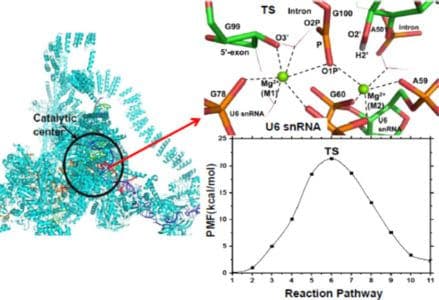
David Beratan’s unique style of doing science has had a broad and deep impact on chemistry, biochemistry, and biophysics. He has developed theories with an eye toward influencing the design and interpretation of key experiments, and his impact has been tremendous. David’s insights and predictive models have opened up entirely new research directions to experimental inquiry: tunneling pathways, inverse molecular design, optimization of polarizability response through ground-state polarization, flickering resonance, and chiral imprinting are all examples of concepts that he has pioneered that have guided experimental designs and advances for decades. ***
First Accounts
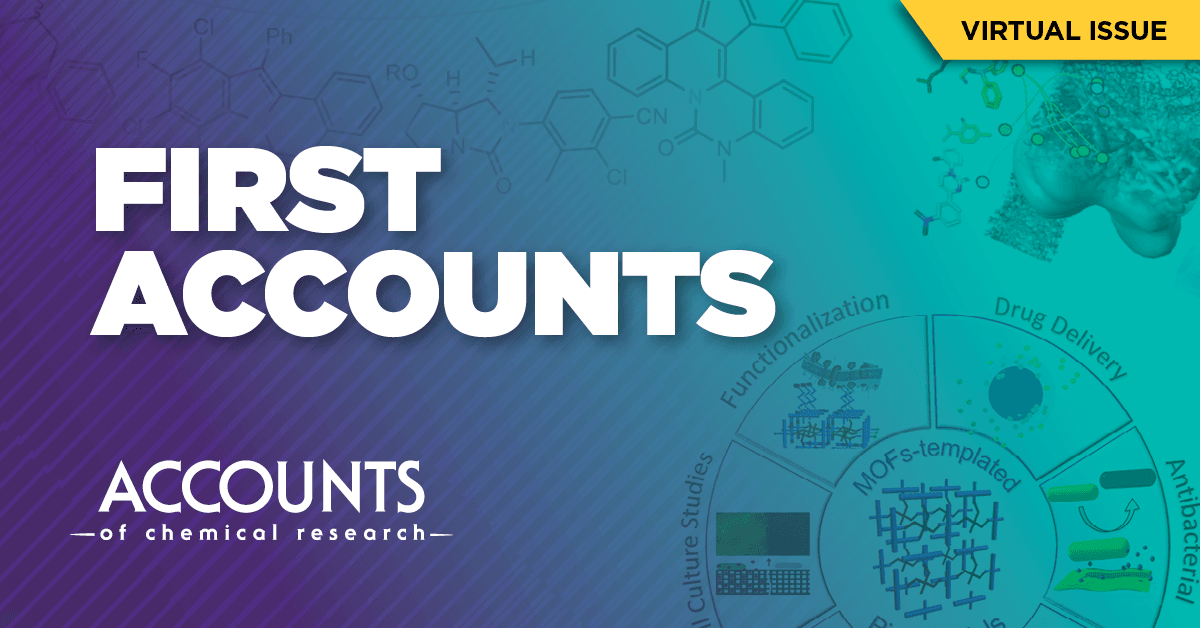
Early-career scientists have some of the freshest ideas and are instrumental in pushing the frontiers of chemistry and related disciplines. Recognizing this, we have initiated the first in an annual series of virtual issues highlighting the publications in Accounts of Chemical Research over the past year that are authored by early-stage scientists: First Accounts. In addition to featuring early career researchers, each Account in this collection is the first article the corresponding author has published in Accounts of Chemical Research as a principal investigator.
First Accounts are also first-hand accounts—our junior faculty and newest researchers in industry and institutes are the most engaged in experimental design and execution in the laboratory, and we see this reflected in the writing from younger authors. In most cases, they have staked their careers on the success of the research program described in their Account, and justifiably, that passion for molecular design, mechanistic inquiry, and structural evidence comes through in their writing. ***
Sustainability
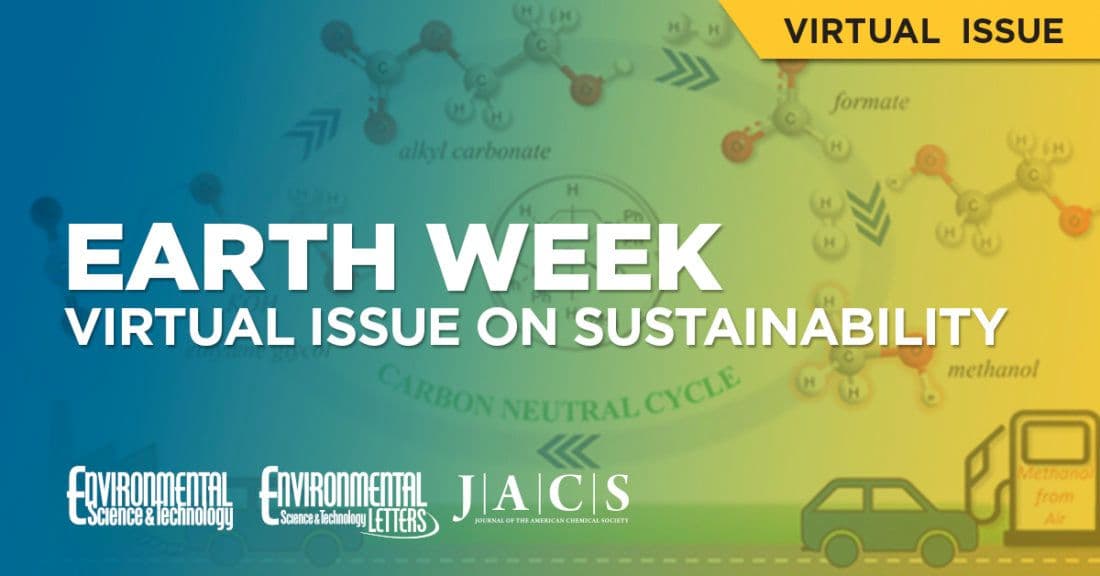
To promote the positive role that chemistry plays in the world, ACS established the Chemists Celebrate Earth Week (CCEW) which will occur April 19-25, 2020. This year’s theme is “Protecting Our Planet through Chemistry”, with a focus on sustainability. ***
Complex Organic Molecules in Star-Forming Regions
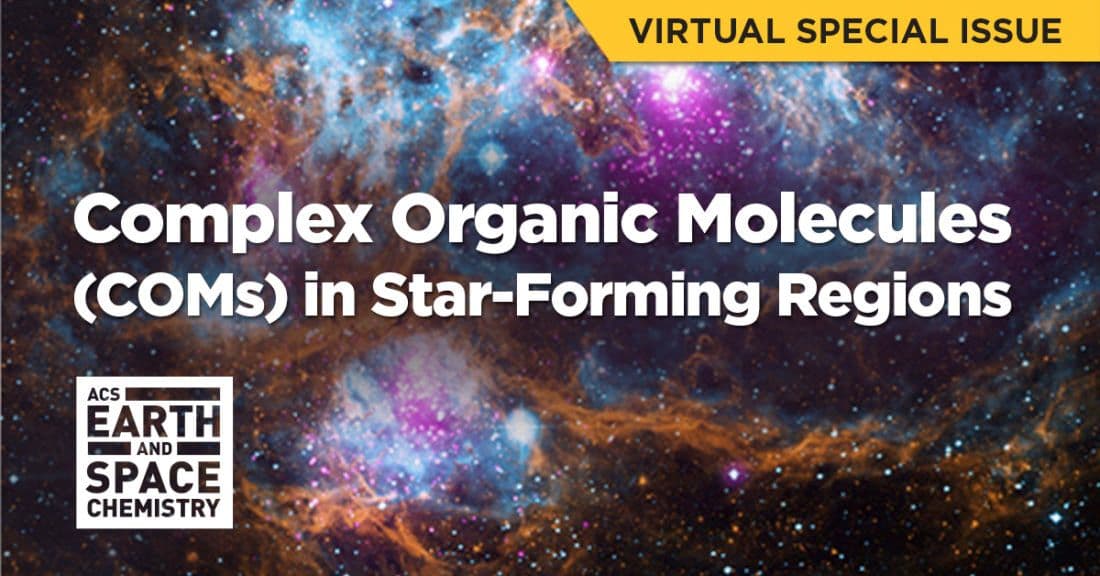
This Virtual Special Issue is concerned mainly with a class of interstellar molecules that strongly resemble organic molecules present in the terrestrial organic laboratory. These molecules, known as “complex organic molecules”, a term abbreviated either as COMs or iCOMs, the “I” standing for “interstellar” since these molecules, containing from 6-13 atoms, are hardly complex when compared with the much larger molecules found on Earth. The COMs, which include simple alcohols, esters, nitriles, and ethers, have been observed extensively by radio astronomy. The wealth of material in this Virtual Special Issue concerning interstellar complex organic molecules should provide the reader with a comprehensive introduction to this burgeoning area of astrochemistry. If the 50-year history of astrochemistry is any guide, however, research in the future is likely to change some of the conclusions reached here. Nevertheless, the future work will be based on the solid foundation reported. ***
New Advances in Organic Aerosol Chemistry
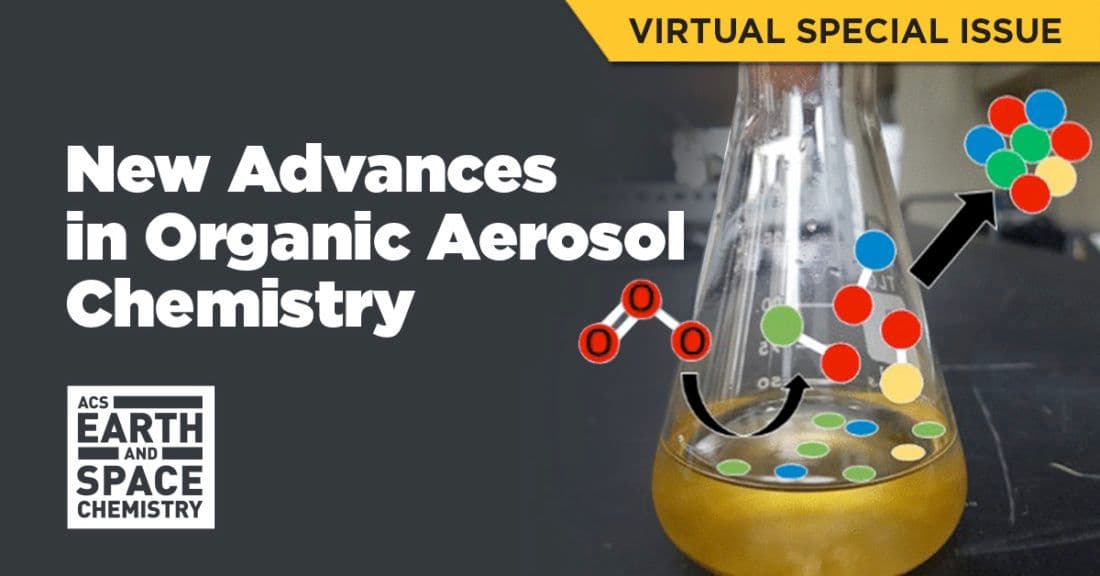
This virtual issue is a collection of exciting new advances in organic aerosol chemistry. The manuscripts fall into four broad and interconnected categories: (1) novel insights into secondary organic aerosol (SOA) formation, (2) the impact of organics on aerosol physical properties relevant for climate, (3) organics and the aerosol-cloud life cycle, and (4) field observations of organic aerosols and their transformations. Collectively, the manuscripts in this virtual issue represent the next generation of ideas and techniques in this field. Further research, enabled by recent advances in aerosol technology and collaborative and inclusive research culture, will be needed to tackle the urgent challenges in global air pollution and climate that we face today. ***
Area Selective Deposition: From Materials Chemistry to Nanofabrication

Right around 2014, as the minimum feature size of electronic devices approached 10 nm, nanofabrication needed a break-through technology to enable precise fabrication in 3D structures within the few nanometer scale. Area selective atomic layer deposition (AS-ALD) was recognized as having many advantages for this challenge because it is a bottom-up patterning approach with high conformality in 3D structures. The purpose of this virtual issue is to compile some of the recent, scientifically innovative papers in AS-ALD research published in Chemistry of Materials and other ACS journals for readers who are interested in this research field. Although the papers in this issue are focused on those published recently, we also include a few older published papers to provide some context about the main research history. ***
20th Anniversary of Aggregation-Induced Emission
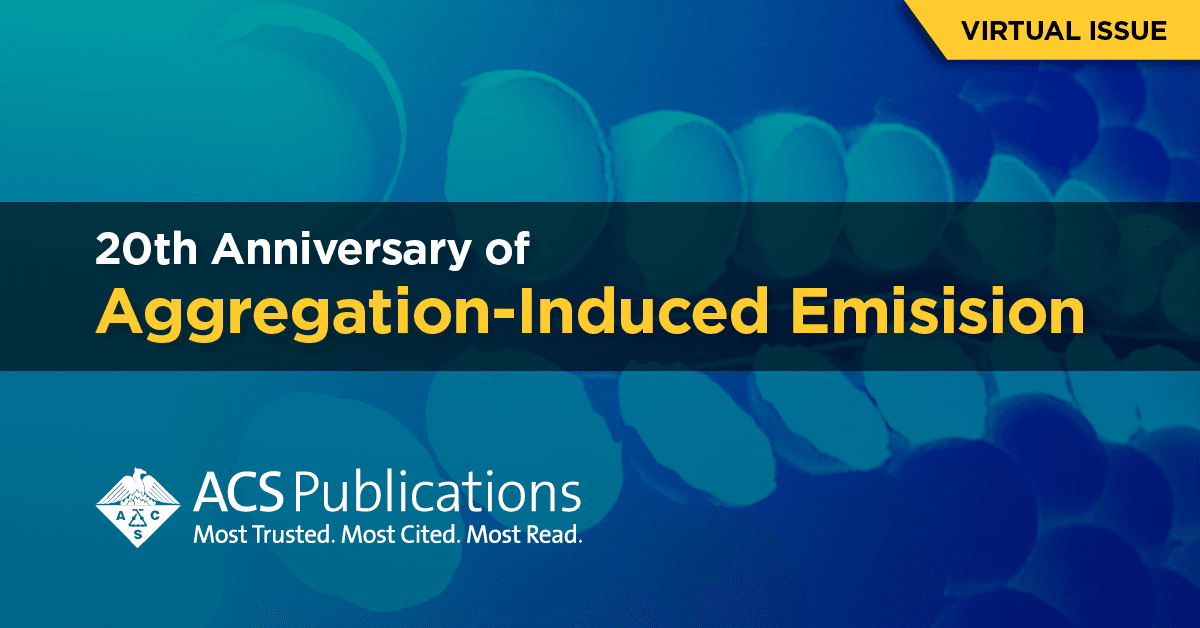
2020 marks the 20th anniversary of the concept of aggregation-induced emission (AIE). Since the concept was first coined in 2001, it changes the way people think about chromophore aggregation and provides a broad platform for the design and development of new luminescent materials in practically useful solid state. AIE and the related interdisciplinary research have greatly promoted the continuous innovation and rapid development of chemistry, materials and medicine, which lay an important physical and theoretical foundation for related fields with substantial global impact. The collection of 30 recently published articles from these ACS journals highlights the dynamic and vibrant AIE research. This Virtual Issue will serve as valuable resources for both well-established and early career researchers to learn more about AIE.
Remembering the Contributions and Life of Professor Joel Bernstein
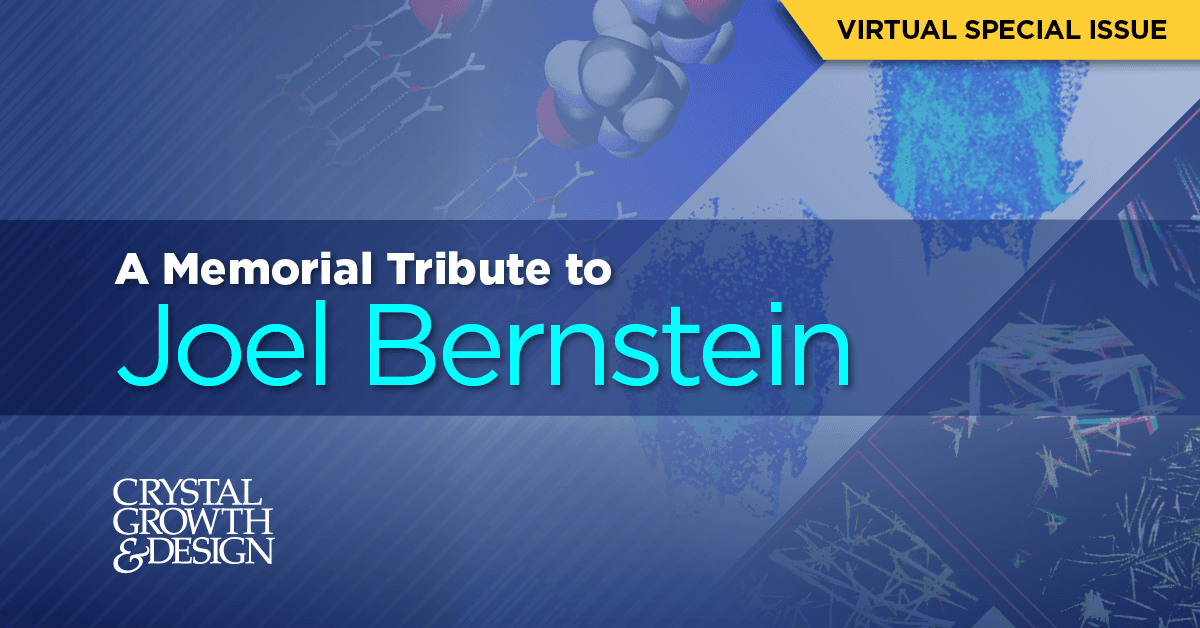
Professor Joel Bernstein (1941–2019) inspired many of us with his insatiable enthusiasm for science and teaching and his passion for the organic solid state. Joel will be remembered for his humanity, compassion, wisdom, scientific depth and breadth, and an unsurpassed passion for history, especially when interwoven with science. He was, truly, polymorphic. This Virtual Special Issue of Crystal Growth & Design is intended to celebrate and commemorate his contributions to the field. ***
Melbourne – Australia’s Science City

Melbourne is Australia’s second largest city and fastest growing metropolis with around 4.5 million inhabitants. It is also the Australian biomedical and materials science hub. This virtual issue of ACS Nano celebrates recent research in nanoscience and nanotechnology emanating from various institutes within the city of Melbourne: University of Melbourne, Monash University, RMIT University, Swinburne University, the Melbourne Centre for Nanofabrication, and CSIRO. ***
Toward Chemistry in Real Space and Real Time
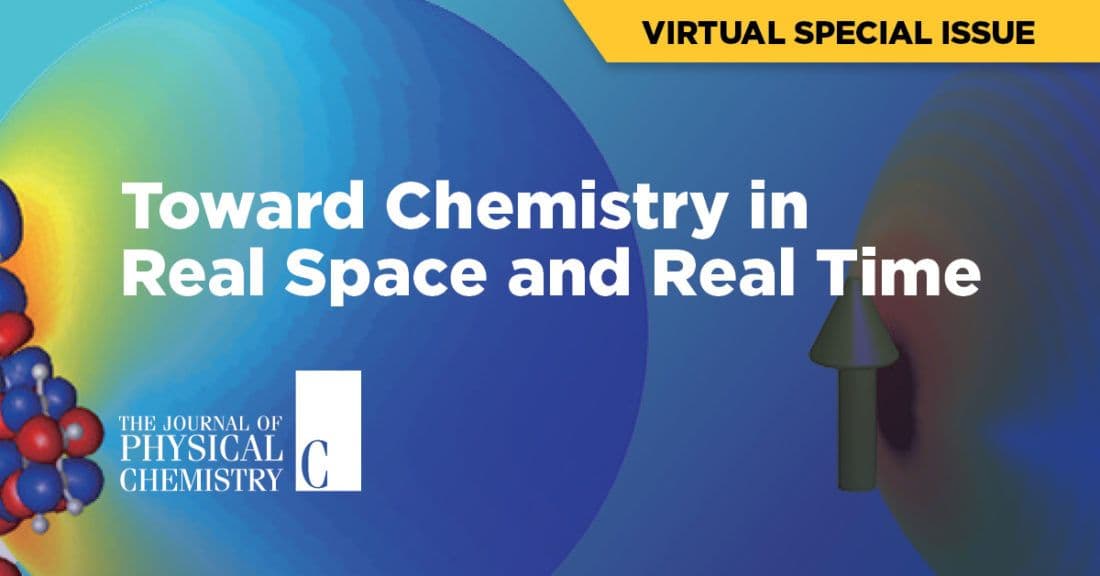
This Virtual Special Issue bears the title of the symposium held during the National Meeting of the American Chemical Society Fall 2019 National Meeting in San Diego, CA, marking the sunset of the eponymous Center for Chemistry at the Space-Time Limit. This National Science Foundation (NSF) Center for Chemical Innovation was founded with the vision to capture motions of individual molecules in real space and time, ultimately, to reach the joint Å-fs scale resolution necessary to visualize chemistry in the act. This VSI serves a collection of manuscripts by participants that capture the topics covered at the CaSTL sunset symposium. ***
Giants in Sensing: A Virtual Issue to Celebrate Five Years of ACS Sensors

As ACS Sensors celebrates its first five years of publication, we want to take this opportunity to honor people who have been central in shaping the field. To most scientists, chemical and biological sensing is a thoroughly modern discipline. It is unashamedly interdisciplinary, marrying fundamental insights and the foundations of analytical chemistry, state of the art materials science, bioengineering, electrochemistry, optics, biology, clinical and environmental chemistry. It addresses important measurement science challenges that face us today. This is what motivates many of us to contribute to this important field. Together with Analytical Chemistry and the Journal of the American Chemical Society , we present a virtual issue on Giants in Sensing featuring some fifty articles from influential sensing researchers who have contributed to any of these journals in the past five years. Please go through the list, read these excellent articles, and be sure to remember their names and those that came before when you write your next publication. It is humbling to know that we are all standing on the shoulders of giants. ***
Natural Products: Isolation, Total Synthesis, Structure-Activity Relationships, and More

Chemists are known for their ability to design and create molecules and materials—it is at the heart of what we do. Many of our ideas originate with the ultimate molecular designer and synthetic engineer, Nature, which has found an elegant way over time to create the necessary molecules of life or ones that participate in life cycles. Much of the new chemistry involving these natural products ends up on the pages of Organic Letters and The Journal of Organic Chemistry each year, pieced together through total synthesis to guide the way toward developing new and improved medicines, agricultural chemicals, biocatalysts, and more.
In this Virtual Issue, we feature 40 leading articles on natural products chemistry, selected by Organic Letters Editor-in-Chief Erick M. Carreira and The Journal of Organic Chemistry Editor-in-Chief Scott J. Miller from among the more than 250 articles on the topic published in the ACS core organic journals during 2019. ***
Quantum Dots and their Applications: What Lies Ahead?

It has been many years since the first works on the reduced dimensionality of semiconductors, which led to the concept of ‘artificial atoms’, or quantum dots (QDs). These semiconductor nanocrystals, with nanometer-sized diameters, exhibit quantum size effects in their optical and electronic properties. In particular, tunable and efficient photoluminescence (PL), with narrow emission and photochemical stability, as well as core-shell structures are commonly achieved today for many quantum dot materials systems. As a consequence, quantum dots have been incorporated as active elements in a wide variety of devices and applications, such as light-emitting diodes and display applications, photovoltaics, photoconductors and photodetectors, biomedical and environmental applications and catalysis applications. Many of these applications are now commercially-available and incorporated into our daily life, such as the case of quantum-dot-based displays. Despite being now part of mature technologies, quantum dot synthesis, characterization, and applications still constitute a highly active field of investigation. In light of various new development in applications of quantum dots, it is our pleasure to announce a “virtual issue” on quantum dots and their applications for ACS Applied Nano Materials . ***
Laboratory Learning
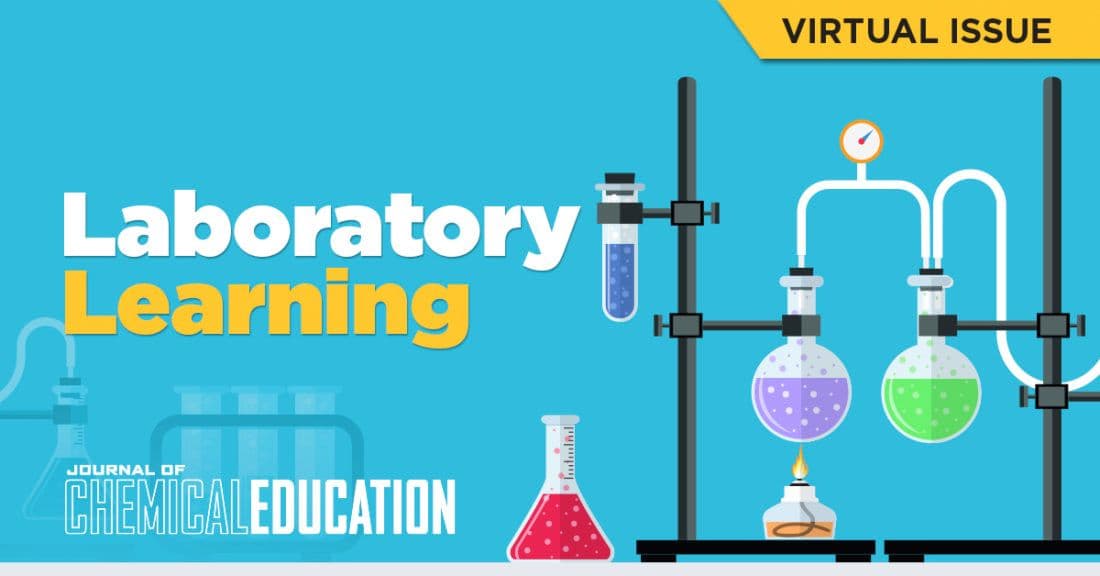
The Journal of Chemical Education has published many widely cited articles about learning in the chemistry laboratory. Laboratory teaching continues to evolve and face new challenges in today’s world. To help share the broad approaches to laboratory education, the journal has provided a collective resource of articles on laboratory learning and understanding, inquiry methods, student preparedness, assessing the lab, and faculty goals and professional development for laboratory teaching. We hope your find these articles as a useful resource increasing your knowledge in laboratory learning. ***
Challenges and Opportunities in Designing Perovskite Nanocrystal Heterostructures

Since the first report of CsPbBr3 nanocrystal synthesis by the hot-injection five years ago, we have seen phenomenal growth in research efforts to understand the photodynamics, luminescent properties, and stabilization of different phases of perovskite materials. We envision the possibility of designing perovskite nanocrystal heterostructures in combinations with other perovskites, metal oxides and chalcogenides, and precious metals and 2D materials. This virtual issue highlights some of the key findings published in ACS Applied Materials and Interfaces, ACS Energy Letters, ACS Nano, Chemistry of Materials, Journal of American Chemical Society, Nano Letters, and Journal of Physical Chemistry C . ***
International Symposium on Molecular Spectroscopy
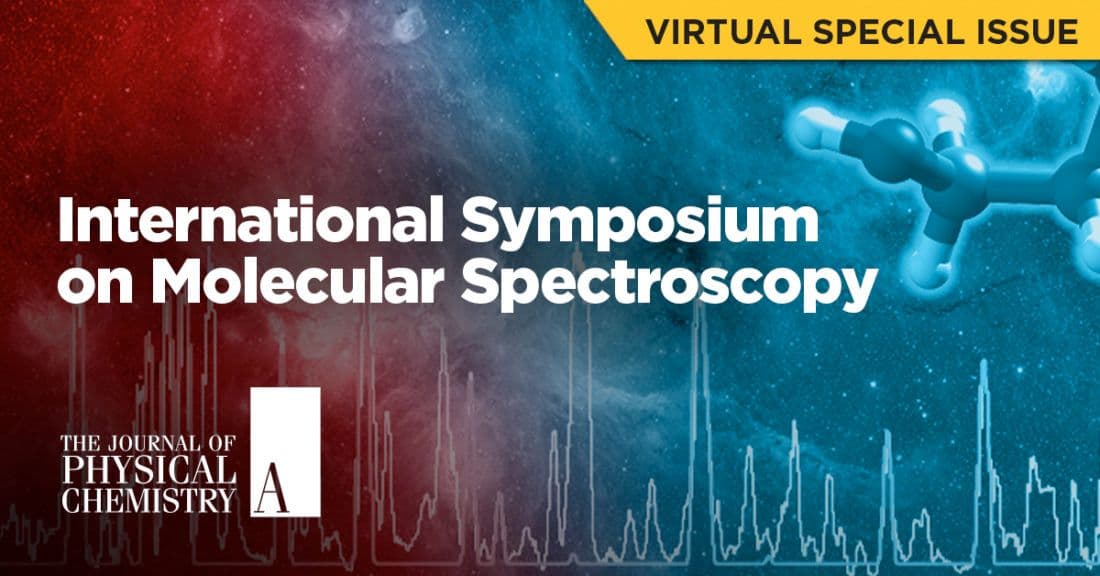
The collection of papers in this virtual special issue of the Journal of Physical Chemistry A are representative of the work disseminated over the last decade at the International Symposium on Molecular Spectroscopy (ISMS), which is on the verge of its 75th anniversary. The ISMS was founded in 1946 and was held on campus at The Ohio State University for 68 consecutive years, where after it moved to the University of Illinois Urbana-Champaign. Historically, the emphasis of the ISMS has been the characterization of the structure, dynamics, and spectroscopy of molecular systems, including complexes and clusters. The fundamental spectroscopic techniques developed by the participants of ISMS have been applied over the years to an ever more precise understanding of the chemistry and physics of aqueous environments, combustion, the interstellar medium, and planetary atmospheres, to name a few of the more popular areas of discussion at the symposium. This research, in both the gas and condensed phases, spans the subject areas of JPC A . ***
3D Printing of Polymers

The distributive manufacturing enabled by 3D printing has been on display in the response to shortages in critical medical resources for the response to the COVID-19 epidemic. In almost all cases, these 3D printed parts have been polymers and have been instrumental in providing a stopgap to logistical challenges in obtaining critical components. These have included, amongst many other examples, engineered solutions to limited number of ventilators through 3D printing of valves for ventilators, parts to transform snorkeling masks into continuous positive airway pressure (CPAP) devices, and repurposing of existing medical equipment to meet demands for treating patients. The timely delivery of these 3D printed plastic components has been enabled by the advances in 3D printing over the past decades. In light of their acute significance in this global health crisis, it is our pleasure to announce a “virtual issue” on the 3D printing of polymers for ACS Applied Polymer Materials .
New Tools and Methods in Physical Chemistry Research

This spring marks the second anniversary of the introduction of a section in The Journal of Physical Chemistry A highlighting work in the development of New Tools and Methods in Experiment and Theory. Work published in this section of J. Phys. Chem. A spans the full scope of physical chemistry research that is published in the three parts of the Journal. In the two years since this section was introduced, we have published more than 200 articles. In this collection of twenty-five articles, we highlight representative examples of the exciting work in the development of new tools and methods, which has been published in The Journal over the past two years. ***
Recent Highlights on Interfaces from China

This Langmuir virtual issue contains a collection of carefully selected articles which showcase very recent studies on interfaces from China. The authors with science and engineering backgrounds are from national and state key laboratories, academic institutes as well as universities located at various parts of China. We hope that you’ll enjoy reading this sample collection of Langmuir publications for the recent exciting work on nanomaterials and interfaces authored by Chinese scientists! ***
Virus Detection
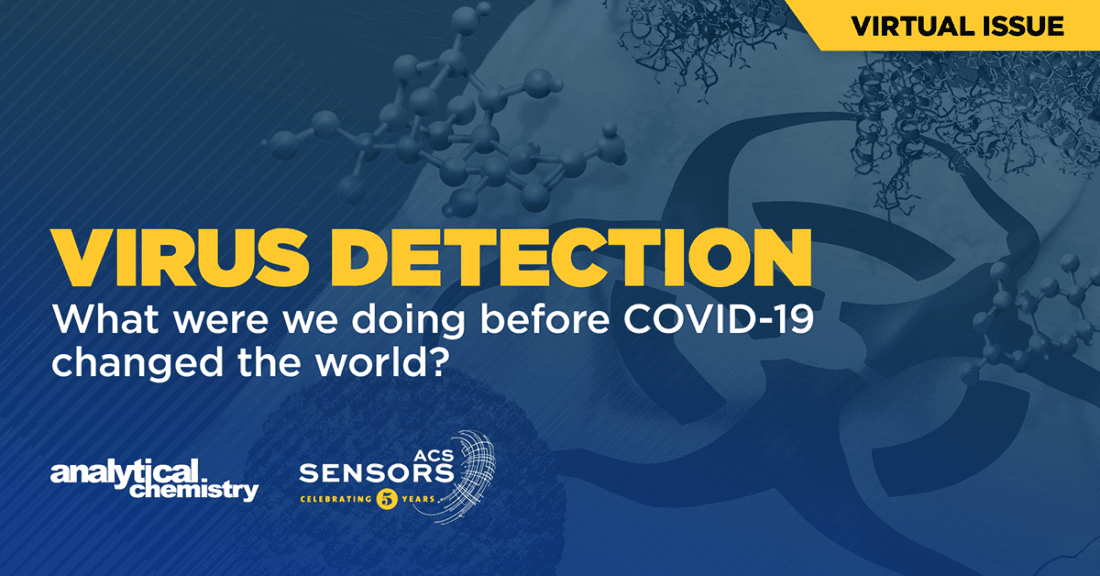
In this virtual issue, we highlight 23 papers centered on the development of molecular tests for viruses. The type of work these researchers were doing was no less important then, than it is now. Current events have just brought the importance of their work into focus. We feel the papers in this virtual issue serve as a benchmark for the types of innovation the journals Analytical Chemistry and ACS Sensors are looking for. The papers we selected are just a subset of the many wonderful, innovative papers on infection detection we have published and represent the incredible work being done around the globe in detection science that will help keep us safe. When we read the papers, they give us hope that we will be far better equipped to deal with any future potential pandemics. We thank these scientists for their research. ***
A New Era of Metal-Organic Framework Nanomaterials and Applications
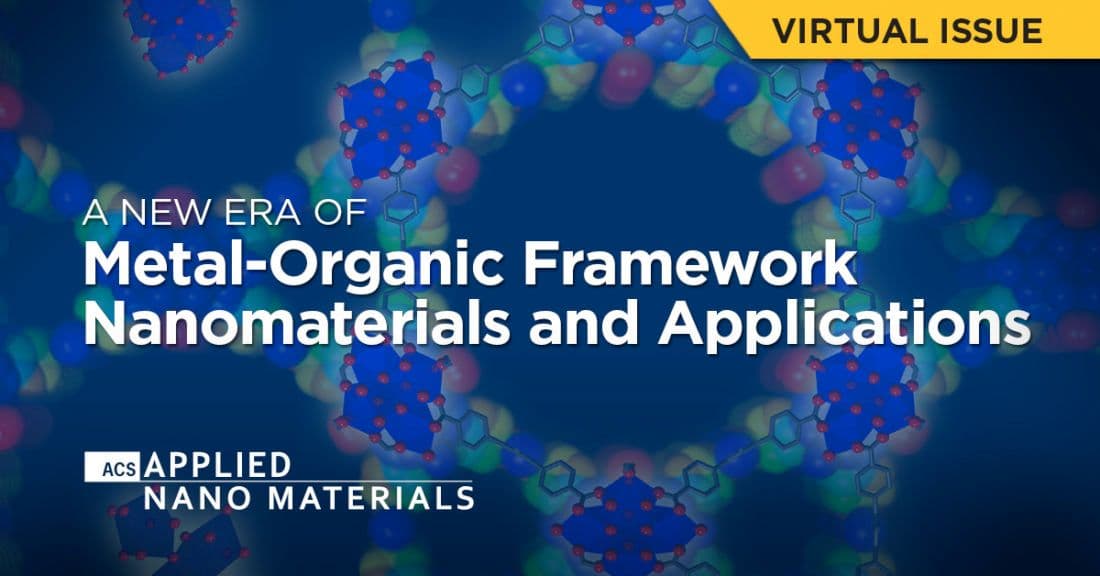
Want the latest stories delivered to your inbox each month?
232 Chemistry Research Topics To Make Your Neurochemicals Dance

Speaking from experience, science can be fun. The only thing that matters is that you should always choose the theme/field that fascinates you the most. Chemistry, if done right, can give you more dopamine rush than riding a racing bike. The trick is to choose a chemistry research paper topic that moves your quarks when you’re writing about it.
Table of Contents
Chemistry Research Topics: Biochemistry, Chemical, Organic, and more
Our chemistry research writers are not regular researchers but people who actually study and love chemistry. They have spent a lot of time unearthing some of the cool topics that could pump any chemistry geeks with an adrenaline rush. They have years of experience offering chemistry research paper writing services, so you can trust their work. (Many people around the world already do and you can find that in testimonials on our PhD Research Paper Writing Services page.)
Physical chemistry research topics
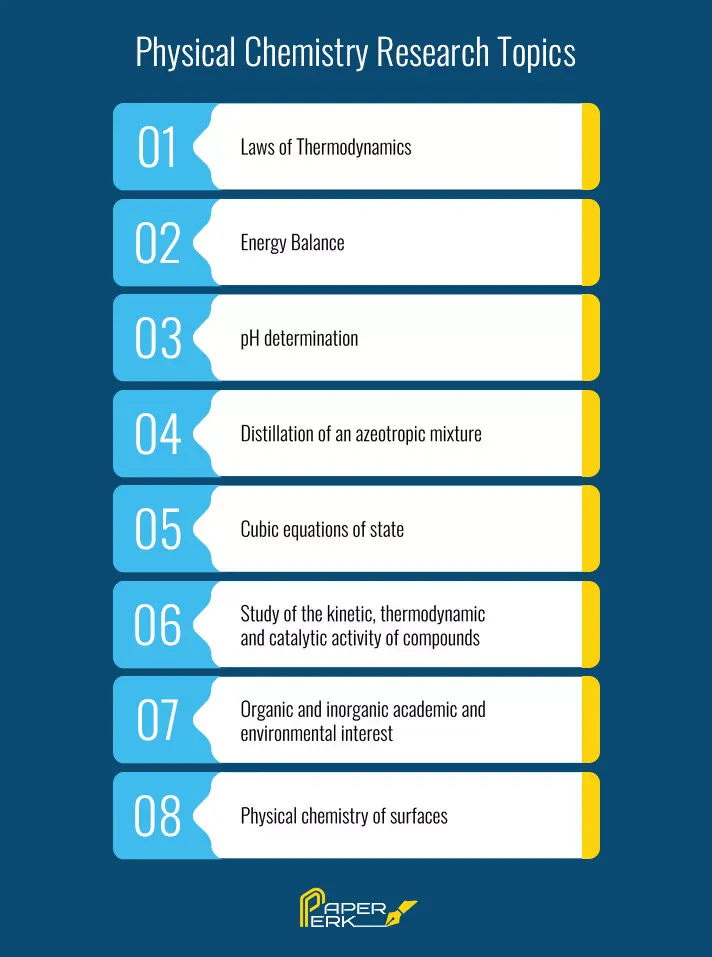
- Laws of Thermodynamics
- Energy Balance
- Gases: Gas Law
- harles and Gay Lussac’s law
- General Ideal Gas Law
- The mass of a chemical compound
- The moles of an atomic species
- The flow of Fluids in Closed Ducts
- Impact of gravity on the fluids
- Strength effect of elasticity of fluid actions
- Surface tension in fluids
- Statistical Analysis Of Thermodynamic Properties
- Determination of the ideal gas constant
- pH determination
- Distillation of an azeotropic mixture
- Cubic equations of state
- Redox titrations
- Ideal solutions (liquids)
- Laboratory on the States of Matter
- Laboratory on the construction of an atom
- Research on molecular geometry
- Research on the density of bodies
- Kinetic studies of pyrolysis, combustion and gasification of various materials (organic and inorganic)
- Physicochemical Processes of Interaction of Metals with Biomaterials
- Photochemistry of Compounds of Environmental Interest
- Study of the kinetic, thermodynamic and catalytic activity of compounds
- Organic and inorganic academic and environmental interest
- Determination of heat of combustion of acetamidophenols
- Experimental determination of thermochemical properties of chemical compounds
- Experimental evaluation of thermal properties of dangerous organic liquids
- Synthesis and characterization of hydrogels based on acrylic acid
- Incorporation of salts and other chemical substances in acrylic acid/acrylamide hydrogels
- Physical chemistry of polymers and macromolecules
- Pharmaceutical physical chemistry
- Physical chemistry and material sciences
- Biomimetic chemistry
- Petrochemical and related sciences
- Physical chemistry of semiconductors
- Physical chemistry of extractive processes
- Physical chemistry of surfaces
We bet these chemistry essay topics have blown you away. Don’t worry we have more useful topics coming your way.
Read More: Accounting Research Topics
Electrochemistry research topics
Below are some of the best topics for research paper about chemistry and its affiliate subjects. Check them out:
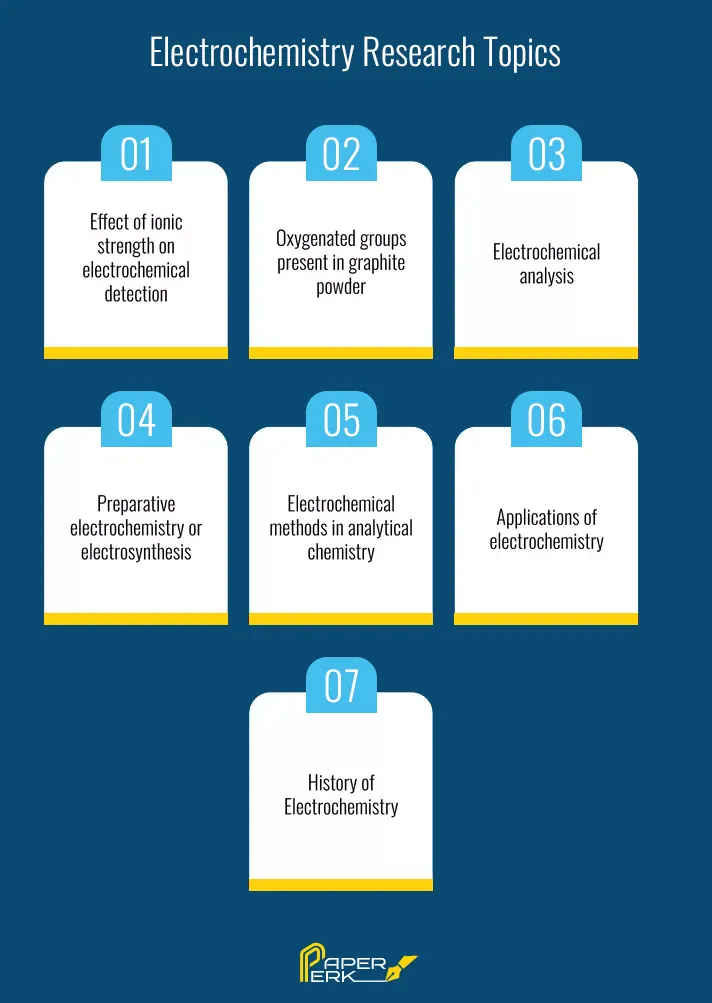
- Calibration of carbon paste electrodes modified with iron particles
- Effect of ionic strength on electrochemical detection
- Oxygenated groups present in graphite powder
- Electrochemical analysis
- Potentiometric titrations of functional groups
- Physical and chemical characterization of the modified and unmodified material
- Electrochemical recovery of toxic metals
- Carbon paste electrodes
- Biological and bioelectrochemical reactors with an optimization approach based on computational methods
- Electrogeneration of oxidizing species
- Electroremediation of contaminated water and water soils
- Electrochemistry: Importance in Robotics and Nanotechnology
- Electrochemistry in Ecology and Environmental Processes
- How electrochemistry plays an important role in energy generation
- Photovoltaic cells and hybrid energy systems
- Nanostructured materials for fuel cells
- Solar Systems and Electrochemistry
- Biomolecular interactions and electroanalysis
- Chemical and electrochemical methods in disease diagnosis
- Synthesis and Electrochemical Properties of Hexacyanoferrate-Doped Polypyrrole
- Energy Storage in Hybrid Organic-Inorganic Materials
- Conducting Organic Polymers with Electroactive Dopants
- Electrochemistry for bioprocess engineering applications
- Electrochemical enhancement of microbial product formation
- Electron transfer of electrode-bound enzymes
- Transport mechanism and interfacial reactions within the oxide layer
- Oxide layer modelling
- Preparative electrochemistry or electrosynthesis
- Electrochemical methods in analytical chemistry
- Electrochemical synthesis methods
- Fuel cell technology in Technical Chemistry
- Electrochemical reactions
- Phase boundary electrode-electrolyte
- Phase boundary between an electronic conductor (electrode) and an ionic conductor (electrolyte)
- Applications of electrochemistry
- Reduction of metal salts for the production of base metals, mainly by electrolysis
- Use of electrolytic metal deposition in electroplating
- Provision of an electrical voltage, especially for mobile applications
- History of Electrochemistry
We know your chemistry research projects are incomplete without these eyecatching topics. Read them and wisely write on these subject to amaze your professor.
Read More: Business Research Topics
Organic Chemistry research topics
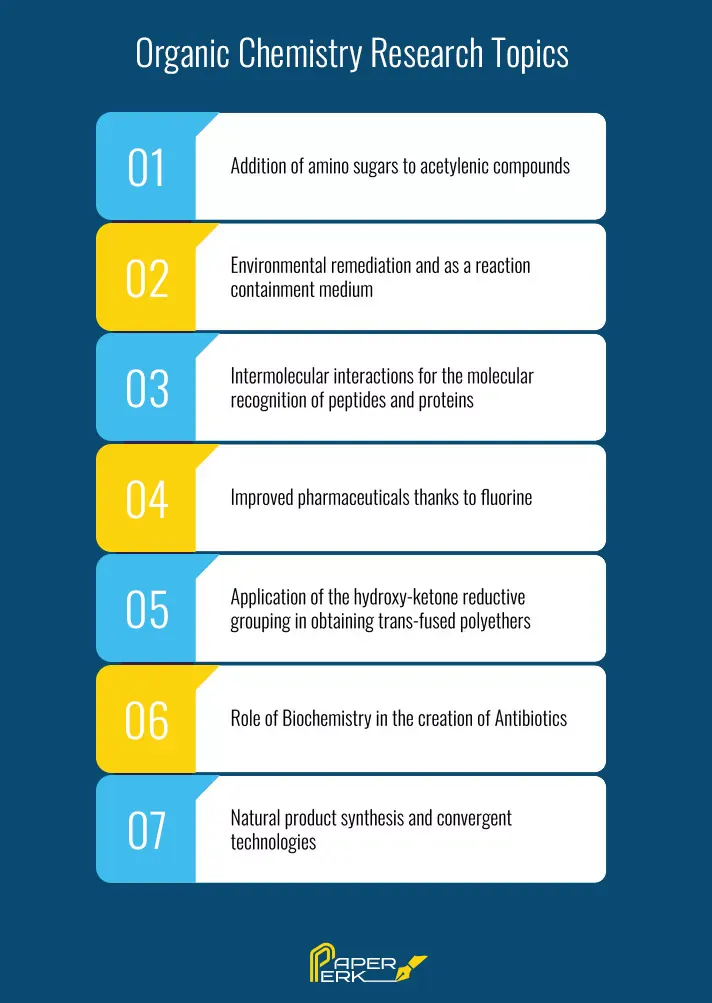
- A novel process for the production of sophisticated molecules
- Addition of amino sugars to acetylenic compounds
- Environmental remediation and as a reaction containment medium
- Intermolecular interactions for the molecular recognition of peptides and proteins
- Synthesis of glycosylamines from disaccharides and lipooligosaccharides
- Catalysis with metal and organocatalysts, photocatalysis, natural product synthesis, unnatural amino acids and peptide foldamers
- Development and modification of gels based on polymers for use in drug delivery
- Reusable catalyst makes oxidation of CH bonds with oxygen easier and more efficient
- Structural analysis of nodulation factors produced by bacteria of the genus Rhizobium
- Imidazopyridines as new materials
- Effects of Ultra-Violet Light on Activation of Oxygen
- Synthesis of large unsymmetrical imines by a palladium-catalyzed cross-coupling reaction
- Improved pharmaceuticals thanks to fluorine
- Application of the hydroxy-ketone reductive grouping in obtaining trans-fused polyethers
- Role of Biochemistry in the creation of Antibiotics
- Application of the olefin metathesis (RCM) reaction in the synthesis of Orthocondensated polyoxepanes
- Sugars in green olives
- Synthetic applications of d-glucose derivatives
- Synthesis, structure, coordination and applications in asymmetric catalysis
- Natural product synthesis and convergent technologies
- Activation of growth factors for fibroblasts by glycosaminoglycans effect
- Thiols, preparation and handling
- Biotransformations of industrial interest catalyzed by fungal peroxygenases
- Carbohydrate multivalent systems functionalize proteins and surfaces
- Fused n-heterocyclic carbenes in biaryl systems
- Hair structure
- Biochemistry for bioremediation
- Chemical and structural characterization of lignin and lipids of lignocellulosic materials of industrial interest
- Physicochemical characterization of citronella, soapstone, and eucalyptus essential oil
- Electrophilic Substitution Reactions: Synthesis of Nitrobenzene
- Essential oils: uses and properties
- Activation of growth factors for fibroblasts by glycosaminoglycans
Read More: Finance Research Topics
Inorganic Chemistry research topics
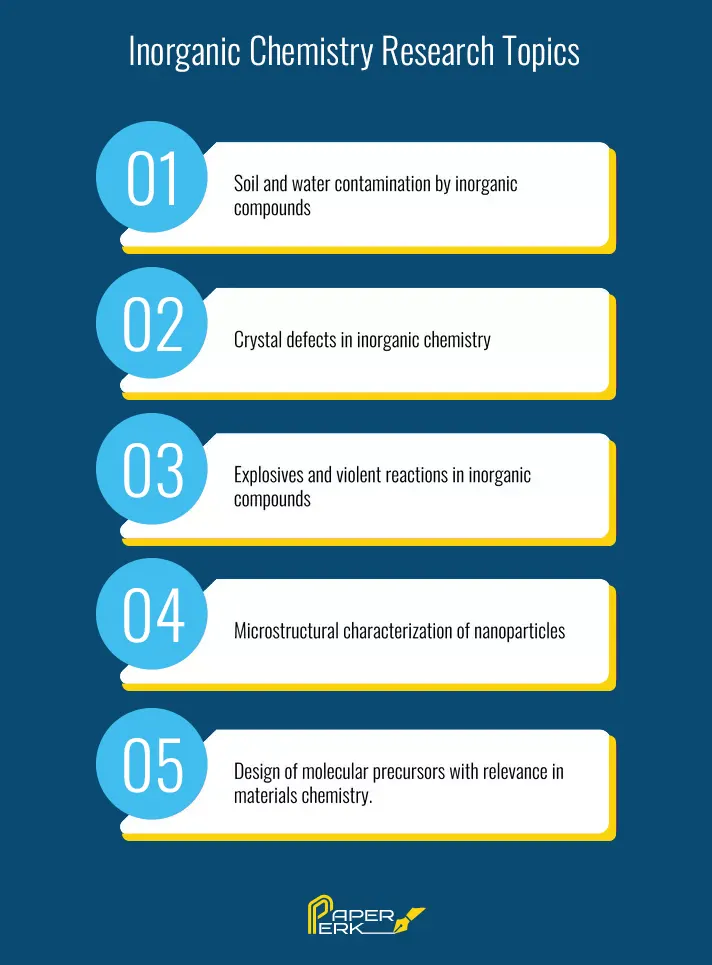
- Soil and water contamination by inorganic compounds
- Synthesis and characterization of Coordination Compounds and their use as homogeneous catalysts
- Free Radicals and Antioxidants
- Analytical Chemistry associated with the study of inorganic compounds
- Quantum molecular modeling and mechanics
- Inorganic Materials
- Hydrogen reactivity with inorganic compounds
- Bond theory analysis
- Chemistry of some transition elements
- Boric Acid Preparation
- Types of inorganic chemical reactions
- Introduction to inorganic chemistry
- Study of the atomic spectrum
- Crystal defects in inorganic chemistry
- Explosives and violent reactions in inorganic compounds
- Objective characterization of wines through aroma components
- Microstructural characterization of nanoparticles and magnetic “nano-composites” of iron
- Chemical, morphological, mineralogical, and genesis characters of the salt mines
- Physical and chemical characteristics of the soils occupied by olive groves
- Theoretical analysis and development of instrumentation to apply the new technique of thermal analysis at a constant rate of reaction
- Alteration of rocks and soil formation in Utah
- The catalytic activity of 4f metal oxides in the decomposition of various carboxylic acids and alcohols
- Activation of ethylene and carbon dioxide by molybdenum complexes
- Platinum promoting action on nickel catalysts supported on activated Bentonite
- Homogeneous catalysis (with an organometallic, transition metal, lanthanide and representative compounds)
- Methods of synthesis of organometallic compounds assisted by microwaves.
- Design of molecular precursors with relevance in materials chemistry.
- Chemistry of inorganic heterocycles.
- Immobilization of organometallic and coordination compounds in polypropylene membranes.
Read More: High School Research Topics
Biochemistry research topics
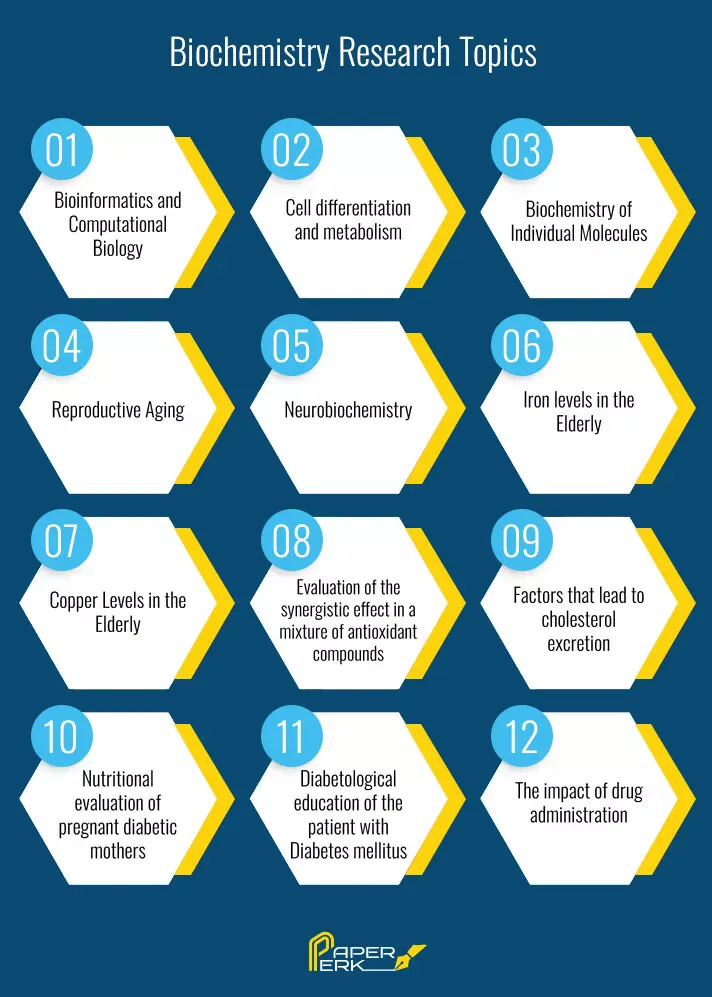
- Bioinformatics and Computational Biology
- Cell differentiation and metabolism
- Biochemistry of Individual Molecules
- Enterobacteriaceae envelopes: modulation of their structure in response to environmental cues and impact on pathogenicity
- Neuroplasticidad y Neurogenética
- Environmental biotechnology applied to water decontamination.
- Reproductive Aging
- Neurobiochemistry
- Regulatory proteins of iron metabolism
- Iron deficiency anaemia and cardiovascular disease
- Iron deficiency anaemia and oxidative stress
- Nutritional anaemias independent workers
- Food incompatibilities for iron absorption
- Evaluation of anaemia and iron deficiency in schoolchildren
- Iron deficiency anaemia and evaluation of school performance
- Iron deficiency anaemia in students of Educational Centers
- Copper Levels and Oxidative Stress in the Elderly
- Iron Levels and Oxidative Stress in the Elderly
- Evaluation of transcription factors (surgical samples)
- Biochemical markers in oxidative stress
- Antioxidant activity in irradiated food products
- Kinetics of the reactivity of antioxidants in food
- Evaluation of oxidative stress in various pathological states
- Iron levels in the Elderly
- Copper Levels in the Elderly
- Evaluation of the synergistic effect in a mixture of antioxidant compounds
- Antioxidant activity in medicinal plants
- Food patterns and evaluation of antioxidant capacity in food
- Markers in Diabetes mellitus and cardiovascular disease
- Biochemical markers in Diabetes mellitus
- Chemotherapy with redesigned Methotrexate
- The Biosynthesis of triglycerides or triacylglycerides
- Consequences of suffering from coronary disease
- What medications should be administered in patients with osteoporosis?
- Appearances of physiological alterations in older adults
- The impact of the administration of clindamycin, amikacin, and ceftazidime in hospitalized patients
- Pharmaceutical advice to reduce stress
- Dyslipidemia in Diabetes mellitus
- Diabetes mellitus and transcription factors (Cell culture)
- Factors that lead to cholesterol excretion
- Nutritional evaluation of pregnant diabetic mothers
- How do blood alcohol levels influence drivers involved in traffic accidents?
- Pleiotropic effects of oral hypoglycemic drugs
- Importance of eating foods rich in carotenoids
- The biochemical and toxicological impact of lead with environmental contact
- The importance of emotions in the intervention of our digestive system
- Lifestyles and Diabetes mellitus
- Adiposity in Diabetes mellitus
- Diabetological education of the patient with Diabetes mellitus
- The impact of drug administration
Read More: Nursing Research Topics
Nano / Nuclear Chemistry research topics
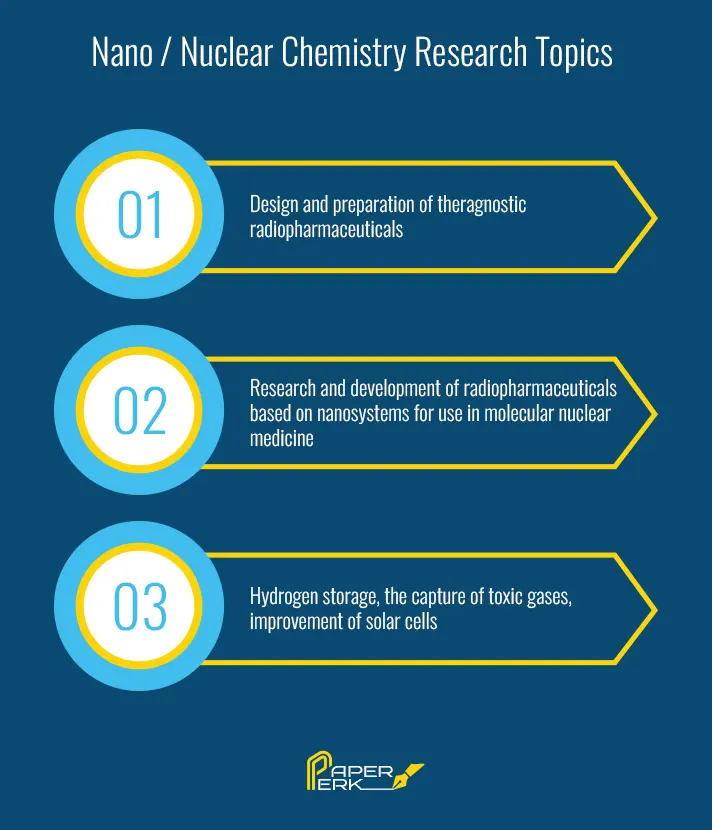
- Modeling of metallic nanostructures
- Modeling of nanostructures supported on oxides
- Development of advanced nanomaterials with specific
- Nanomaterials in the fight against cancer and spinal cord injuries in laboratory rats for neuronal reconnection
- Study of the effects of radiation on the structure and properties of nanomaterials
- Development of nanostructured substrates for Raman spectroscopy applications
- Implants in neural tissues of the spinal cord to promote lost communication between the brain and the rest of the body
- Design and preparation of theragnostic radiopharmaceuticals
- Research and development of radiopharmaceuticals based on nanosystems for use in molecular nuclear medicine
- Hydrogen storage, the capture of toxic gases, improvement of solar cells
- Geometric optimization of nanostructures using classical methods
- Calculation of energies and molecular properties
- Synthesis of supercapacitors with carbon nanotubes
- Simulation of high-resolution transmission electron microscopy images of nanostructures
- Development of bactericidal dressings based on metallic nanoparticles
- Modernization of the ININ X-Ray Diffraction Laboratory
- Thin coatings of transparent materials with high hardness
Read More: Psychology Research Paper Topics
Green Chemistry research topics
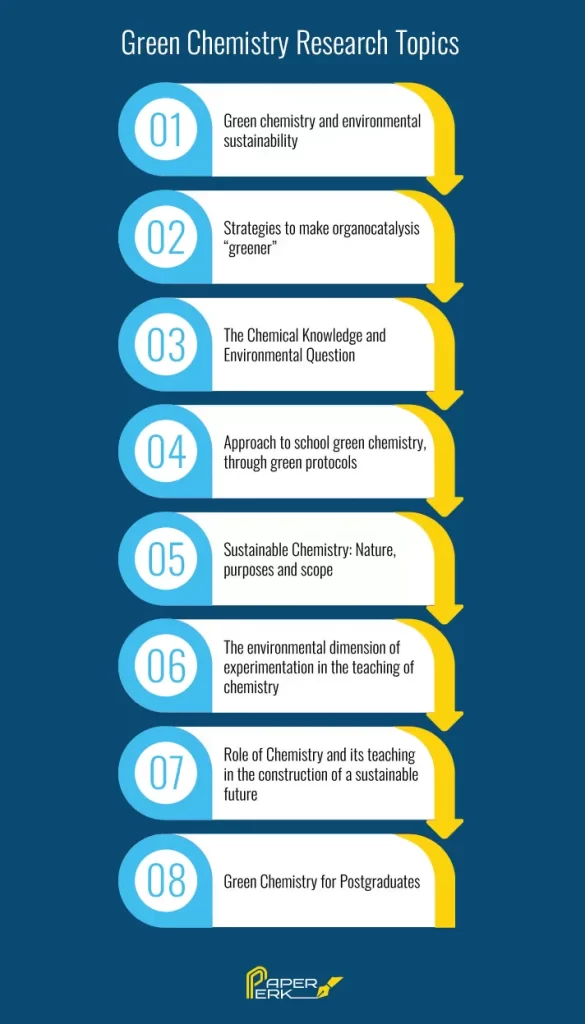
- Green chemistry and environmental sustainability
- Strategies to make organocatalysis “greener”
- The Chemical Knowledge and Environmental Question
- Approach to school green chemistry, through green protocols
- Sustainable Chemistry: Nature, purposes, and scope
- Postgraduate studies in sustainable chemistry
- Didactic knowledge of the content on green chemistry
- Photochemical synthesis by sunlight
- Green Chemistry: A Present and Future Theme for Chemistry Education
- The environmental dimension of experimentation in the teaching of chemistry
- Role of Chemistry and its teaching in the construction of a sustainable future
- A foundation for the incorporation of green chemistry in organic chemistry curricula
- Contribution of green chemistry to the construction of a socially responsible science
- Aspects of the pedagogical knowledge of the content of green chemistry in university professors of chemistry
- Asymmetric organocatalyzed reactions in the absence of a solvent
- Green Chemistry for Postgraduates
Read More: Social Work Research Topics
Archaeological Chemistry research topics
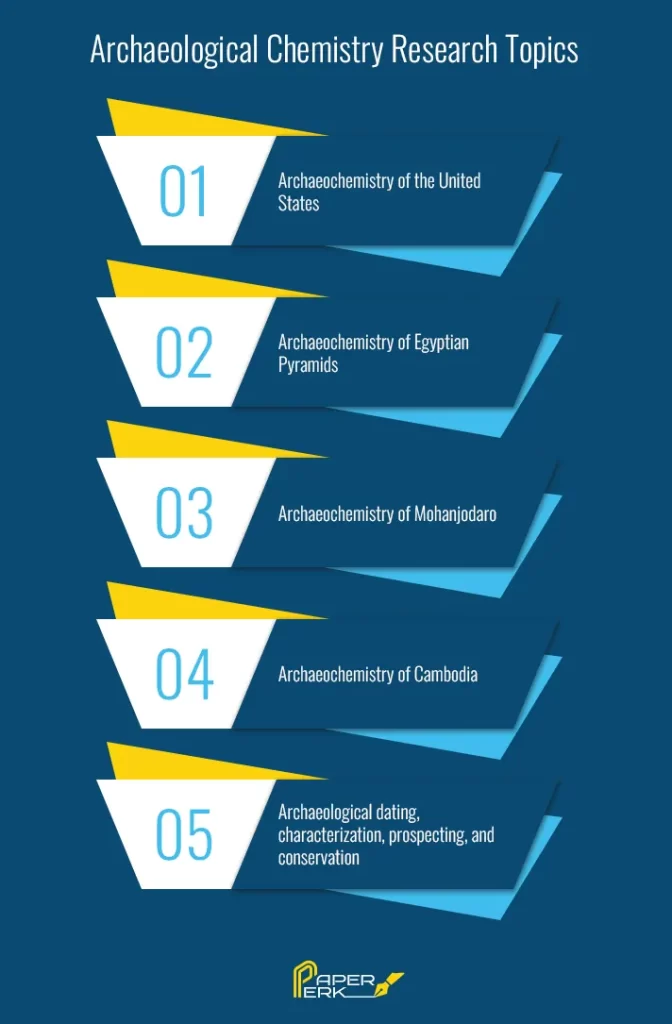
- Archaeochemistry of the United States
- Archaeochemistry of Egyptian Pyramids
- Archaeochemistry of Mohanjodaro
- Archaeochemistry of Cambodia
- Archaeological dating, characterization, prospecting, and conservation
- The role of bio-deteriorated ceramics in the formation processes of archaeological sites
- Study of biodeterioration in archaeological ceramics from Mayan Ruins
- Deterioration of ceramic fragments due to the action of lichens
- Applicability of preventive conservation to archaeological ceramics impacted by biodeterioration
Our highly skilled professionals have provided you with superb research topics in chemistry. You can choose anyone matching your speciality and start working on making your paper a piece of art.
Conclusion:
Never believe anyone who says you can’t go for a chemistry degree or PhD. Just listen to your heart and it will all make sense. Chemistry is one of the coolest subjects. If you do it right, with a chemistry research topic that inspires you, then no one can stop you from having your chemical breakthrough. Believe in yourself and the world will see your success like a mushroom cloud.
If you still have any confusion, or can’t find time to write a perfect chemistry paper, you can ping us through our contact page and get expert chemistry writing opinions from our writers . If you just want to get on with it and seek our services, you can place your order now .
Order Original Papers & Essays
Your First Custom Paper Sample is on Us!
Timely Deliveries
No Plagiarism & AI
100% Refund
Try Our Free Paper Writing Service
Related blogs.

Connections with Writers and support
Privacy and Confidentiality Guarantee
Average Quality Score
201+ Chemistry Project Topics [Updated]

Chemistry, often hailed as the “central science,” plays a pivotal role in understanding the world around us. From the composition of substances to the reactions that transform them, chemistry influences nearly every aspect of our lives. One fascinating way to delve deeper into this field is through chemistry projects. These projects offer a hands-on approach to learning, allowing students and enthusiasts alike to explore various concepts and phenomena. In this blog, we’ll journey through a diverse array of chemistry project topics, offering insights into each area’s significance and potential for exploration.
How To Select Relevant Chemistry Project Topics?
Table of Contents
Selecting relevant chemistry project topics requires careful consideration of several factors to ensure that the chosen topic aligns with your interests, goals, and resources. Here’s a step-by-step guide to help you select the most suitable chemistry project topic:
- Identify Your Interests: Consider your interests within the broad field of chemistry. Are you fascinated by organic synthesis, environmental chemistry, biochemistry, or another sub-discipline? Choosing a topic that aligns with your interests will keep you motivated throughout the project.
- Assess Your Knowledge and Skills: Evaluate your current knowledge and skills in chemistry. Choose a topic that challenges you without being too overwhelming. If you’re a beginner, opt for a project that allows you to build upon your existing knowledge while learning new concepts.
- Consider Available Resources: Take stock of the resources available to you, including laboratory equipment, chemicals, reference materials, and access to mentors or experts. Select a project that can be feasibly completed with the resources at your disposal.
- Review Literature and Current Trends: Conduct a literature review to explore recent advancements, emerging trends, and unresolved questions in your chosen area of interest. This will help you identify gaps in knowledge or areas where further research is needed, guiding your selection of a relevant project topic.
- Define Your Objectives and Goals: Clearly define your objectives and goals for the project. Determine what you aim to accomplish and what outcomes you hope to achieve. Your project topic should align with these objectives and contribute to fulfilling your academic or personal goals.
- Consult with Mentors or Advisors: Seek guidance from mentors, advisors, or faculty members who can provide insights and suggestions based on their expertise. Discuss potential project topics with them and solicit their feedback to ensure that your chosen topic is relevant and feasible.
- Brainstorm and Narrow Down Options: Brainstorm a list of potential project topics based on your interests, knowledge, resources, and goals. Narrow down your options by considering factors such as feasibility, novelty, and potential impact. Choose a topic that excites you and has the potential to make a meaningful contribution to the field of chemistry.
- Refine Your Topic and Formulate a Research Plan: Once you’ve selected a topic, refine it further by clearly defining your research question or hypothesis. Develop a research plan outlining the specific objectives, methods, and timeline for your project. Be prepared to adapt and refine your plan as you progress with your research.
By following these steps, you can select relevant chemistry project topics that align with your interests, goals, and resources, setting the stage for a successful and rewarding research experience.
201+ Chemistry Project Topics: Beginners To Advanced
Organic chemistry projects.
- Synthesis and characterization of aspirin.
- Extraction and analysis of caffeine from tea leaves.
- Isolation and identification of natural dyes from plants.
- Synthesis of biodiesel from vegetable oil.
- Investigating the acidity of fruit juices using titration.
- Synthesis of esters for fragrance applications.
- Preparation of soap from vegetable oils.
- Studying the effect of catalysts on organic reactions.
- Analysis of essential oils from aromatic plants.
- Synthesis and purification of acetaminophen.
- Investigating the properties of polymers.
- Extraction of DNA from fruits or vegetables.
- Synthesis of nylon-6,6.
- Investigating the effects of different solvents on crystallization.
- Studying the reactions of carbohydrates.
- Synthesis of biodegradable plastics.
- Analysis of food additives using chromatography.
- Investigating the process of fermentation.
- Synthesis and characterization of bioderived materials.
- Studying the properties of antioxidants in foods.
Inorganic Chemistry Projects
- Synthesis and characterization of metal oxides.
- Investigating the properties of transition metal complexes.
- Preparation of metal nanoparticles and their applications.
- Studying the formation and properties of zeolites.
- Synthesis of coordination compounds.
- Investigating the redox properties of metal ions.
- Preparation and characterization of metal alloys.
- Studying the properties of rare earth elements.
- Synthesis of metal-organic frameworks (MOFs).
- Investigating the catalytic properties of metal nanoparticles.
- Preparation and properties of superconductors.
- Synthesis of semiconductor materials.
- Investigating the properties of carbon allotropes (e.g., graphite, diamond).
- Preparation and characterization of magnetic materials.
- Studying the properties of chalcogenides.
- Synthesis of nanocomposites for catalytic applications.
- Investigating the properties of perovskite materials.
- Preparation and characterization of phosphors.
- Studying the properties of metal halides.
- Synthesis of metal carbonyl complexes.
Analytical Chemistry Projects
- Development of a method for heavy metal detection in water samples.
- Analysis of food preservatives using spectroscopic techniques.
- Determination of vitamin C content in fruit juices.
- Quantification of caffeine in beverages using chromatography.
- Development of a method for pesticide analysis in fruits and vegetables.
- Analysis of air pollutants using gas chromatography.
- Determination of pH in household products.
- Quantitative analysis of alcohol content in beverages.
- Development of a method for drug analysis in pharmaceutical formulations.
- Analysis of mineral content in water samples.
- Determination of total dissolved solids (TDS) in water samples.
- Quantification of sugar content in soft drinks.
- Development of a method for forensic analysis of trace evidence.
- Analysis of heavy metals in soil samples.
- Determination of acidity in vinegar samples.
- Quantitative analysis of proteins in biological samples.
- Development of a method for antioxidant analysis in food samples.
- Analysis of volatile organic compounds (VOCs) in indoor air.
- Determination of chlorophyll content in plant samples.
- Quantification of nicotine in tobacco products.
Physical Chemistry Projects
- Investigation of reaction kinetics using spectrophotometry.
- Study of gas laws through Boyle’s and Charles’s experiments.
- Determination of the heat of neutralization using calorimetry.
- Investigation of solubility equilibria using conductivity measurements.
- Study of colligative properties through freezing point depression.
- Determination of molecular weight using vapor pressure measurements.
- Investigation of electrochemical cells and their applications.
- Study of phase transitions using differential scanning calorimetry (DSC).
- Determination of rate constants using the method of initial rates.
- Investigation of adsorption phenomena using surface area measurements.
- Study of the behavior of ideal and non-ideal gases.
- Determination of activation energy using the Arrhenius equation.
- Investigation of chemical equilibria using Le Chatelier’s principle.
- Study of reaction mechanisms using isotopic labeling techniques.
- Determination of the heat capacity of solids using calorimetry.
- Investigation of diffusion and osmosis phenomena.
- Study of molecular spectroscopy using UV-Vis spectroscopy.
- Determination of reaction enthalpy using Hess’s law.
- Investigation of acid-base titrations and pH indicators.
- Study of reaction rates using temperature-dependent kinetics.
Biochemistry Projects
- Isolation and characterization of enzymes from biological sources.
- Study of enzyme kinetics using spectrophotometry.
- Investigation of metabolic pathways using biochemical assays.
- Study of protein structure and function using SDS-PAGE.
- Analysis of nucleic acids using gel electrophoresis.
- Investigation of cellular respiration using respirometry.
- Study of photosynthesis using chlorophyll fluorescence.
- Analysis of biomolecules using mass spectrometry.
- Investigation of DNA replication using PCR.
- Study of gene expression using reporter assays.
- Analysis of protein-protein interactions using co-immunoprecipitation.
- Investigation of membrane transport using permeability assays.
- Study of signal transduction pathways using ELISA.
- Analysis of enzyme inhibition using kinetic assays.
- Investigation of DNA damage using comet assays.
- Study of protein folding using circular dichroism spectroscopy.
- Analysis of cell viability using MTT assays.
- Investigation of apoptosis using flow cytometry.
- Study of protein purification using chromatography techniques.
- Analysis of lipid metabolism using TLC.
Environmental Chemistry Projects
- Analysis of heavy metal contamination in urban soils.
- Study of water quality parameters in local streams.
- Investigation of air pollution sources using atmospheric sampling.
- Study of the effects of acid rain on aquatic ecosystems.
- Analysis of microplastics in marine environments.
- Investigation of nutrient pollution in freshwater systems.
- Study of pesticide residues in agricultural soils.
- Analysis of landfill leachate contaminants.
- Investigation of emerging contaminants in drinking water.
- Study of oil spill remediation techniques.
- Analysis of pharmaceuticals in wastewater treatment plants.
- Investigation of the effects of climate change on soil microbiota.
- Study of ozone depletion in the stratosphere.
- Analysis of indoor air pollutants in residential homes.
- Investigation of eutrophication in freshwater lakes.
- Study of bioaccumulation and biomagnification in food chains.
- Analysis of heavy metal uptake in aquatic plants.
- Investigation of the effects of deforestation on soil erosion.
- Study of greenhouse gas emissions from agricultural activities.
- Analysis of pollutants in urban stormwater runoff.
Interdisciplinary Chemistry Projects
- Development of nanomaterials for drug delivery applications.
- Study of the chemistry of art conservation and restoration.
- Investigation of the role of chemistry in renewable energy technologies.
- Study of the chemistry of food preservation techniques.
- Analysis of chemical communication in ecological systems.
- Investigation of the chemistry of brewing and fermentation.
- Study of the chemistry of cosmetics and personal care products.
- Analysis of the chemistry of natural and synthetic dyes.
- Investigation of the chemistry of perfume formulation.
- Study of the chemistry of materials science and engineering.
- Analysis of the chemistry of medicinal plants and herbal remedies.
- Investigation of the chemistry of wine production and aging.
- Study of the chemistry of biodegradable plastics.
- Analysis of the chemistry of flavor compounds in foods.
- Investigation of the chemistry of natural products and pharmaceuticals.
- Study of the chemistry of soil fertility and nutrient cycling.
- Analysis of the chemistry of water treatment technologies.
- Investigation of the chemistry of alternative fuels.
- Study of the chemistry of insecticides and pest control.
- Analysis of the chemistry of nanotechnology applications.
Advanced Chemistry Projects
- Synthesis and characterization of novel organic frameworks.
- Investigation of reaction mechanisms using computational chemistry.
- Study of advanced spectroscopic techniques for molecular analysis.
- Analysis of chemical kinetics using ultrafast laser spectroscopy.
- Investigation of catalytic reactions using surface science techniques.
- Study of quantum chemistry principles and applications.
- Analysis of supramolecular assemblies and host-guest interactions.
- Investigation of molecular modeling and simulation methods.
- Study of advanced materials for energy storage and conversion.
- Analysis of chemical dynamics and reaction kinetics.
- Investigation of organometallic catalysis for organic synthesis.
- Study of advanced techniques in NMR spectroscopy.
- Analysis of photochemical reactions and photophysics.
- Investigation of electron transfer processes in biological systems .
- Study of theoretical approaches to chemical bonding.
- Analysis of advanced electrochemical techniques.
- Investigation of non-covalent interactions in molecular recognition.
- Study of advanced techniques in mass spectrometry.
- Analysis of quantum dots and their applications in nanotechnology.
- Investigation of chemical sensors and biosensors.
Chemistry Education Projects
- Development of interactive chemistry teaching modules.
- Investigation of inquiry-based learning approaches in chemistry education.
- Study of the use of multimedia resources in chemistry instruction.
- Analysis of student misconceptions in chemistry learning.
- Investigation of the effectiveness of laboratory experiments in teaching chemistry concepts.
- Study of collaborative learning strategies in chemistry education.
- Analysis of the integration of technology in chemistry classrooms.
- Investigation of the role of assessment in promoting conceptual understanding in chemistry.
- Study of the impact of hands-on activities on student engagement in chemistry.
- Analysis of the use of real-world applications to enhance chemistry learning.
- Investigation of the implementation of flipped classroom models in chemistry education.
- Study of the development of critical thinking skills in chemistry students.
- Analysis of the role of feedback in improving student performance in chemistry.
- Investigation of the use of peer teaching and tutoring in chemistry education.
- Study of the incorporation of environmental chemistry concepts in the curriculum.
- Analysis of the influence of classroom climate on student motivation in chemistry.
- Investigation of the role of metacognition in chemistry problem-solving.
- Study of the use of concept maps and graphic organizers in chemistry instruction.
- Analysis of the impact of teacher professional development on student achievement in chemistry.
- Investigation of the use of authentic assessments in chemistry education.
Chemistry Outreach Projects
- Development of chemistry demonstration shows for public outreach events.
- Investigation of community-based science education programs in chemistry.
- Study of chemistry-themed science fairs and competitions.
- Analysis of chemistry outreach activities in underserved communities.
- Investigation of the role of science communication in promoting chemistry awareness.
- Study of chemistry-themed podcasts and educational videos.
- Analysis of chemistry outreach efforts in museums and science centers.
- Investigation of chemistry-themed summer camps and workshops.
- Study of chemistry outreach initiatives in schools and universities.
- Analysis of chemistry outreach efforts on social media platforms.
- Investigation of the impact of chemistry outreach on public perception of science.
- Study of chemistry-themed citizen science projects.
- Analysis of chemistry outreach programs for adults and lifelong learners.
- Investigation of the use of storytelling in chemistry outreach.
- Study of chemistry-themed art and literature projects.
- Analysis of chemistry outreach collaborations with industry partners.
- Investigation of the role of role models and mentors in chemistry outreach.
- Study of chemistry-themed escape rooms and puzzle games.
- Analysis of chemistry outreach efforts during national science weeks.
- Investigation of the use of virtual reality and augmented reality in chemistry outreach.
- Study of chemistry-themed science cafés and public lectures.
- Analysis of the impact of chemistry outreach on career aspirations in STEM fields.
Chemistry projects offer a dynamic and engaging way to explore the diverse facets of chemical science. Whether synthesizing new compounds, analyzing environmental samples, or unraveling biochemical processes, these projects foster curiosity, critical thinking, and innovation.
By delving into various chemistry project topics, students and enthusiasts can deepen their understanding of the world’s chemical complexity while contributing to scientific knowledge and societal progress.
So, let’s embark on this exciting journey of discovery and uncover the wonders of chemistry together!
Related Posts

Step by Step Guide on The Best Way to Finance Car

The Best Way on How to Get Fund For Business to Grow it Efficiently
Leave a comment cancel reply.
Your email address will not be published. Required fields are marked *
- How It Works
- PhD thesis writing
- Master thesis writing
- Bachelor thesis writing
- Dissertation writing service
- Dissertation abstract writing
- Thesis proposal writing
- Thesis editing service
- Thesis proofreading service
- Thesis formatting service
- Coursework writing service
- Research paper writing service
- Architecture thesis writing
- Computer science thesis writing
- Engineering thesis writing
- History thesis writing
- MBA thesis writing
- Nursing dissertation writing
- Psychology dissertation writing
- Sociology thesis writing
- Statistics dissertation writing
- Buy dissertation online
- Write my dissertation
- Cheap thesis
- Cheap dissertation
- Custom dissertation
- Dissertation help
- Pay for thesis
- Pay for dissertation
- Senior thesis
- Write my thesis
177 Hot Chemistry Topics Every Student Should Have

Finding a topic in chemistry may not be every student’s favorite idea. Many college and university students perceive chemistry as a technical field that needs only top minds. Statistics point to a dwindling number of students pursuing chemistry-related courses. For the few who still follow this field, arriving at impressive general chemistry topics is also a hard nut to crack.
Let us first break down the myth concerning chemistry paper topics.
What Is A Chemistry in the Field of Academics?
Chemistry refers to a branch of science specializing in the composition, properties, and structure of elements and compounds. It also looks at how they change and the energy they release or absorb during the change. You will find the latest findings of tests or experiments and what they mean to typical day-to-day life.
Topics in chemistry will therefore range from experimental to theoretical concepts that come into play. Chemistry is applied in what we do regularly and thus the ease of identifying interesting chemistry topics for presentation or research.
When thinking of what to have for your chemistry project topics, consider the following:
- The specific field of chemistry you are handling
- The relationship between your idea and the society at large
- How the topic will impact society positively
To have excellent chemistry topics, ensure that you follow your professor’s instructions to the latter. Many online sites offer help for students, but not all can precisely meet your requirements.
That is why you need a quality writing site that offers you the best chemistry topics for research papers.
What To Avoid When Writing Chemistry Related Topics
The knowledge of the do’s and don’ts of any paper is crucial in giving the best piece. Furthermore, it will help you stick within the scope of your supervisor’s requirements. As such, here are some of the pitfalls to avoid in writing chemistry topics for presentation:
- A lot of technical terms: The field of chemistry has jargon that can turn off a reader who is new to it. Therefore, using many technological times that are only known to a few individuals for topics in current chemistry may not auger well with the readers.
- Using numbers in chemistry topics: We understand that issues requiring experiments may have several numerical data. However, these numerals should not be part of the topic. It is because staffing numbers at the beginning of any paper turn off many prospective readers.
- Lengthy chemistry topics: This does not only apply in chemistry topics but all other papers as well. Extended issues may not give the reader a good picture of the gist of the content. As such, it may confuse them all the more.
- Do not use rhetorical questions: Unlike English or literature papers, chemistry-related assignments require a specific topic. The idea should be precise and point the reader to what they should expect in the subsequent paragraphs. Remember that there is a difference between scientific papers and those in the humanities and arts fields.
So, whether you are writing chemistry research topics for high school or controversial chemistry topics, always use the right words to present your stance, void of any disputes. Your case should clearly state your stand rather than try to force the reader to adopt your particular point of view.
When presenting your arguments, ensure that you support them with undisputed evidence. Science requires facts rather than mere speculations and hearsay. Therefore, avoid the temptation of assuming that your reader may not be skeptical of your arguments. Persons in science are keen on facts, figures, numbers, and outcomes of various experiments.
Finally, remember always to show the relationship between chemistry and other related fields. Since this is an interdisciplinary subject, its relationship must come out so that the reader can make the comparison for himself/herself.
You can find a hot topic in chemistry from:
- Chemistry encyclopedias
- Research findings and other chemistry-related articles online
- Well-reputed scientific repositories
- Science documentaries and features
Join me as we explore 177 of the most brilliant chemistry topics from top-notch experts.
Nuclear Chemistry Topics For Undergraduates
- The role of the electronic structure of species in chemical reactions
- What is the essence of ions, molecules, and atoms in nuclear chemistry?
- How does the arrangement of the electrons around atoms influence nuclear reactions?
- The role of the discovery of radioactivity in nuclear chemistry
- Discuss the implication of various technologies related to energy in nuclear chemistry
- How has nuclear chemistry evolved from the 18 th century to date?
- What facilitates the repulsion of protons during reactions?
- Assess why a nucleus contains less mass than the total mass of the constituent nucleons
- The role of the binding energy in ensuring nuclear stability
- Discuss the application of Einstein’s mass-energy equivalence equation
- Evaluate reactions that make nuclei change their energy state
- Evaluate the part of high-energy helium nuclei
- How to use high-energy electromagnetic radiation in a chemical reaction
- Why do unstable nuclei experience spontaneous radioactive decay?
- Discuss positron emission and electron capture
- Factors that contribute to the formation of a stable isotope
- Discuss the relevance of first-order kinetics in radioactive decay
Fun Chemistry Research Topics
- How the PH of acids and bases apply to aqueous solutions
- Catalysts that are necessary for acid-base reactions in chemistry
- The role of chemical reactions in living cells and industrial processes
- Why is it essential to study the atomic structure?
- Discuss the factors that affect oxidation-reduction reactions or redox reactions.
- How to produce electrodes and batteries from electrochemical reactions
- The role of measurements and performing calculations in chemistry
- How thermochemistry plays out in physical chemistry
- Evaluate the role of enthalpy and entropy in thermochemistry
- Factors that affect endothermic reactions and exothermic reactions
- The role of oxidation numbers in covalent bonding
- Describe the unique characteristics of the periodic table
- How to balance chemical equations
- Factors that affect the rate of chemical reactions
- Discuss the properties of various mixtures and solutions
- What is the essence of suspensions, dilutions, and colloids?
Interesting Chemistry Topics
- The role of nanophotonic in military operations
- How does the chemical equilibrium influence reactions?
- The role of chemistry in preparing drugs and dosages
- Why do most students view chemistry as a prestigious course in college?
- Evaluate some of the practical applications of surface tensions
- The role of chemistry in the development of dyes
- Explain how a paper loses its color when exposed to light and moisture
- The chemical reactions behind the production of ethanol
- Evaluate the safety mechanisms applied in gas chambers
- Compare and contrast between manufactured and naturally occurring oxygen
- The importance of Lewis Structure in chemical reactions
- Discuss how hydrogen and oxygen combine to produce water
- What properties of the laughing gas make it unique from the others?
- Describe the stabilization process of lithium
- Evaluate the risks and dangers associated with Ibuprofen
- The role of chlorophyll in the green color of plants
High School Chemistry Topics
- Discuss the considerations for a chemistry experiment in the lab
- How to minimize heat loss during endothermic reactions
- The role of technology in advancing chemical reactions
- How UV rays affect the response of gases
- Evaluate the role of chemistry in medicine
- Why are most chemicals kept away from light and heat?
- Discuss why most chemicals have a shorter life span
- Is the chemistry curriculum in high schools sufficient enough?
- What makes caffeine an additive element in coffee?
- Discuss the chemical implications of an overdose
- What is the role of enzymes in chemical reactions in the body?
- What makes petroleum products highly flammable?
- Discuss how scientists can separate the gases from the atmosphere
- The process of detecting heavy metals in plants
- How to evaluate the oxidation levels of various experiments
- Effects of having excess catalysts in a reaction
Current Topics In Medicinal Chemistry
- The role of chemistry in managing the current coronavirus pandemic
- Chemical reactions involved in the formation of 5G technology
- The impact of online journals on the practice of chemistry
- What should be the minimum academic qualification of a chemistry lecturer?
- The role of the Brownian chamber if assessing chemical properties of gases
- How does fermentation occur in the production of ethanol?
- Why is chemistry an essential component of any society?
- Discuss the chemical properties involved in the development of ventilators
- What makes gas masks effective in filtering between different gases?
- Discuss the process of determining and reducing toxicity levels
- The role of chemistry in the study of anthropology
- Chemical reactions involved in dating
- How acid rain causes corrosion of iron sheets
- The influence of chemicals on human allergies
- Discuss the effect of soft drinks on the human body?
- Is there any chemical implication of serving food on a plastic plate?
Impressive Chemistry Projects Topics
- The application of chemistry in the cosmetic industry
- How aluminum foils and cling films affect the quality of food
- The role of cold weather in facilitating enzymatic action
- How have scientists made the world healthier and safe?
- Latest chemical inventions in the field of chemistry
- Impact of vitamins in the human body reactions
- The role of fatty acids in human metabolism
- How the structure and properties of various enzymes affect reactions
- The role of chemical reactions in biological developments
- Discuss some of the ethics involved in chemical reactions
- The part of chemistry in the manufacture of bioweapons
- Discuss how chemical reactions affect synthetic molecule replication
- What are the dangers of bioconjugation chemistry?
- The impact of pesticides in affecting agricultural development
- Why are photocatalysts necessary in 3D printing?
- Discuss the role of polymers in chemical reactions
Organic Chemistry Topics
- Discuss the factors involved in the formation of enolate anions
- What are the catalysts involved in benzene reactions?
- What is the procedure of naming benzene derivatives?
- Discuss the aromatic suitability of compounds in reactions
- What are the processes involved in the synthesis of alcohols?
- Discuss the nomenclature and properties of alcohols
- Evaluate the effectiveness of alkene reactions under extreme heat
- What are the factors that affect free radical reactions?
- Discuss the stereoisomerism relationships of various compounds
- What constitutes the conformation of alkanes?
- Discuss the properties of functional groups
- Factors that affect organic acid-base chemistry
- What is the implication of bond-line structures
- Factors affecting electronegativity in chemical reactions
- What are the optimum levels for nucleophilicity and basicity?
- The role of elimination reactions in chemistry
Inorganic Chemistry Topics
- Discuss the structure and periodicity of the atom in inorganic chemistry
- How symmetry and group theory affect inorganic chemistry
- Analyze the origin of elements and their distribution
- The impact of the discovery of aspects in inorganic chemistry
- How the electronic structure of elements affects their reactions
- Evaluate the block classification of various bonding states
- Geometrical factors involved in inorganic reactions
- Discuss the relationship between inorganic chemistry and thermodynamics
- How the structures of metal complexes affect their reactions
- Discuss the concepts and scope of the ligand field
- Evaluate the electronic spectra of complexes
- Discuss the magnetic properties of complexes
- How symmetry elements co-relate with optical isomerism
- Describe the osmotic pressure and the theory of solution
- Evaluate the idea of ionization
- Discuss the bonding theories both in inorganic molecules and in the solid-state
Environmental Chemistry Topics
- Chemistry of air and soil with specific emphasis on the effects of human-made chemical products
- Discuss the tragedy of environmental problems
- Eliminating the carbon foot-print using chemistry
- Discuss the history of environmental regulations
- Factors that facilitate the formation and destruction of ozone
- Specific requirements for the Chapman mechanism
- Catalytic processes of ozone destruction in the 21 st century
- Analyze the chemistry of ozone depletion using carbon as a case study
- What are the properties of chemicals that cause ozone destruction?
- Evaluate the CFC replacements that are effective
- Analyze the effectiveness of international agreements in environmental management
- Evaluate the chemical fate of trace gases in the air
- Factors that necessitate the photochemical smog process
- Chemical ways of improving air quality
- How to limit VOC and NO emissions
- The role of catalytic converters in environmental conservation
Physical Chemistry Topics
- The role of sulfur-based emissions in contributing to air pollution
- Discuss the evolution of the atomic structure over time
- How to use mass number to find the number of fundamental particles in ions and atoms
- Discuss the existence of isotopes in various reactions
- Analyze the principles of a simple time of flight (TOF) mass spectrometer
- How to obtain accurate information about relative isotopic mass
- Discuss how to write equations for first and successive ionization energies
- Evaluate the role of The Avogadro Constant in physical chemistry
- How does the concentration of a substance in a solution affect its reaction?
- Discuss the functions of the ideal gas equation in physical chemistry
- Explain the relationship between empirical formula and a molecular formula
- Discuss the economic challenges of developing chemical processes with a high atom economy
- How to write balanced equations for reactions in physical chemistry
- What determines the concentrations and volumes for reactions in solutions?
- How to predict the charge on a simple ion using the position of the element in the Periodic Table
- Discuss why multiple bonds contain multiple pairs of electrons
Chemistry Presentation Topics
- Discuss the environmental and health consequences of polluted air
- What are the chemical mechanisms involved in the Greenhouse effect?
- Discuss the global energy use and energy sources
- Analyze the process of treatment of wastewater and sewage
- Discuss the effects of chloro-organic, organophosphate, and carbonate insecticides
- Evaluate the litmus lichen found in West Africa
- How does Ammonia gas dissolve in water to form aqueous ammonia?
- Discuss the catalysts that dissolve ionic compounds and other polar solvents
- What makes some acids strong and others weak?
- The role of the number of moles in the concentration of an acid
- How ions present in a solution conduct electricity
- Discuss the role of chemistry in the development of robotics
- The role of women in the field of chemistry
- Engaging ways of learning chemistry apart from experiments
- Chemical compounds that facilitate the development of cancerous cells
- Discuss the current results in rational drug design
Do you need help to complete your chemistry paper fast? Our professional assistance is all you need. Try our cheap writing help today and succeed in your chemistry paper effortlessly.
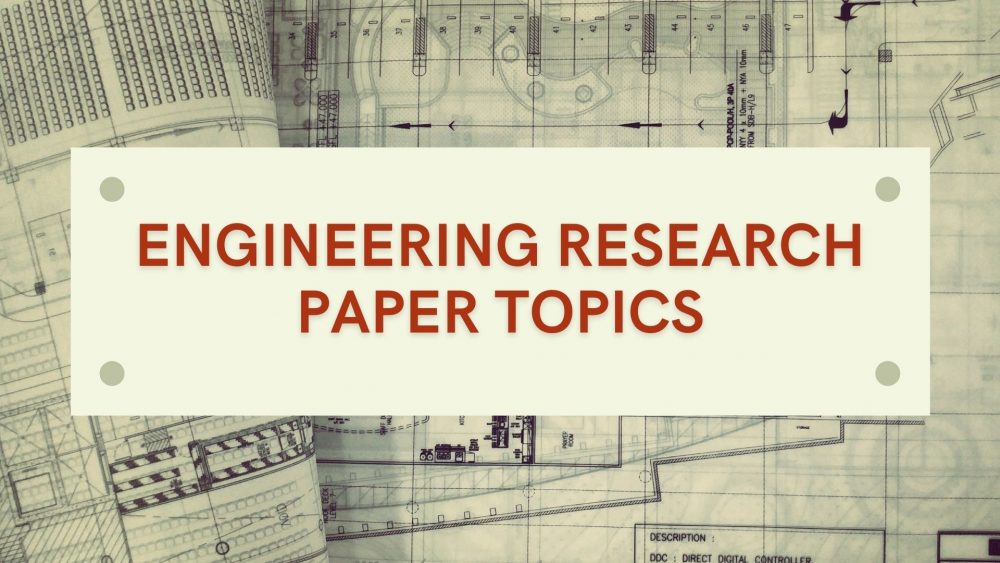
Leave a Reply Cancel reply
Your email address will not be published. Required fields are marked *
Comment * Error message
Name * Error message
Email * Error message
Save my name, email, and website in this browser for the next time I comment.
As Putin continues killing civilians, bombing kindergartens, and threatening WWIII, Ukraine fights for the world's peaceful future.
Ukraine Live Updates
240 Best Chemistry Research Topics and Ideas to Get Started
Table of Contents
Are you looking for unique chemistry research topics for your assignment? If yes, then this blog post is for you. We know how strenuous it is to gather interesting research ideas. However, more than collecting ideas, selecting one perfect topic from plenty of Chemistry research prompts is even tougher. Therefore, to ease your topic selection process, here, we have explained how to choose a good topic for your chemistry research paper. In addition to that, we have also recommended 200+ outstanding research topics on different branches of Chemistry. Continue reading this blog and get exclusive ideas for writing a brilliant chemistry thesis.
Chemistry Research Paper Writing
Chemistry is a branch of science that deals with the structure, composition, and properties of elements and compounds, the changes they undergo, and the natural laws that describe those changes. It is a complex subject that uses various study methods and contains a lot of chemical reactions and experiments. If you are a high school student or college student pursuing a degree in chemistry, then you can’t escape from submitting a chemistry project assignment or research paper.

To write a brilliant chemistry research paper and score top grades, a good chemistry research paper topic is what you need first. Generally, identifying a topic for chemistry research is challenging, and most importantly, it requires a lot of effort and time. But, once you identify the right chemistry research topic and are clear with your objectives, then you can confidently structure and write an excellent chemistry research paper by including the introduction, methods, results, and discussion related to your topic.
How to Select a Chemistry Research Topic?
As said earlier, for writing a research paper, you must have a good topic. In general, chemistry is a broad subject that contains a lot of research topics and areas. So, while you are in the topic selection phase, narrow down your research and try to choose the chemistry research topic that is
- Interesting to you
- Unique and informative for your readers
- Analytical and Researchable
- Contains a lot of supporting academic references and evidence
Most importantly, before finalizing your topic, check whether or not the research topic you have selected meets the research paper writing requirements shared by your instructor.
List of Interesting Chemistry Research Paper Topics
For writing a chemistry research paper, there are plenty of research topics on various branches of chemistry such as analytical, physical, organic, inorganic, and biochemistry.
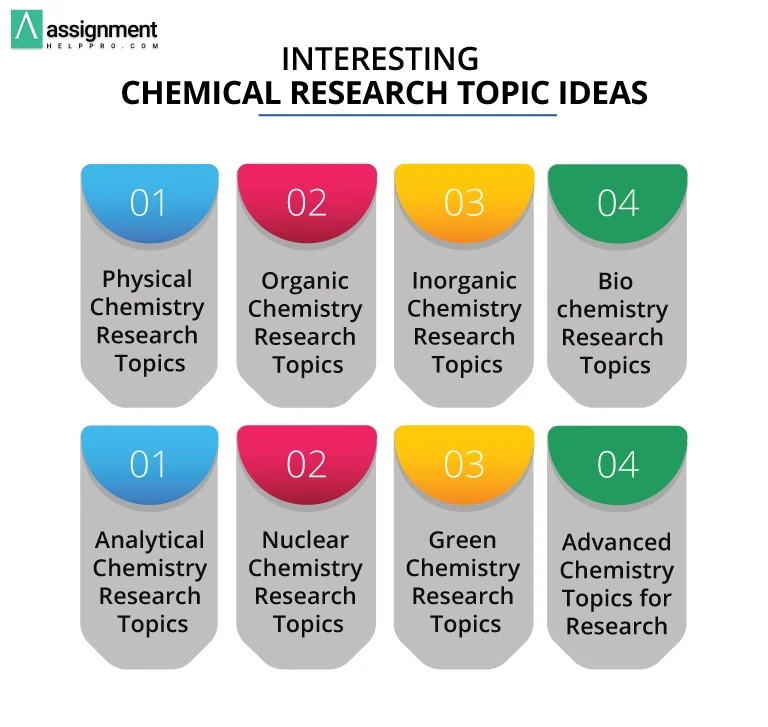
Listed below are a few interesting chemical research topics that will help you to get top grades. Go through the complete list of ideas and pick a topic of your interest.
Simple Chemistry Research Paper Topics
- Why is it essential to study chemistry in high school?
- How does acid rain form?
- Explain how heavy metals are detected in plants.
- Explain the formation of dry ice.
- Why is Sodium Azide used in car airbags?
- Explain how military applications use Nanophotonics.
- Explain why Ibuprofen is considered dangerous.
- Discuss the ionization methods for the mass spectrometry process.
- How do chemicals in our brains create moods?
- Air pollution measurements
- Practical Implications of Thermodynamics Laws
- Water purification systems
- Chemical applications in industries
- Thermochemistry Experiments
- How to calculate pH Level?
- Acid-Base Neutralization Process
- Thermal effects of various chemical reactions
- Chemical Kinetics Experiments
- Molecular Polarity Analysis
- Acids and Salts in Oxidation Interaction
- Detection of heavy metal in plants.
- Air pollution measurements.
- Optimizing indoor plants’ life through chemistry.
- Oxygen discovery.
Physical Chemistry Research Topics
- Discuss chemistry and quantum mechanics
- Discuss the entropy laws.
- How do catalysts work?
- Discuss the Schrodinger Equation
- What is electronic spectroscopy?
- Explain vibrational spectroscopy
- What is the Time-of-Flight principle?
- What are the gas laws?
- How do internal combustion engines work?
- When is the reaction reversible?
- When does a collision not cause a reaction?
- Discuss the harmonic and anharmonic oscillators.
- Explain applications in Kinetics
- Define successive ionization energies.
- Reasons why molecules with polar bonds might not have a permanent dipole.
- Describe the major gas properties.
- What are the applications of Hess’s law?
- Vibrational spectroscopy.
- Electronic spectroscopy.
- Harmonic and anharmonic oscillator.
- Multielectron atoms.
- How do intermolecular forces affect the melting point of a substance?
Also read: Outstanding Physics Research Topics To Explore and Write About
Organic Chemistry Research Topics
- What is nucleic acid stability?
- What are the benefits of chemoenzymatic synthesis?
- Explain Phenol as a form of acid
- What is snow pollution? Explain how dangerous it is.
- Describe the properties of a chiral molecule.
- Describe the production of hydrocarbon fuel
- Define and explain what nucleophiles are.
- Isomerism types in organic compounds
- Chemical composition of vitamins
- How do free-radical reactions work?
- Mechanisms of aerosol formation.
- How do you identify organic compounds using infrared spectroscopy?
- What defines a compound as aromatic?
- Chemical warfare: the dark side of organic chemistry.
- Discuss the chemical composition of pain relief medicine.
- What makes aromatic compounds unreactive?
- What makes a plant poisonous?
- Identify factors that influence proton chemical shifts.
- Composition, use, and effects of additional polymers or plastics
- The production of chemicals using carbon-carbon bond-forming reactions.
Inorganic Chemistry Research Topics
- How are organic materials affected by sulfuric acid?
- How do organic compounds differ from inorganic compounds?
- Explain Dalton’s Law of Partial Pressures
- Why do solar cells use silicon dioxide?
- Explain the importance of inorganic chemistry.
- Explain the Multiple Proportions Law
- The peculiarities of hydrogen bonds and polarity.
- What are the types of nucleosynthesis?
- What is lattice energy, and how can you measure it?
- How do you use the angular overlap model?
- How does the chemical structure of a gemstone determine its color?
- What causes phosphorescence?
- How do ligand substitution reactions work?
- The use of chemistry in jewelry manufacturing.
- Define the selection rules for vibrational transitions.
- What are the uses of point groups in inorganic chemistry?
- In which ways are chemicals able to bond?
- How does molecular symmetry predict the chemical properties of a molecule?
- How does HSAB explain reaction mechanisms?
- What is the most effective way to grow synthetic diamonds?
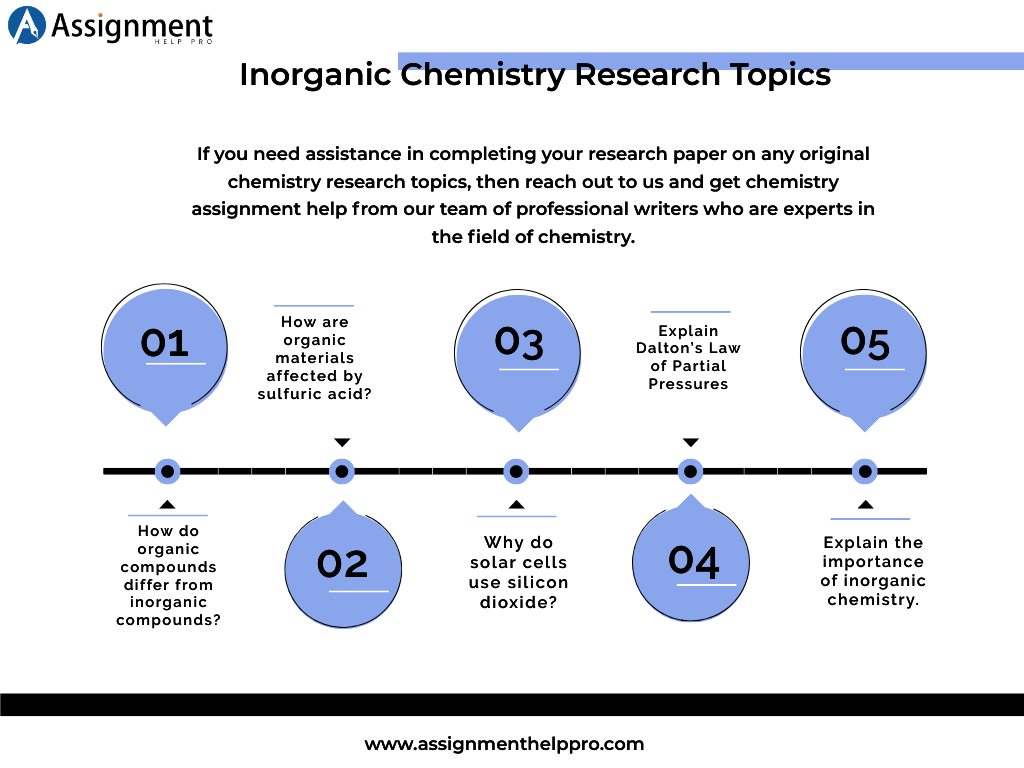
Biochemistry Research Ideas
- Describe the cell metabolism processes
- What role do lipids play in biological systems?
- What is enzyme kinetics?
- Explain fatty acid metabolism
- Explain the special properties that water has.
- Describe the structure and role of carbohydrates.
- Explain the DNA replication & repair processes
- Glycolysis: how does it convert glucose?
- Explain the structure and function of proteins
- Explain enzyme inhibitors and their mechanisms.
- How does the Citric Acid Cycle work?
- Obtaining protein structures with X-ray crystallography.
- How do you treat hemophilia?
- The legacy of Dolly the sheep.
- How does the body react to chlorine exposure?
- How do solutes move through biological membranes?
- Dietary supplements: help or hazard?
- Understanding the role of lipase in pathophysiological processes.
- What are the benefits of epigenetics ?
- Amino acids: industrial applications.
Analytical Chemistry Research Topics
- Isomerism Framework Advantages
- Why is analytical chemistry important for the environment?
- What are the ways to measure the amount of a specific substance in a compound?
- The best techniques for quantitative chemical analysis.
- Explain how to determine PAH sources in soil.
- Electroanalytical techniques
- Electrodes and Potentiometry
- Identifying hazardous substances in cheese.
- Chemical Equilibrium Effect
- How do you detect pesticides using immunoassays?
- Ways to find adulterants in drugs.
- Examine how analytical chemistry is used in forensic science.
- Mass-based analysis: gravimetric analysis.
- A simple way to separate chemical compounds: gas chromatography.
- How does activation analysis work?
- How do you find iron in a mixture of metals?
- Genetically modified foods and their impact on human health.
- Drug safety approach in administration and nursing.
- How do you identify the shelf life of medicine?
- Miniaturization: how does it advance analytical chemistry?
Nuclear Chemistry Research Topics
- What are the common uses of radioactive elements?
- How do you calculate an element’s half-life?
- Cold fusion: will it ever be possible?
- Mass spectrometry: ionization techniques.
- Nuclear waste: reprocessing, disposal, and transportation.
- The Big Bang: how did it create the Universe as we know it?
- The relevance of hydrogen in nuclear fusion.
- Compare the efficiency of different extraction methods.
- Henri Becquerel and the discovery of radioactivity.
- What are the biological applications of radiochemistry?
- Interactions between water and radioactive elements.
- How is nuclear chemistry used in medicine?
- How do we know that a nucleus is stable?
- Compare the three different types of radiation.
- How do elements transmute in the process of nuclear fission?
- Radiation: how does it harm biological systems?
- Ways to destroy toxic organic compounds using irradiation.
- The adverse effects of ionizing vs. non-ionizing radiation.
- How does radiocarbon dating work?
- How are chemosensors used in radiation chemistry?
Green Chemistry Research Topics
- Discuss the twelve principles of green chemistry.
- Discuss the most pressing issues in green chemistry today.
- Is biomimicry the best way to sustainability?
- What are the advantages of molar efficiency?
- Are bioplastics beneficial for the environment?
- Compare the effectiveness of various materials used in solar cells.
- How efficient is artificial photosynthesis?
- Describe the advantages of Levulinic Acid use.
- What are efficient ways to extract and use critical elements more sustainably?
- Electrocatalysis is a way to generate and consume fuels.
- How can the toxicity of paint be reduced?
- Will cultivated meat become a green alternative to traditional farming?
- Computer chips: how do we make them more sustainable?
- Innovative ways to avoid pesticides in agriculture.
- Eco-friendly packaging and its issues.
- What are the types of bio-based renewable feedstocks?
- How do metathesis reactions help reduce greenhouse gas emissions?
- Is carbon capture effective?
- What are the best ways to remove carbon pollution?
- Developments in green energy
Advanced Chemistry Topics for Research
- What chemical information can we find in meteorites?
- Compare the types of noncovalent bonding.
- Describe the impact of nanotechnology.
- Magnetism and coordination compounds.
- How does water recycling work?
- Examine the dopamine hypothesis of schizophrenia.
- Cloud seeding: when is it useful?
- How does nanoscience change our lives?
- Polymers: what do we use them for?
- Examine the properties of imino-disaccharides.
- What link exists between chemistry and cosmetics?
- What exactly is organic food and is it safe to eat?
- What effect do chemicals have on the long-distance delivery of goods?
- Compare the efficiency of various vegetable oils in the production of biodiesel.
- Analyze the pesticide traces in vegetables from different marketplaces.
- Calculate soft drink density. What impact does sugar have?
- What kinds of solutions make the finest electrical conduits in terms of conductivity?
- How much energy is produced when nuts and chips are burned?
- What health hazards does radon pose and how can it be avoided in buildings, please?
- Describe the innovations made by the chemical scientist who made the greatest contributions
Read also: Interesting Science Research Paper Topics To Deal With your Paper
Innovative Chemistry Research Paper Topics
- Science research on Bacteria found Electron highway for Hydrogen and Carbon Dioxide Storage.
- Bacteria-Based Biohybrid Microrobots with an objective to One-day fight Cancer.
- A New Test System was introduced for Passive Cooling Materials to Cut Energy Consumption.
- Researchers create a Computer Model to determine whether a Pesticide Will affect Bees.
- Instant, Efficient COVID -19 biosensor under Progress.
- Why does Photochemical smog rises when Particle Pollution is reduced?
- Framework for Prioritizing Drinking Water System Investment.
- First-ever view of a hidden quantum phase is captured by researchers.
- Discovering new ways to control the stereochemistry of chemical reactions
- Creating new ways of identifying explosive residues
- Inspecting the photochemistry of organic molecules
- Effects of amino acids’ side chains on protein folding
- Quantum mechanics use for chemical reactions.
- Study of extraterrestrial molecular chemistry in astrochemistry.
- Integrating biological and chemical processes.
Excellent Chemistry Research Ideas
- Pharmaceutical Industry and Green Chemistry.
- Transformation of Cigarette chemicals over a period of time.
- Climate change with emission of Carbon.
- How intake of fast food chemicals impacts the human brain
- Enhance the existing recycling processes.
- Compare and contrast the applications and benefits of Organic chemistry and Analytical Chemistry
- Explore the preparations and properties of metal complexes with organometallic ligands
- Develop a conceptive study on inorganic chemistry and its role in the environment
- What is called hydrodynamics of soft active matter and the effects of sulfuric acid on organic materials?
- Describe a rational molecular design for achieving persistence and reducing toxicity
- Develop a brief understanding of the targeted thermostat schemes and molecular dynamics
- Provide an overview and an update on the clinical pharmacology of ibuprofen
- Identify and analyze the significance of astrochemical research on extraterrestrial molecules
- Describe the role of metal ions in enzyme systems (activation or inhibition of enzyme activity through the ions)
- What is called plasmonic nanomaterials for photo-energy conversion applications and the benefits of such applications?
- Synthesis and evaluation of the biological activity of the metal complexes
- Discuss some plasmonic nanostructures and nanomaterials and their use in plasmonic metal-semiconductor systems.
Captivating Chemistry Research Topics
- Write about the discovery of aniline dyes.
- Explore the effects of cell-surface sugars on health, illness, and aging.
- Discuss the method of creating new alloys and suggest effective ways to improve the existing ones.
- Write about the recent advancements in mechanistic organic photochemistry.
- Explain the influence of surface tension and its effects on mixtures.
- Describe the properties of mesoscopic structure at ultrafast time scales.
- Explain the fast dynamics of water droplets upon freezing.
- Conduct a meta-analysis on the biological synthesis of cholesterol.
- Write about chiral class drug analysis in forensic laboratories.
- Application of electrochemical biosensor for toxic detections.
From the list of ideas suggested in this blog, choose an ideal topic and draft a high-quality chemistry research paper deserving of an A+ grade. But remember, writing a chemistry research paper is not an easy task because you must have reliable academic sources and strong analytical and research knowledge to work on your chosen topic.

Related Post

110 Hard Words to Spell for Students and Adults

Learn How to Avoid Passive Voice in 3 Simple Steps

117 Best Greek Mythology Essay Topics For Students
About author.

Jacob Smith
I am an Academic Writer and have affection to share my knowledge through posts’. I do not feel tiredness while research and analyzing the things. Sometime, I write down hundred of research topics as per the students requirements. I want to share solution oriented content to the students.
Leave a Reply Cancel reply
You must be logged in to post a comment.
- Featured Posts
140 Unique Geology Research Topics to Focus On
200+ outstanding world history topics and ideas 2023, 190 excellent ap research topics and ideas, 150+ trending group discussion topics and ideas, 170 funny speech topics to blow the minds of audience, who invented exams learn the history of examination, how to focus on reading 15 effective tips for better concentration, what is a rhetorical analysis essay and how to write it, primary school teacher in australia- eligibility, job role, career options, and salary, 4 steps to build a flawless business letter format, get help instantly.
Raise Your Grades with Assignment Help Pro
50+ Remarkable Chemistry Project Topics for BSC Students: Chemical Kinetics
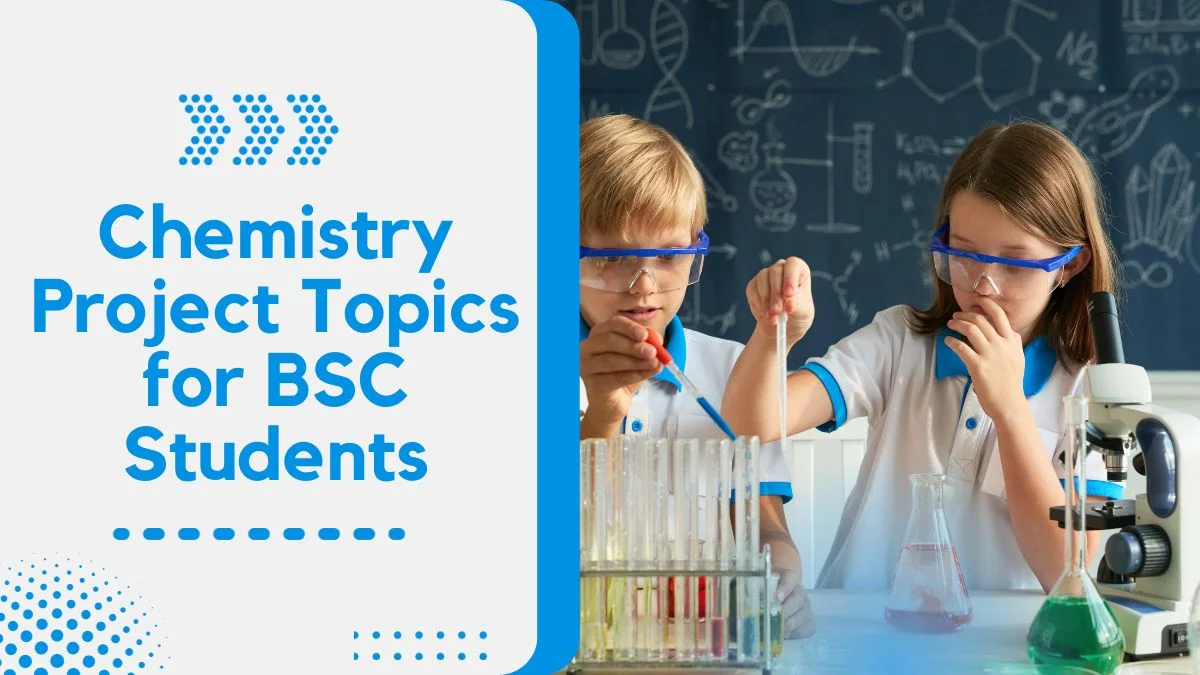
- Post author By admin
- October 6, 2023
Explore a comprehensive list of chemistry project topics for BSC students. Enhance your knowledge and excel in your academic pursuits.
Welcome to the captivating world of chemistry! For Bachelor of Science (BSC) students, the journey through the diverse landscapes of chemical science is an exciting adventure.
Central to this journey are chemistry projects—opportunities for hands-on exploration, experimentation, and discovery.
Yet, the secret to a truly rewarding project lies in the choice of the right topic—one that not only aligns with academic goals but also stirs up genuine curiosity and enthusiasm.
In this article, we’re about to embark on an inspiring quest through a specially curated list of chemistry project topics, tailor-made for BSC students like you.
These topics promise not only to enhance your academic journey but also to kindle your passion for the captivating world of chemistry.
So, let’s dive in and explore the boundless possibilities and wonders that await in the realm of chemistry projects!
Table of Contents
What is Chemistry Project Topics ?
Chemistry, often dubbed the central science, has its fingerprints on virtually every facet of our lives. It’s the hidden force behind the scents we love, the reactions that fuel our cars, and even the medicines that keep us healthy.
Now, suppose this: BSC students are at the forefront of this captivating science, armed with a unique chance to dive headfirst into its various branches through project work.
These projects aren’t just your run-of-the-mill assignments; they’re like scientific adventures.
They do much more than boost your knowledge; they’re contributions to the grand tapestry of scientific discovery. So, imagine being part of this world, where you not only learn but also shape the future of chemistry!
The Importance of Choosing the Right Chemistry Project
Have a close look at the importance of choosing the right chemistry project:-
Personal Engagement
A well-suited project captures your interest and keeps you engaged throughout, making your academic journey more enjoyable.
It should align with your coursework and academic goals, ensuring that your efforts contribute meaningfully to your education.
Contribution
Choosing the right project means you’re not just benefiting yourself; you’re also adding to the body of scientific knowledge and benefiting the broader scientific community.
Skill Development
The right project challenges you, helping you acquire and refine valuable skills essential for your academic and professional growth.
When you’re passionate about your project, it transforms the work into a thrilling journey filled with curiosity, discovery, and enthusiasm.
In summary, the importance of selecting the right chemistry project goes beyond academics; it influences your engagement, relevance, contribution, skill development, and passion, enriching your scientific experience and personal growth.
Chemistry Project Topics for BSC Students
Here are Chemistry Project Topics for BSC Students:-
Organic Chemistry Projects
- Synthesis of Aspirin: Investigate the synthesis process, purity, and properties of this widely used pain reliever.
- Extraction of Natural Pigments: Explore the extraction of pigments from various plants and assess their applications in dyes and cosmetics.
- Analysis of Essential Oils: Analyze the chemical composition of essential oils from different sources and study their potential medicinal properties.
- Green Chemistry: Investigate environmentally friendly synthesis methods and processes in organic chemistry.
- Organic Synthesis of Pharmaceuticals: Design and synthesize organic compounds with potential pharmaceutical applications.
- Study of Aromatic Compounds: Explore the properties and reactions of aromatic compounds, such as benzene and its derivatives.
- Polymer Chemistry: Investigate the synthesis and properties of polymers, including their applications in various industries.
- Organic Chemistry of Natural Products: Analyze the chemical makeup of natural products like alkaloids, terpenes, and flavonoids.
- Organometallic Chemistry: Study the bonding and reactivity of compounds containing metal-carbon bonds.
- Organic Photochemistry: Explore the effects of light on organic compounds and their photochemical reactions.
Inorganic Chemistry Projects
- Synthesis of Metal Complexes: Investigate the preparation and characterization of metal complexes with ligands of varying structures.
- Coordination Chemistry: Explore the coordination behavior of transition metal ions with different ligands.
- Inorganic Synthesis of Nanoparticles: Synthesize and characterize metal or metal oxide nanoparticles with potential applications in catalysis or nanotechnology.
- Study of Lanthanides and Actinides: Investigate the properties and applications of lanthanide and actinide series elements.
- Inorganic Reaction Mechanisms: Analyze the reaction mechanisms of various inorganic reactions, such as redox reactions or ligand substitution reactions.
- Organometallic Synthesis: Study the synthesis and reactivity of organometallic compounds containing metal-carbon bonds.
- Bioinorganic Chemistry: Explore the role of metal ions in biological systems and their significance in biochemical processes.
- Main Group Chemistry: Investigate the chemistry of main group elements and their compounds.
- Inorganic Synthesis of Coordination Polymers: Synthesize and characterize coordination polymers with unique structures and properties.
- Supramolecular Chemistry: Study non-covalent interactions in inorganic chemistry, such as host-guest complexes and molecular recognition.
Physical Chemistry Projects
- Chemical Kinetics: Investigate the rate of chemical reactions under different conditions and analyze reaction mechanisms.
- Electrochemistry: Explore the principles of electrochemical cells, study electrode processes, and investigate applications in energy storage.
- Thermodynamics of Reactions: Study the thermodynamic parameters of chemical reactions, including enthalpy, entropy, and Gibbs free energy.
- Quantum Chemistry: Apply quantum mechanical principles to predict molecular structures and electronic properties of chemical compounds.
- Statistical Mechanics: Explore the statistical behavior of particles in systems, including the Boltzmann distribution and partition functions.
- Surface Chemistry: Investigate the physical and chemical properties of surfaces and interfaces, including adsorption and catalysis.
- Chemical Thermodynamics: Study the thermodynamic properties of chemical systems and phase equilibria.
- Spectroscopy and Molecular Structure: Analyze the interaction of matter with electromagnetic radiation and determine molecular structures.
- Chemical Equilibrium: Investigate chemical equilibrium and the factors that influence it in various chemical reactions.
- Photochemistry: Explore the effects of light on chemical reactions, including photochemical mechanisms and applications.
These diverse project topics encompass a wide range of subfields within chemistry, offering BSC students opportunities for hands-on exploration and research in their chosen area of interest.
How to Select the Ideal Chemistry Project Topic?
Selecting the ideal chemistry project topic is a crucial step that can significantly impact your academic journey and research experience. Here’s a guide on how to make the right choice:
Personal Interest
Start by considering your personal interests within the field of chemistry. What topics or areas intrigue you the most? Projects aligned with your passions are more likely to keep you motivated and engaged throughout.
Academic Alignment
Ensure that the chosen topic aligns with your coursework and academic goals. It should complement your studies and contribute to your overall understanding of chemistry.
Research Existing Knowledge
Before finalizing a topic, research existing literature and studies in that area. Understanding what has already been explored can help you identify gaps in knowledge or areas where further investigation is needed.
Consult with Professors
Seek guidance from your professors or mentors. They can provide valuable insights into potential project topics, offer suggestions, and help you refine your ideas.
Available Resources
Consider the resources available to you, including laboratory equipment, chemicals, and access to research materials. Ensure that your chosen project is feasible within your academic environment.
Scope and Complexity
Assess the scope and complexity of the project. It should be challenging enough to stimulate your intellectual growth but not so complex that it becomes unmanageable.
Relevance and Impact
Think about the broader relevance and potential impact of your project. How does it contribute to the field of chemistry or address real-world issues? Projects with practical applications or scientific significance can be particularly rewarding.
Feasibility
Evaluate the feasibility of your project in terms of time, budget, and available support. Ensure that you have a clear plan for conducting experiments and gathering data.
Ethical Considerations
Be aware of any ethical considerations related to your project, especially if it involves human subjects, animals, or hazardous materials. Ensure that your research adheres to ethical guidelines.
Flexibility
Keep some degree of flexibility in your project plan. Research may take unexpected turns, and being adaptable can help you navigate challenges and make the most of unexpected discoveries.
Passion and Curiosity
Choose a topic that genuinely excites your curiosity. A project driven by passion often leads to more enthusiastic and successful research.
Peer Feedback
Discuss your ideas with peers or fellow students. Their perspectives and feedback can offer valuable insights and help you refine your project concept.
By carefully considering these factors and conducting thorough research, you can select an ideal chemistry project topic that not only aligns with your interests and academic goals but also offers a rewarding and enriching research experience.
Tips for Successful Project Execution
Have a close look at the tips for successful project execution:-
Detailed Planning
Start with a well-structured project plan. Define your objectives, set clear goals, and create a timeline outlining each phase of your project.
Research Extensively
Before conducting experiments, thoroughly research the relevant literature to understand existing knowledge and methodologies related to your topic.
Prioritize safety at all times. Familiarize yourself with safety protocols, wear appropriate protective gear, and handle chemicals and equipment with care.
Experimental Design
Design your experiments carefully, considering variables, controls, and potential sources of error. Consult with professors or advisors for input on your experimental setup.
Data Collection
Maintain accurate and organized records of your experiments, including measurements, observations, and any unexpected results.
Analytical Tools
Utilize appropriate analytical tools and techniques for data analysis. This may involve statistical analysis, spectroscopy, chromatography, or other methods depending on your project.
Troubleshooting
Be prepared to encounter challenges during experiments. Develop problem-solving skills and seek guidance from mentors or colleagues when needed.
Regular Updates
Keep your professors or advisors informed of your progress. Regular meetings can provide valuable feedback and help you stay on track.
Documentation
Create a detailed laboratory notebook or digital records that document your procedures, results, and any modifications made during the project.
Data Interpretation
Analyze your data critically and draw meaningful conclusions. Discuss your findings with mentors and peers to gain different perspectives.
Adaptability
Be flexible in your approach. If your initial experiments do not yield the expected results, be open to adjusting your methods or hypotheses.
Time Management
Manage your time effectively to meet project milestones and deadlines. Avoid procrastination and allocate sufficient time for analysis and report writing.
Communication Skills
Develop strong communication skills to convey your research findings clearly and effectively, both in written reports and oral presentations.
Collaboration
Collaborate with colleagues or fellow students when applicable. Sharing ideas and resources can enhance the quality of your research.
Continuous Learning
Stay updated with the latest developments in your field through scientific journals, conferences, and discussions with experts.
Ethical Conduct
Adhere to ethical guidelines and principles in your research. Ensure that your work is conducted with integrity and honesty.
Feedback Incorporation
Embrace constructive feedback from mentors, peers, or reviewers, and use it to improve your project and research skills.
Celebrate Milestones
Acknowledge and celebrate your achievements and milestones throughout the project. It can boost motivation and morale.
Stay Organized
Maintain a well-organized workspace and records. A tidy and systematic approach can save time and prevent errors.
Reflect and Learn
After completing your project, reflect on your experiences and lessons learned. Consider how you can apply these insights to future research endeavors.
By following these tips and maintaining a dedicated and systematic approach, you can enhance the chances of successful project execution in the field of chemistry.
Benefits of Chemistry Projects for BSC Students
Certainly, here are the benefits of chemistry projects for BSC (Bachelor of Science) students:
Hands-On Experience
Chemistry projects provide students with practical, hands-on experience in conducting experiments, handling chemicals, and using laboratory equipment. This experience is invaluable for future careers in science.
Deeper Understanding
Engaging in research projects allows students to delve deeper into specific areas of chemistry, gaining a more profound understanding of concepts and theories.
Problem-Solving Skills
Projects often involve troubleshooting and problem-solving, honing students’ critical thinking and analytical skills . They learn to overcome challenges and adapt their approaches.
BSC students acquire a wide range of laboratory and research skills, including data collection, analysis, and interpretation. These skills are transferable and valuable in various scientific fields.
Research Ethics
Students learn about research ethics, including responsible conduct and the importance of integrity in scientific inquiry.
Scientific Method
Projects follow the scientific method, teaching students how to formulate hypotheses, design experiments, and draw conclusions based on evidence.
Encouragement to explore unique topics fosters creativity and innovation. Students may discover new approaches or solutions to existing problems.
Interdisciplinary Learning
Chemistry projects often intersect with other scientific disciplines, providing opportunities for interdisciplinary learning and collaboration.
Publication and Presentation
Successful projects can lead to publications or presentations at conferences, enhancing students’ academic and professional portfolios.
Career Preparation
The skills and experiences gained from chemistry projects prepare students for careers in research, academia, industry, or healthcare.
Increased Confidence
Completing a project independently or as part of a team boosts students’ confidence in their abilities to tackle complex scientific challenges.
Projects often involve interaction with professors, mentors, and peers, helping students build a professional network within the scientific community.
Resume Enhancement
A well-executed project can serve as a strong addition to a student’s resume or graduate school application, setting them apart from their peers.
Real-World Applications
Many chemistry projects have real-world applications, allowing students to see the practical relevance of their studies.
Contributions to Knowledge
Students may make meaningful contributions to the field of chemistry by generating new data, theories, or insights.
Personal Fulfillment
Successfully completing a challenging project can provide a sense of personal fulfillment and accomplishment.
Preparation for Advanced Degrees
For those considering postgraduate studies, chemistry projects provide valuable research experience and strengthen applications for advanced degrees.
Critical Evaluation
Students learn to critically evaluate existing literature and research, improving their ability to assess scientific claims and findings.
Teamwork and Leadership
Collaborative projects enhance teamwork and leadership skills, important attributes for any career path.
Life-Long Learning: Engaging in research projects fosters a love for learning and encourages students to continue exploring and discovering throughout their careers.
What is the best topic for chemistry project?
Selecting the right chemistry project topic is crucial for a successful project. The ideal topic should align with your interests, offer access to ample research materials, and be suitable for your skill level and experience.
Here are some ideas to consider for chemistry projects:
Chemical Composition Analysis
Investigate the chemical composition of a commonly used household product. This can provide insights into the ingredients and their properties.
Factors Affecting Chemical Reactions
Explore how various factors, such as temperature or pH levels, impact a chemical reaction. This research can reveal the variables influencing reaction outcomes.
Innovative Compound Synthesis
Develop a novel method for synthesizing a chemical compound. This project offers an opportunity to innovate and create something new.
Material Properties Study
Study the properties of a recently discovered material. This can involve characterizing its physical, chemical, and structural attributes.
Experimental Hypothesis Testing
Design and conduct an experiment to test a scientific hypothesis related to chemistry. This approach allows you to apply the scientific method.
If you find yourself unsure about the right topic, consider seeking suggestions from your teacher or browsing the internet for a wealth of chemistry project ideas.
Remember, the key is to choose a topic that sparks your curiosity and aligns with your abilities, ensuring a rewarding and successful project.
What are hot topics in chemistry?
In the realm of chemistry, 2023 brings forth some scintillating and cutting-edge areas of research:
Sustainable Chemistry
With a laser focus on eco-friendliness, sustainable chemistry aims to birth cleaner chemical processes and products. Think novel catalysts for green energy, inventive techniques for recycling and waste reduction, and biodegradable, non-toxic materials.
Materials Science
This arena is all about crafting and scrutinizing new materials, from polymers to metals, ceramics, and composites. Researchers are fashioning materials for advanced batteries, solar cells, medical devices, and robust, lightweight structural applications.
Biochemistry
At the intersection of chemistry and life itself, biochemistry explores the intricate chemistry of living organisms.
Dive into the study of proteins and enzymes, the development of groundbreaking drugs and therapies, and the engineering of microorganisms to yield valuable products.
Quantum Chemistry
The captivating fusion of quantum mechanics and chemistry gives birth to groundbreaking methods for simulating and predicting molecular properties. Think about the design and synthesis of new materials and the rise of quantum computing.
Artificial Intelligence (AI)
AI’s infusion into the chemistry landscape is revolutionary. It’s shaping the development of next-gen drugs that are both potent and gentle, as well as the creation of robust, lightweight materials.
Moreover, AI is predicting chemical reaction outcomes, optimizing processes, and pushing the boundaries of innovation.
These are just a glimpse into the dynamic world of chemistry research in 2023. It’s a vast and swiftly evolving domain, teeming with opportunities for groundbreaking discoveries and scientific progress.
What is an example of a chemistry topic?
A chemistry topic worth exploring is the impact of temperature on chemical reaction rates. This intriguing area can be probed through experimentation.
Imagine having two identical sets of reactants, each subjected to different temperatures, with the reaction rate meticulously measured at each temperature point.
The data collected can then be plotted on a graph, revealing the relationship between reaction rate and temperature.
This graphical representation can unveil critical insights, including the activation energy of the reaction and how the reaction rate fluctuates at varying temperatures.
Another captivating chemistry topic involves the synthesis of aspirin, a widely used pain reliever. Aspirin can be created through the reaction of acetic anhydride and salicylic acid.
Delving into this process entails carefully combining the two reactants in precise proportions and subjecting them to specific conditions.
The resulting product can then undergo purification and rigorous analysis to ascertain its purity and identity.
These examples merely scratch the surface of the diverse world of chemistry topics. The field encompasses an array of areas ripe for exploration, such as:
- Unraveling the mysteries of matter’s structure and properties.
- Exploring the intricacies of chemical bonding.
- Unearthing the mechanisms behind chemical reactions.
- Probing the fascinating realms of thermodynamics and kinetics.
- Delving into the electrifying world of electrochemistry.
- Mastering the art of analytical chemistry.
- Navigating the intricate pathways of organic and inorganic chemistry.
- Investigating the physical forces that drive chemical phenomena.
- Exploring the chemistry of life itself through biochemistry.
The specific chemistry topic you choose to explore should align with your interests and objectives. If you’re keen on delving deeper into a particular facet of chemistry, consider perusing research papers, articles, and discussions on the subject.
Engaging with your teacher or a knowledgeable chemistry professor can also provide valuable guidance and suggestions.
Which is the best project in MSC chemistry?
Selecting the perfect M.Sc. chemistry project is a crucial step in your academic journey. It should both captivate your interest and pose a satisfying challenge.
Equally important is the feasibility of completing the project within the confines of your program’s time constraints.
Consider these ideas for M.Sc. chemistry projects:
Embark on the creation of a groundbreaking method for synthesizing a chemical compound, pushing the boundaries of chemical innovation.
Material Exploration
Dive into the study of a novel material’s properties, shedding light on its characteristics and potential applications.
Design and execute experiments aimed at testing scientific hypotheses, employing meticulous methods and precise data analysis.
Factors Shaping Reactions
Investigate the intricate dance of different factors, such as temperature or pH levels, on the outcomes of chemical reactions, revealing the secrets of chemical kinetics.
Complex Sample Analysis
Analyze the intricate chemical composition of complex samples like plant extracts or biological fluids, offering insights into the mysteries of nature.
Analytical Advancements
Pave the way for cutting-edge analytical methods capable of detecting or quantifying specific chemical compounds with precision.
Therapeutic Innovation
Design and synthesize a new pharmaceutical or therapeutic agent, potentially impacting healthcare and medicine.
Molecular Insights
Delve deep into the molecular mechanisms underlying biological processes like photosynthesis or cell signaling, unraveling nature’s secrets.
Computational Chemistry
Forge new frontiers in computational chemistry by developing methods to predict the properties of molecules or materials.
Environmental Impact Assessment
Scrutinize the environmental consequences of chemicals or chemical processes, contributing to sustainability efforts.
Champion sustainability by crafting novel chemical processes or products that are gentle on the planet.
If you find yourself uncertain about the ideal topic, engage in discussions with your advisor or other seasoned professors within your department.
They possess valuable insights and can help pinpoint a project that aligns seamlessly with your interests and expertise.
Once you’ve chosen your focus, meticulously craft a research plan. Outline your research question, delineate the research methods, establish a timeline for completion, and identify necessary resources, including equipment, materials, and potential funding.
With your advisor’s approval, embark on your project, keeping detailed records of your work and maintaining regular communication with your mentor.
Upon project completion, compile your findings into a comprehensive thesis or dissertation. Additionally, consider presenting your research at seminars or conferences, sharing your discoveries with the scientific community.
Undertaking an M.Sc. chemistry project is a formidable yet gratifying endeavor. It’s an opportunity to cultivate new skills, conduct independent research, and contribute meaningfully to the realm of chemistry.
In wrapping up, the world of chemistry is like an endless playground for BSC students, filled with intriguing possibilities waiting to be explored.
Think of it as your chance to embark on a captivating adventure where every project is a new chapter in your scientific journey.
Choosing the right topic is your compass, guiding you toward a project that not only aligns with your interests but also fuels your academic ambitions. Remember, it’s not just an academic checkbox; it’s your gateway to an exhilarating exploration.
As you dive into your chosen project, consider it a rendezvous with curiosity, a chance to develop invaluable skills, and an opportunity to contribute your unique brushstroke to the canvas of scientific knowledge.
Throughout this adventure, you’ll navigate the twists and turns of experimentation, data analysis, and the thrill of discovery. Your dedication and inquisitiveness will be your trusty companions on this scientific quest.
In the grand scheme of things, every chemistry project is a stepping stone towards a deeper comprehension of the marvelous world of molecules and reactions.
It’s your invitation to join a community of scientists, explorers of the unknown, and seekers of truth.
So, as you venture forth into your chemistry project as a BSC student, do so with a heart full of excitement and a mind buzzing with questions.
Your journey promises not only academic growth but also the potential to make your mark on the ever-evolving landscape of scientific understanding. Enjoy the ride!
Frequently Asked Questions
How do i choose the best chemistry project topic for me.
Consider your interests, available resources, and relevance to your coursework.
Can I collaborate with professors on a project?
Yes, collaborating with professors can provide valuable guidance and resources.
What are the key skills I can gain from a chemistry project?
Skills include research, experimentation, data analysis, and critical thinking.
Are there any online resources for chemistry project ideas?
Yes, various websites and academic journals offer project ideas.
Where can I find more information on project execution and methodology?
University libraries and online databases are excellent sources for project guidance.
- australia (2)
- duolingo (13)
- Education (282)
- General (76)
- How To (16)
- IELTS (127)
- Latest Updates (162)
- Malta Visa (6)
- Permanent residency (1)
- Programming (31)
- Scholarship (1)
- Sponsored (4)
- Study Abroad (187)
- Technology (12)
- work permit (8)
Recent Posts

- Paper writing help
- Buy an Essay
- Pay for essay
- Buy Research Paper
- Write My Research Paper
- Research Paper Help
- Custom Research Paper
- Custom Dissertation
- Dissertation Help
- Buy Dissertation
- Dissertation Writer
- Write my Dissertation
- How it works
200 Outstanding Chemistry Topics For Research Papers
Chemistry is an interesting science because you can study global phenomena or the smallest particles of various organic or inorganic compounds. When choosing chemistry research paper topics, you can focus on a specific section, select an entire industry, and be guided by authoritative sources.
One of the main advantages is the ability to choose an interesting chemistry topic for an essay or research paper. But this paperwork has a number of nuances. Chemistry research paper topics for high school can be as complex and challenging as the college or university ones.
The professors of the department set out standard requirements for the technical design of such assignments. You should also draw on authoritative sources by choosing one of the chemistry topics for research. The structure of your paperwork should contain a consistent outline and fully cover the selected problem. Every statement or statistical fact must be supported by evidence.
This is especially true when choosing chemistry research topics for college, where each piece of data must be confirmed. It is best if you follow several reputable sources. Then it will be easier for you to cover chemistry research paper topics for college and create expert paperwork that will bring you a high score.
High School Chemistry Topics
Such chemistry presentation topics for high school are quite interesting because they cover various fields of science. You can write about the chemical interactions of molecules, covalent bonds, or even the acid-base balance of the human body. Another plus is that topics like these are easy to find on the Internet and from several reputable sources for inspiration.
- Study of acid-base neutralization.
- The action of acid when interacting with other components.
- General composition of acids and their basic properties.
- Methods of air protection from pollution.
- Features of alkali metals and their derivatives.
- Metallurgy as the main component of the economy.
- The study of the chemical properties of metals.
- The basic atomic theory.
- The analysis of biochemical processes of magnesium.
- Process of catalysis.
- The general valence of chemical components and studies of metal relationships.
- The study of the chemical balance of bioreagents.
- The analysis of the rate of a chemical reaction.
- Chemical reaction as a basis in all science.
- Examples of chemical reactions in real life.
- Chemistry as the basis of industry.
- The chemical composition of drugs.
- Basic safety methods for chemical experiments.
- The analysis of covalent non-polar bonds.
- The general concept of acids and solvents.
Organic Chemistry Topics
Such analytical chemistry research topics deal with organics and everything related to living organisms. You can prepare paperwork related to the effect of food on the human body, the nuances of creating organic fertilizers, or the principles of pheromone generation at the chemical level.
- The basic composition of chemicals and organic compounds.
- The peculiarity of the isomerism of organic chemicals in real life.
- Atoms and molecules of organic substances.
- General properties of electrophiles.
- Hydrocarbons in real life.
- The methods of gas production.
- Bases of hydrocarbon fuels.
- Benzene and its chemical compound.
- Basic aromatic hydrocarbons.
- Atomic alcohols and their properties.
- Molecules and the bases of polyhydric alcohols.
- What are alkaloids, and how do they interact with each other?
- Water-soluble vitamins and examples.
- Chemical compositions of modern drugs.
- The main stages of the formation of gas deposits.
- Oil and hydrocarbons.
- The peculiarity of nucleophiles.
- The main stages of the interaction of atoms in the modern world.
- Structure of organic chemicals on real examples.
- The process of gas formation.
Entertaining Chemistry Topics
Researchable topics in chemistry can be quite entertaining, especially if you like the chosen field. For example, you can choose something from biochemistry or write about the stages of creating an atomic bomb. This section allows you to choose any unusual topic, guided by information from authoritative sources.
- Biochemical composition of tap water.
- The main stages of the study of fertilizers.
- The chemical composition of ice cream.
- The general components of cosmetics.
- The communication between molecules & intra-quarter.
- The aging process of cells at the molecular level.
- The major substitutes for engine oil.
- Chemical energy as the main basis of interaction in the real world.
- Organic elements.
- Biochemical processes in modern plants.
- The analysis of the periodic table.
- The basic inanimate chemical compounds.
- Pharmaceuticals and drug research.
- The organic surfaces and basic reactions.
- The structure of electronic cigarettes at the biological level.
- The basis of synthetic food.
- The homochirality of amino acids
- Biochemical composition of Coca-Cola.
- Analysis of alcohol and ethanol.
- Structural changes in the chemical composition of modern reservoirs.
Controversial Chemistry Research Topics
This chemistry research paper topics list is especially interesting for fans of controversial topics and chemistry experiments. You can prepare paperwork, which will be based on experimental chemical research or put forward your own hypothesis of the origin of a certain chemical phenomenon.
- Chemical mixtures and gases during the Second World War.
- The analysis of the hazard of chemical reactions in factories.
- Synthetic molecules as the basis of future chemistry.
- Biological wars and conflicts.
- Fundamentals of synthetic biology.
- Gene analysis on the example of modified molecules.
- Biological cloning process.
- Human experiments you are in Nazi Germany.
- The features of biological research using real examples.
- The benefits and harms of chemical research.
- The analysis of factors of biochemical aging.
- Genetic engineering.
- The analytical structure of modern DNA
- The analysis of evolution at the cellular level.
- Chemical synthesis of molecules.
- Biochemical composition of arsenic.
- The reaction of the Silver Mirror in modern conditions.
- The analysis of the structure of human cells.
- The biological core and its structure.
- The bases of biological activity.
- The molecular level and genetic changes in organisms.
Complex Chemistry Research Topics
These chemistry research topics for undergraduates are quite popular because they allow you to prepare complex paperwork. The main nuance is to choose a topic with a sufficient amount of information. Then your work will be more informative.
- Chemical composition of modern fertilizers.
- Features of photocatalysis and 3D printing of cells.
- The main nuances of the synthesis of stable elements.
- The stages of polymer diagnostics.
- The model of research processes of biochemistry.
- The analysis of chemical reactions.
- The amplitude of modern dynamic processes.
- Chemical composition of polymers.
- The main nuances of the study of compounds in mineral fertilizers.
- Structure of biologically altered cells.
- The analysis from cultured organs.
- The synthesis of photopolymers.
- Symbiotic communication between cells.
- Fundamentals of agricultural chemistry.
- Symbiotic relations of organisms.
- Biologically active additives.
- The effect of pyrolysis on cells.
- The main structural stages of biochemical research.
- The factors affecting the change in the biological structure of the cell.
- Stages of structural chemical research.
Critical Chemistry Research Topics
Such chemistry research topics for high school students are especially appreciated to critically approach the collection and analysis of data. You can prepare a whole basis of theses and confirm them with real research. This is a good option for creating complex work based on authoritative sources.
- The modern concept of stereochemistry.
- The cosmetic industry and biochemical innovation.
- The main stages of divergent electrolysis.
- The conversion of polymers in modern society.
- All biological changes in cell structure.
- A critical look at modern chemistry.
- The analysis of valence bonds.
- The structural changes at the cellular level.
- All critical aspects of chemical substances.
- Methods of divergence and cell structuring.
- The main stages of DNA change.
- Structural deformations of biological organisms.
- The biological development at the cellular level.
- The analysis of two factorial structures of cells.
- The main biological stages of activity.
- The growth phase of biological cells.
- Synthetic and molecular changes.
- The main and development factors of structural chemistry.
- A critical look at modern chemical conservatism.
- The deformation of the cell at the early stages.
Analytical Chemistry Research Topics
- The placebo effect in modern biochemistry.
- The basic principles of chemical equilibrium.
- Isomerism as the main trend in chemistry.
- The chemical compositions of modern butane.
- The analysis of amide bonds.
- The format of analytical chemistry in the context of modern research.
- A critical look at chemical reactions.
- Planning and chemical analysis.
- All structural changes in chemical bonds.
- The structural biological element in the composition of cells.
- The research of organic chemistry.
- The modern communication of chemical additives.
- The types and stages of chemical analysis
- The general format of procedural cell generation.
- The chemical structure and its basic environment.
- The main factors of chemical bonds between heavy metals.
- The basic structural unit of chemical research.
- Analytical aspects of modern biochemistry.
- The general factors of structural chemical analysis.
- The classification of chemical reactions in production.
Chemistry Presentation Topics
By choosing chemistry presentation topics, you get the opportunity to study an interesting topic and prepare a comprehensive research paper. The main plus is that this segment is especially convenient for creating slides. This will help you to make a compelling presentation backed by authoritative sources.
- The main stages of thermal analysis.
- The structural separators in modern biochemistry.
- The ethics of chemical warfare.
- The nuances of chemical toxicity.
- The basic reagents for chemical nanoreactors.
- The fundamentals of chemical neurology.
- The atmospheric research at the chemical level.
- The enzymes and their effect on toxicology.
- Intensification of chemical processes.
- The basic photons and physical elements.
- The climatic chemistry.
- The main nuances of chemical processes for allergies.
- The chemical structure of the main elements of atmospheric compounds.
- The silicon as a chemical alternative to modern microchips.
- The bases of fluorine and inert gases.
- The main nuances of the interaction of chemical compounds.
- The biochemical composition of nitrogenous fertilizers.
- The chemical composition of nitrogen compounds.
- The main structural elements of modern biochemistry.
Interesting Chemistry Topics
By choosing interesting chemistry topics to research, you can combine a comprehensive analysis of a specific aspect and acquire new information. Paperwork like this can be rewarding and will make you less fatigued while analyzing data. It is believed that students write research papers faster if they like the topic.
- The main elements of chemical fertilizers.
- The influence of molecular composition on cell shape.
- Chemical analysis of bonds in living cells.
- An alternative to biological additives in the modern chemical industry.
- The chemical energy based on new valence bonds.
- The fundamentals of chemical transplantation.
- The basic chemical compounds in the modern industry.
- The alpha effect is the basis of all chemistry.
- The harm of electronic cigarettes.
- The main stages of creating synthetic food
- The rate of reaction of enzymes.
- The main nuance of modern biochemistry.
- The new structural innovations in the field of chemistry.
- The chemical analysis of bioactive substances.
- The lipids in modern chemistry.
- Methods of creating biological weapons.
- The inert gases as the basis of chemistry.
- The DNA cell structure.
- The analysis of unicellular organisms.
General Chemistry Topics
These can be inorganic or organic chemistry research topics. The general topic allows you to apply a flexible approach to choosing a field for preparing paperwork. For example, you can describe the biochemical processes in cells or the steps in creating inert gases. It all depends only on your preferences.
- The history of modern chemistry.
- The development of atomic-molecular theory.
- Features of saltwater purification.
- The chemical processes in the human body.
- The basic chemical reactions.
- The main stages of atomic energy research.
- The chemical reactions in solutions.
- The indicator and hydrogen and their derivatives.
- The system of reactions to biochemical components.
- The role of heavy metals in chemical processes.
- The analysis of the acid composition
- The alkali point and main components of biological changes.
- The hydrogen compound in nature.
- The basic chemical processes.
- The biochemical structure of molecules.
- The analysis of changes at the cellular level.
- The chemical composition of the hydrogen bomb.
- The role of chemical weapons in modern wars.
- The main components of mustard gas.
How to Write a Research Paper on Chemistry Related Topics?
With an interesting chemistry topic selected, you can start preparing basic information. First of all, you need to make an outline and general abstract as a framework for your paperwork. Each chemistry research topic for high school must be analyzed to collect important statistics. You need to rely on authoritative sources with verified data. Then the choice of chemistry presentation topics will be justified.
But this is not the whole list of nuances. You should adhere to all technical guidelines after choosing chemistry topics for research. The content and general structure of your paperwork play an important role in getting the final grade. While chemistry research paper topics for high school are simpler, university students will find it much more difficult. This is especially true when choosing a section with a minimum amount of scientific data.
When choosing chemistry topics for research papers, you should only rely on trusted sources. Wikipedia and other open-source encyclopedias are considered unacceptable resources because you must be guided by authoritative research. This even applies to chemistry topics for high school, where the requirements are slightly lower than at a college or university.
It should be noted that all chemistry research paper ideas in this article are for informational purposes only. This is a kind of reference point for students. The topics will also be of interest to those looking for chemistry undergraduate research project ideas to prepare complex paperwork.
Sometimes independent work can be too difficult. It is especially frustrating if you really like interesting chemistry research topics but can't prepare everything as required. In this case, you can use the services of our company. We will help you select interesting chemistry topics for presentation and create expert work for high scores.
You don't have to put in a lot of effort, since the whole process will be completely under our control. We guarantee you high school expert chemistry research topics and high marks. Contact us if you would like us to help you with research paper . We guarantee you first-class services.
An Inspiration List:
- What is chemistry? | Live Science
- chemistry | Definition, Topics, & History | Britannica
- The Royal Society of Chemistry
- Chemistry World: Chemistry news, research and opinions
- Chemistry - Latest research and news | Nature
- Chemistry Is Everywhere - American Chemical Society
- Chemistry | Science | AAAS
Summer II 2024 Application Deadline is June 26, 2024.
Click here to apply.

Featured Posts

National Science Foundation's High School Internship - 7 Reasons Why You Should Apply

10 Free Summer Programs for High School Students in New Jersey (NJ)

8 Summer STEM Programs for High School Students in Virginia

How to Write Your Personal Statement: A College Essay Expert’s Step-by-Step Process for Success

10 Mentorship Programs for High School Students in 2024-2025

10 Computer Science Camps for High School Students

7 Robotics Summer Camps for Middle School Students

9 Non-Profit Internships for High School Students

10 Best Hackathons for High School Students

10 International Olympiads for High School Students
25 Research Ideas in Chemistry for High School Students
Have you wanted to get into chemistry research, but didn’t know where to begin? Read this article to learn more on how you can start your own research project.
What Makes a Good Research Idea?
Before starting, having a good research idea will provide a firm foundation for your work. Before you begin, make sure to confirm if your research topic is:
What area are you addressing in your research project, and does it fill in some gap of knowledge? If your research has been done before or has been already thoroughly examined, then it’s unlikely your idea will be as compelling as an original paper that leaves room for future questions and innovations.
Interesting
Do you find the topic interesting? If you have passion in your work, you will be excited and engaged in your work, which others in the industry will definitely pick up on. If you don’t find your research interesting, it’s better to brainstorm which areas you’d be more passionate about.
Feasibility
Is the research doable? Make sure to take a deep look into your capabilities and resources, and use what’s available to you in order to pursue your research. While there are many projects that can be done at home or through the computer, you can reach out to a local college or laboratory if you’d like to get a more professional experience.
Okay, I Have a Research Idea, What’s Next?
Once you’ve picked a research idea, it may seem daunting on what to do next. You should develop a detailed research plan and reach out to teachers, professors, and scientists who can help you. Having a mentor can provide helpful comments on your research idea and your next steps.
For example, a mentored program like the Lumiere Research Scholar Program can be a great opportunity to experience the full research cycle. Those who are selected for the Lumiere Research Scholar Program are given 1-1 mentorship with top PhDs. Below, we share some of the chemistry research ideas that have been proposed by our research mentors.
Chemistry Research Ideas for High School Students
Research category #1 : energy and climate change.
Climate change has been one of the widely talked about topics in public discourse. With more media and political attention on this issue than ever before, it’s no wonder that there are many opportunities to explore how chemistry can be applied to help the planet. Therefore, researching in this field will yield potential benefits for society and beyond , making applications of this research especially compelling for passionate high school students.
1. Use green chemistry as a tool to achieve sustainability targets in the fields of energy, water remediation, agriculture or sensing.
2. Find novel chemicals that can be used to shape the next generation of batteries, green fuels, and energy harvesting.
3. Research materials can be developed to improve CO2 capture and Utilization (CCU).
4. Analyze different energy storage options currently available, and compare and contrast technologies' chemistries, performance, lifetime, cost, geographic and resource constraints, and more.
5. Learn the newest and most promising technologies in sustainability science, with a focus on how startups and the private sector are critical to our society's transition to a green future and how products are commercialized from lab to market.
Suggested by Lumiere PhD mentors at Harvard University, University of California, Berkeley, Yale University, and University of Cambridge.
Research Category #2 : Computation and Machine Learning
Data processing is becoming increasingly efficient, and especially in the advent of artificial intelligence systems, scientists are interested in learning how to apply new technologies to their line of work. If you’re looking for knowledge within computer science or computer engineering, these topics may stand out to you.
6. Apply machine learning for chemical challenges, such as how AI can bring benefits into the area of chemistry and how big data can be processed.
7. Merge chemistry with computational tools to design molecules and predict their properties.
8. Study molecular and biological systems via computational modeling, including finding the advantages and disadvantages of different techniques and types of computational analysis.
9. Implement machine learning for reaction optimization, process chemistry, reaction kinetics, mixing, scale-up and safety.
Suggested by Lumiere PhD mentors at Duke University, University of Cambridge, and University of Leeds.
Research Category #3 : Nanotechnology and Nanomaterials
The benefits of nanotechnology are clear – more developments in this field can lead to lower costs and stronger properties of materials. The area of technology is incredibly new, so if you want to get involved in a burgeoning research field , see if the following ideas interest you.
10. Conduct a general study on the focus on nanomaterials and their applications.
11. Understand how material nano-structure can create specific properties and take advantage of that "structure-property" understanding to engineer new materials.
12. Be exposed to the frontiers of material science and the host of meta-stable man-made materials with exotic properties.
Suggested by Lumiere PhD mentors at Technical University of Munich and Georgia Institute of Technology.
Research Category #4 : Chemical Reactions
One of the most major fundamental aspects of chemistry is understanding how different elements and molecules interact to create new products. Understanding more about how these reactions take place and which interactions are favored can yield better ideas on how to utilize them. If you’d like to better your chemistry skills, take a look at these topics:
13. Investigate how molecules are made in nature,such as what reactions are performed by enzymes to make natural products.
14. Study a reaction that changes color as it proceeds using your phone to measure the RGB-code evolution.
15. Delve into the synthesis of chemicals within organic chemistry, biochemistry, analytical chemistry.
16. Learn how to design, synthesize, and use molecular boxes for separating targeted compounds.
Suggested by Lumiere PhD mentors at Duke University and University of Cambridge.
Research Category #5 : Drug Discovery
Unsurprisingly, pharmaceuticals heavily utilizes the concepts of chemistry to create life saving drugs and treatments for people worldwide. If you’re interested in learning how chemical reactions can treat diseases within the human body , see below for more information.
17. Communicate the causes of drug resistance in tuberculosis, HIV/AIDS, or another infectious disease
18. Explore the connections between drug discovery, pharmaceutical development, flow chemistry, organic synthesis, electrochemistry, photochemistry, and biochemical and enzymatic synthesis.
19. Conduct a detailed research on proteins, their role in human disease, and how understanding protein structure can inform drug discovery.
20. Observe the characteristics of good drug candidates and the biological experiments performed to prove clinical viability.
21. Determine the role small molecules play in imaging, labeling, target identification, inhibiting native protein functions and facilitating foreign ones, especially in new techniques being used to understand disease pathways.
Suggested by Lumiere PhD mentors at Harvard University, Stanford University, University of Leeds, Cornell University, and Johns Hopkins University.
Research Category #6 : Life Sciences
Beyond the scope of drug discovery, how does chemistry support life itself? Biochemistry is an intriguing field that aims to answer how biological processes take place , and more discoveries are taking place everyday on the mystery of life. If you’d like to learn how biology and chemistry work in tandem, these research topics may be the right fit for you.
22. Develop theory of chemical kinetics and how they are used to study reactions that are critically important for biology to maintain life.
23. Learn the biological processes of living cells such as human cells, yeast, bacteria, and such.
24. Utilize different techniques to determine structures of biomolecules present in humans.
25. Employ molecular modeling and simulation techniques to tackle problems that involve the function or interactions of a protein.
Suggested by Lumiere PhD mentors at University of Illinois at Urbana-Champaign, Duke University, University of Cambridge, and University of Oxford.
This article provides only a small glimpse into the endless possibilities of chemistry research, but hopefully, the variety of different fields that chemistry is involved in piqued your interest; whether you’d like to learn more about climate change, computers, or biology, there is definitely an applicable chemistry research project that you can do.
If you are passionate about chemistry and hope to do advanced research under expert mentorship, consider applying to the Lumiere Scholar Program . You can find the application form here .
Lydia is currently a sophomore at Harvard University, studying Molecular and Cellular Biology. During high school, she pursued engineering activities like attending the Governor's School of Engineering and Technology. In her spare time, she likes to create digital art while listening to music.
Questions? Call us:
Email:
- How it works
- Testimonials
Essay Writing
- Essay service
- Essay writers
- College essay service
- Write my essay
- Pay for essay
- Essay topics
Term Paper Writing
- Term paper service
- Buy term papers
- Term paper help
- Term paper writers
- College term papers
- Write my term paper
- Pay for term paper
- Term paper topic
Research Paper Writing
- Research paper service
- Buy research paper
- Research paper help
- Research paper writers
- College research papers
- Write my research paper
- Pay for research paper
- Research paper topics
Dissertation Writing
- Dissertation service
- Buy dissertation
- Dissertation help
- Dissertation writers
- College thesis
- Write my dissertation
- Pay for dissertation
- Dissertation topics
Other Services
- Custom writing services
- Speech writing service
- Movie review writing
- Editing service
- Assignment writing
- Article writing service
- Book report writing
- Book review writing
Popular request:
Top 75 chemistry research topics for your paper.
October 10, 2019
Are you looking for the best chemistry research topics on the Internet? We are happy to tell you that you have arrived at the right place. Even though our topics are public and anyone can use them, we are doing our best to keep this list as fresh as possible. However, if you are worried about the originality of your next chemistry research paper topics, we have a great tip on how to find 100% original topics.

In this post, we will be discussing why you need interesting chemistry topics for research projects. We will also show you how to find many more topics. Of course, because we are all about helping the student, we will give you 75 interesting chemistry topics to research. You are free to use these topics as you see fit. This means you are allowed to reword them in any way.
The Truth About Chemistry Research Paper Topics
Let’s start with the beginning. Why would you want to find the most interesting chemistry research topics? You are probably well aware that professors are looking carefully at each topic they see. In most cases, students write about the same old topics. And truth be told, teachers are tired and bored of reading the same thing over and over again. This is why, when the professor sees a new topic, he instantly becomes interesting. And an interested academic is much more likely to award your hard work with a top grade. This is why we consider chemistry topics for research papers to be so important.
Finding Awesome Chemistry Topics for Research Papers
When you are looking for chemistry topics for research project, you may be tempted to turn to Google and to the myriad of websites on it. But this is not the best approach. In the beginning of the post, we promised you the best way to get 100% original topics, and we will keep our word. The best way to get research paper topics chemistry professors will be really interested in is to work with a professional. In other words, you should contact an academic writer and ask for a chemistry research topics list. Yes, it will cost you a couple bucks, but this money is well spent. You will get a list of topics that none of your peers has access to. The best way to find a reliable academic writer who will deliver on his promises is to contact an academic writing company. There are several reliable ones on the Internet, of course.
The Best 75 Chemistry Topics for Research
Looking for chemistry research topics high school teachers would love to read about? Are you a college student or an undergrad who is looking for fresh chemistry topics to research? Regardless what you need these topics for, we are here to help! We have asked our experienced chemistry writers to compile a list of the best chemistry topics; chemistry topics that they would recommend to their clients.
Organic Chemistry Research Topics
Of course, no list would be complete without organic chemistry research topics. Organic chemistry is a huge area of chemistry, so there are plenty of things to talk about. Also, new research is being done all the time, so you can easily find fresh ideas and information. Here are some of our best ideas:
- The types of isomerism in organic compounds.
- What are nucleophiles?
- What are aniline dyes?
- The stability of nucleic acids (DNA and RNA)
- Describe what an oil is.
- How is hydrocarbon fuel produced?
- What are electrophiles?
- Describe phenol as an acid.
- How are globular proteins formed?
- What is an organosilicon compound?
- How dangerous is snow pollution?
Chemistry Research Topics for High School
We have some of the best chemistry research paper topics for high school students on the Internet. These topics are not very difficult and you can easily find plenty of information online. This means that you can write an essay on any of the following topics in as little as 2 hours:
- Analyzing the PH effect on plants.
- How are pearls created?
- Growing artificial diamonds.
- How to optimize the brewing of tea?
- How do we detect heavy metals in plants?
- Analyzing the air we breathe.
- The dangers of using petroleum products.
- Natural versus synthetic detergents.
- Explain barium toxicity.
- How can indoor plants benefit from chemistry?
- How do you clean oil effectively?
Chemistry Research Topics for College
Chemistry research topics for college students are a bit more difficult. After all, college professors expect you to put in a lot more work than a high school student. This doesn’t mean that you can’t write these papers quickly though. Here are some of the best topics we can think of:
- The hidden dangers of tap water.
- How did Dmitri Mendeleev discover the Periodic Table?
- How harmful are electronic cigarettes?
- Analyzing the water memory effect.
- What’s in the first aid kit?
- The effects of carboxylic acids on humans.
- How can you freeze water fast?
- Analyzing anti-icing solutions on airports.
- The classification of chemical reactions.
- What is a covalent polar bond?
- How does water purification work?
Inorganic Chemistry Research Topics
Of course, we have to include inorganic chemistry research topics in our list. We can’t have organic topics in here without inorganic topics. There are plenty of topics about inorganic chemistry out there, but we have selected only the best for you:
- Why is NaCl salty?
- How are sapphires formed?
- Explain the Law of Multiple Proportions.
- Explain the various states of matter.
- The effect of sulfuric acid on organic material.
- Why is silicone dioxide used in solar cells?
- The difference between organic and inorganic compounds.
- Why is inorganic chemistry important?
- Discussing Lewis Structures and Electron Dot Models.
- Explain Dalton’s Law of Partial Pressures.
Chemistry Research Topics for Undergraduates
Yes, chemistry research topics for undergraduates are more difficult than those aimed at college students. However, we’ve made sure to only select topics that you can find a lot of information about. In other words, it’s not impossible to write an essay on one of our topics in one day. Here is what we propose:
- How do we use hydrogen to discover oxygen?
- How does an allergy develop?
- What is surface tension? Any applications?
- Discussing the ionization methods used in the mass spectrometry process.
- How can one stabilize lithium?
- What are food dyes really made of?
- A study of the Lewis Structure.
- Why is Ibuprofen considered dangerous?
- Explaining the chemical equilibrium effect.
- How are nanophotonics used in military applications?
Most Interesting Chemistry Research Topics
You are probably aware that professors really appreciate interesting chemistry research topics. This is precisely why we have compiled a list of interesting topics. These topics can be picked by both high school students and college students. Some of these topics can even be picked by undergrads:
- How does photocatalysis work in 3D printers?
- Who was Fritz Haber?
- What are nanoreactors in chemistry?
- Why do glow sticks glow?
- What is Californium?
- Why does the Sun burn without the need for oxygen?
- How do you freeze air?
- Why is there Sodium Azide in car airbags?
- How is dry ice made?
- What is the color of oxygen?
Easy Chemistry Topics
At the very end of our list, you can find the easy chemistry topics. These are perfect for when you need to write an essay quickly (usually in less than an hour). You don’t want to do a lot of research and you want to find all the relevant information with a single Google search. These are the topics for you:
- Why does water expand upon freezing?
- What are pesticides made of?
- How are batteries made?
- Describe a thermoelectric material.
- How can we avoid pesticides?
- How do synthetic molecules replicate?
- What are the implications of the Thermodynamics Laws?
- What is cholesterol?
- How do vitamins act in the human body?
- Why is aspirin a pain killer?
- What are steroids?
- The process of recycling plastics.
Many students have asked us if simply finding chemistry research topics is enough to get an A or an A+. Sadly, the answer is “No.” Your professor will award you some bonus points for an original, interesting topic. However, if you don’t write in the proper academic format, or if you make serious errors, you will get a low grade. This is why we always tell our readers to learn as much as possible about academic paper writing.
For a chemistry paper, the first thing you should do is read about the five paragraph essay structure. It will get you out of a lot of problems, guaranteed. After you know how to write the paper correctly, pick one of our topics and start writing. Good luck!
It’s time to nail your grades! Get your 20% discount on a chemistry writing assignment with promo “ ewriting20 ” – and enjoy your college life!

Take a break from writing.
Top academic experts are here for you.
- How To Write An Autobiography Guideline And Useful Advice
- 182 Best Classification Essay Topics To Learn And Write About
- How To Manage Stress In College: Top Practical Tips
- How To Write A Narrative Essay: Definition, Tips, And A Step-by-Step Guide
- How To Write Article Review Like Professional
- Great Problem Solution Essay Topics
- Creating Best Stanford Roommate Essay
- Costco Essay – Best Writing Guide
- How To Quote A Dialogue
- Wonderful Expository Essay Topics
- Research Paper Topics For 2020
- Interesting Persuasive Essay Topics

- June 3, 2024 | New Research Reveals That Adding Orange Peels to Your Diet Could Improve Heart Health
- June 3, 2024 | Sharper Than Ever – Io’s Volcanic Surfaces Revealed by New Telescope Technology
- June 3, 2024 | Green Menace: Toxic Algae and Environmental Neglect at California’s Clear Lake
- June 3, 2024 | The Ultimate Killer: Pollution Deadlier Than War, Terrorism, and Major Diseases
- June 3, 2024 | Fukushima’s Lingering Mystery: Scientists Conduct First-Ever Imaging of Radioactive Cesium
Chemistry News
SciTechDaily features the latest chemistry news and recent research articles from leading universities and institutes from around the world. Here, we delve into the ever-evolving realm of molecules, elements, and reactions, bringing you up-to-date insights from renowned scientists and researchers.
Read interesting chemistry news and breakthrough research on related topics like Biochemistry , Chemical Engineering , Materials Science , Nanoparticles , and Polymers .
Our comprehensive coverage spans the spectrum of chemistry, from organic and inorganic chemistry to biochemistry, analytical chemistry, and beyond. Stay informed about groundbreaking advancements, innovative techniques, and novel applications shaping the future of chemistry and its impact on our everyday lives. Discover, learn, and fuel your passion for chemistry with SciTechDaily.
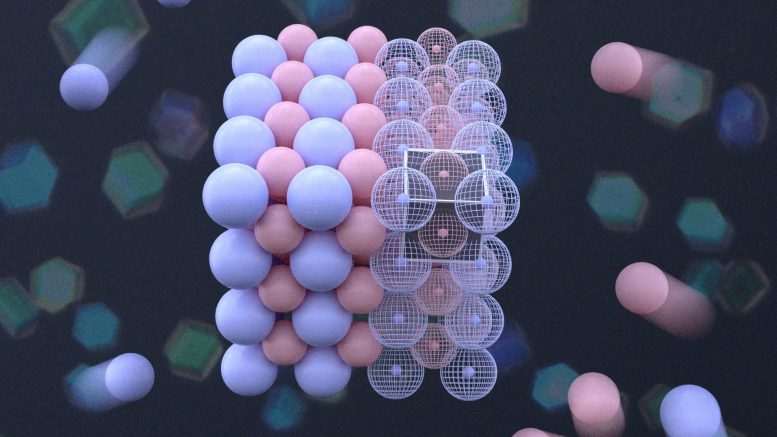
Chemistry June 3, 2024
Inside the Crystal Matrix: New “X-Ray Vision” Technique Sees Inside Crystals
Developing transparent particles and imaging their positions, researchers shed light on never-before-seen interiors of crystalline structures. A team of New York University researchers has created…

Revolutionizing Molecular Science: Scientists Unveil Groundbreaking Single-Molecule Detection Technique

Carbon Capture “Miracle Material” Breakthrough: MOF-525 Can Capture and Convert CO2 Into Useful Chemicals

Hazards in Your Chocolate? New Study Reveals Potential Risks

Sunglasses for Your Windows: Chameleon Coatings for Smarter, Cooler Living Spaces

Harvard Scientists Discover Quantum Order in Chemical Chaos

Promethium Discovery Set to Rewrite Chemistry Textbooks

“Unprecedented Discovery” – New Low-Cost Catalyst Converts Carbon Dioxide to Valuable Chemicals

Efficiency Unlocked: Novel Catalyst Model Sets New Standards in Fuel Cell Technology
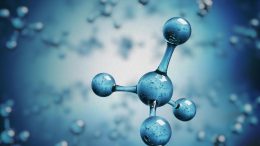
Chemistry May 21, 2024
New Catalysts Turn the Greenhouse Gas Methane Into Valuable Chemicals
Researchers developed a novel catalyst that converts methane into valuable chemicals more sustainably, potentially advancing efforts to decarbonize the chemical industry. Methane, a potent greenhouse…

Chemistry May 20, 2024
A Symphony of Bonds: Sonification Unlocks Protein Folding Pathways
Researchers used sound to reveal hidden patterns in protein folding, emphasizing the role of hydrogen bonds and water molecules in shaping protein structures. Scientists have…

Chemistry May 19, 2024
Turning Tech Trash Into Precious Metals: Extracting Gold, Silver and Copper From Electronic Waste
Waste computers and cell phones, solar panels, and other electronic waste are becoming an important source of noble metals alongside mining. Researchers at the University…

Chemistry May 18, 2024
Breakthrough Enzyme Discovery Could Make Widely Used Plastic Polystyrene Biodegradable
Studying the role of a particular bacterial enzyme has paved the way for the biotechnological breakdown of styrene. Polystyrene, composed of styrene units, is the…

New Solar Technology Converts Greenhouse Gases Into Valuable Fuel
A new photocatalyst developed by Shanghai Jiao Tong University offers a green, efficient method for converting greenhouse gases into chemicals using solar power, marking a…

Chemistry May 17, 2024
Harnessing Biosorption: Turning Brewery Waste Into a Water Purification Powerhouse
A filter made from brewery waste yeast encapsulated in hydrogels can quickly absorb lead from contaminated water. Beer breweries generate and discard thousands of tons…

MIT Unveils Game-Changing Sensor for Toxic Gas Detection
A breakthrough in gas detection technology at MIT combines high sensitivity and continuous monitoring. The material could be made as a thin coating to analyze…

Chemistry May 16, 2024
Revolutionizing Organic Chemistry: Boronic Acid-Powered Enzyme Yields Groundbreaking Catalysis
Boronic acid has been utilized in organic chemistry for decades, despite not being found in any living organism. ‘It gives rise to different chemical reactions…

Chemistry May 15, 2024
20-Year-Old Molecular Prediction Comes True – Chemists Have Finally Succeeded in Synthesizing an Unusual and Elusive Molecule
The first and the best-known metallocene is ‘ferrocene’, which contains a single iron atom. Sandwich complexes are now standard topics in inorganic chemistry textbooks, and…
- Grades 6-12
- School Leaders
NEW: Classroom Clean-Up/Set-Up Email Course! 🧽
Every product is independently selected by (obsessive) editors. Things you buy through our links may earn us a commission.
45 Cool Chemistry Experiments, Demos, and Science Fair Projects
Don’t forget your safety equipment!
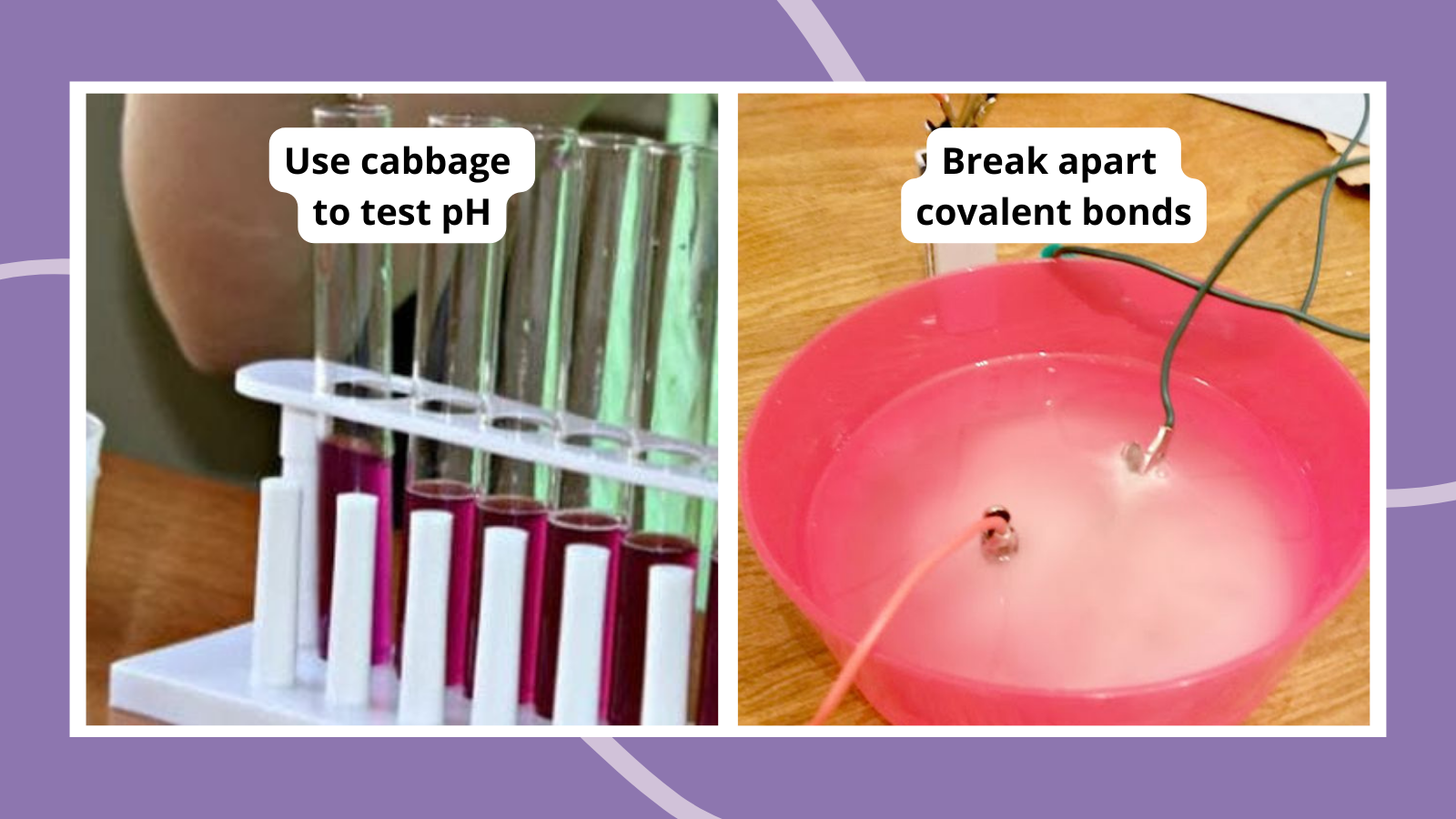
Bunsen burners, colorful chemicals, and the possibility of a (controlled) explosion or two? Everybody loves chemistry experiments! We’ve rounded up the best activities, demos, and chemistry science fair projects for kids and teens. Try them in the classroom or at home.
Easy Chemistry Experiments and Activities for All Ages
Chemistry science fair projects.
These chemistry experiments and activities are all easy to do using simple supplies you probably already have. Families can try them at home, or teachers and students can do them together in the classroom.
Mix up some magic milk
Kids love this colorful experiment, which explores the concept of surface tension. This is one of our favorite chemistry experiments to try at home, since the supplies are so basic and the results are so cool!

Taste the Rainbow
Teach your students about diffusion while creating a beautiful and tasty rainbow. You’ll definitely want to have extra Skittles on hand so your class can enjoy a few as well!
Learn more: Skittles Diffusion

Crystallize sweet treats
Crystal science experiments teach kids about supersaturated solutions. This one is easy to do at home, and the results are absolutely delicious!
Learn more: Candy Crystals
Make elephant-sized toothpaste
This fun project uses yeast and a hydrogen peroxide solution to create overflowing “elephant toothpaste.” You can also add an extra fun layer by having kids create toothpaste wrappers for their plastic bottles.

Blow the biggest bubbles you can
Add a few simple ingredients to dish soap solution to create the largest bubbles you’ve ever seen! Kids learn about surface tension as they engineer these bubble-blowing wands.
Learn more: Giant Soap Bubbles

Demonstrate the “magic” leakproof bag
So simple and so amazing! All you need is a zip-top plastic bag, sharp pencils, and some water to blow your kids’ minds. Once they’re suitably impressed, teach them how the “trick” works by explaining the chemistry of polymers.
Learn more: Leakproof Bag

Use apple slices to learn about oxidation
Have students make predictions about what will happen to apple slices when immersed in different liquids, then put those predictions to the test! Finally, have them record their observations.
Learn more: Apple Oxidation
Float a marker man
Their eyes will pop out of their heads when you “levitate” a stick figure right off the table. This experiment works due to the insolubility of dry-erase marker ink in water, combined with the lighter density of the ink.
Learn more: Floating Marker Man

Discover density with hot and cold water
There are a lot of easy science experiments you can do with density. This one is extremely simple, involving only hot and cold water and food coloring, but the visuals make it appealing and fun.
Learn more: Layered Water
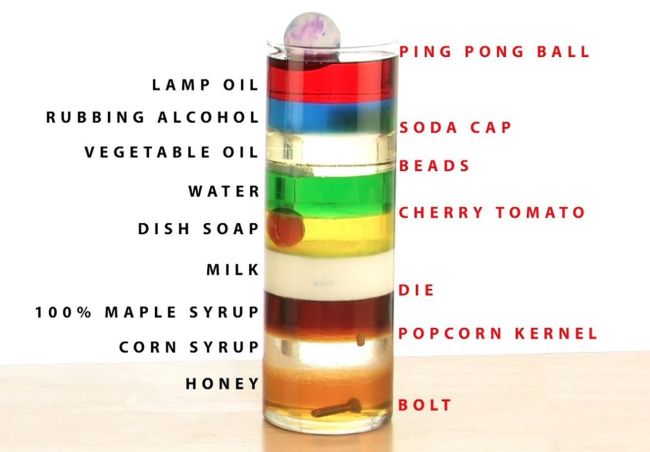
Layer more liquids
This density demo is a little more complicated, but the effects are spectacular. Slowly layer liquids like honey, dish soap, water, and rubbing alcohol in a glass. Kids will be amazed when the liquids float one on top of the other like magic (except it is really science).
Learn more: Layered Liquids

Grow a carbon sugar snake
Easy science experiments can still have impressive results. This eye-popping chemical reaction demonstration only requires simple supplies like sugar, baking soda, and sand.
Learn more: Carbon Sugar Snake

Make homemade bouncy balls
These homemade bouncy balls are easy to make since all you need is glue, food coloring, borax powder, cornstarch, and warm water. You’ll want to store them inside a container like a plastic egg because they will flatten out over time.
Learn more: Make Your Own Bouncy Balls

Create eggshell chalk
Eggshells contain calcium, the same material that makes chalk. Grind them up and mix them with flour, water, and food coloring to make your very own sidewalk chalk.
Learn more: Eggshell Chalk

Make naked eggs
This is so cool! Use vinegar to dissolve the calcium carbonate in an eggshell to discover the membrane underneath that holds the egg together. Then, use the “naked” egg for another easy science experiment that demonstrates osmosis .
Learn more: Naked Egg Experiment
Turn milk into plastic
This sounds a lot more complicated than it is, but don’t be afraid to give it a try. Use simple kitchen supplies to create plastic polymers from plain old milk. Sculpt them into cool shapes when you’re done.
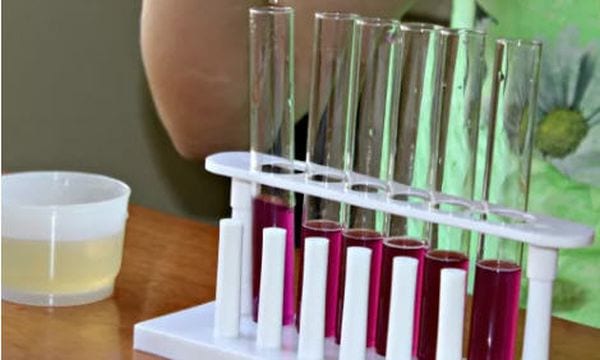
Test pH using cabbage
Teach kids about acids and bases without needing pH test strips. Simply boil some red cabbage and use the resulting water to test various substances—acids turn red and bases turn green.
Learn more: Cabbage pH
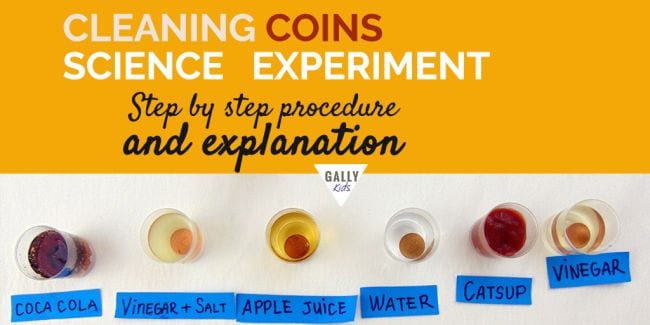
Clean some old coins
Use common household items to make old oxidized coins clean and shiny again in this simple chemistry experiment. Ask kids to predict (hypothesize) which will work best, then expand the learning by doing some research to explain the results.
Learn more: Cleaning Coins
Blow up a balloon (without blowing)
Chances are good you probably did easy science experiments like this when you were in school yourself. This well-known activity demonstrates the reactions between acids and bases. Fill a bottle with vinegar and a balloon with baking soda. Fit the balloon over the top, shake the baking soda down into the vinegar, and watch the balloon inflate.
Learn more: Balloon Experiments
Assemble a DIY lava lamp
This 1970s trend is back—as an easy science experiment! This activity combines acid/base reactions with density for a totally groovy result.

Explore how sugary drinks affect teeth
The calcium content of eggshells makes them a great stand-in for teeth. Use eggs to explore how soda and juice can stain teeth and wear down the enamel. Expand your learning by trying different toothpaste and toothbrush combinations to see how effective they are.
Learn more: Sugar and Teeth Experiment
Mummify a hot dog
If your kids are fascinated by the Egyptians, they’ll love learning to mummify a hot dog. No need for canopic jars ; just grab some baking soda and get started.
Extinguish flames with carbon dioxide
This is a fiery twist on acid-base experiments. Light a candle and talk about what fire needs in order to survive. Then, create an acid-base reaction and “pour” the carbon dioxide to extinguish the flame. The CO2 gas acts like a liquid, suffocating the fire.

Send secret messages with invisible ink
Turn your kids into secret agents! Write messages with a paintbrush dipped in lemon juice, then hold the paper over a heat source and watch the invisible become visible as oxidation goes to work.
Learn more: Invisible Ink
Set popcorn dancing
This is a fun version of the classic baking soda and vinegar experiment, perfect for the younger crowd. The bubbly mixture causes popcorn to dance around in the water.
Learn more: Dancing Popcorn Experiment
Shoot a soda geyser sky-high
You’ve always wondered if this really works, so it’s time to find out for yourself! Kids will marvel at the chemical reaction that sends diet soda shooting high in the air when Mentos are added.
Learn more: Mentos and Coke Experiment
All of these chemistry experiments are perfect for using the scientific method. Form a hypothesis, alter the variables, and then observe the results! You can simplify these projects for younger kids, or add more complexity for older students.

Break apart covalent bonds
Difficulty: Medium / Materials: Medium
Break the covalent bond of H 2 O into H and O with this simple experiment. You only need simple supplies for this one. Turn it into a science fair project by changing up the variables—does the temperature of the water matter? What happens if you try this with other liquids?
Learn more: Breaking Covalent Bonds
Measure the calories in various foods
Are the calorie counts on your favorite snacks accurate? Build your own calorimeter and find out! This kit from Home Science Tools has all the supplies you’ll need.

Detect latent fingerprints
Forensic science is engrossing and can lead to important career opportunities too. Explore the chemistry needed to detect latent (invisible) fingerprints, just like they do for crime scenes!
Learn more: Fingerprints Project
Use Alka-Seltzer to explore reaction rate
Difficulty: Easy / Materials: Easy
Tweak this basic concept to create a variety of high school chemistry science fair projects. Change the temperature, surface area, pressure, and more to see how reaction rates change.
Determine whether sports drinks really have more electrolytes than other beverages
Difficulty: Medium / Materials: Advanced
Are those pricey sports drinks really worth it? Try this experiment to find out. You’ll need some special equipment for this one; buy a complete kit at Home Science Tools .
Turn flames into a rainbow
You’ll need to get your hands on a few different chemicals for this experiment, but the wow factor will make it worth the effort. Make it a science project by seeing if different materials, air temperature, or other factors change the results.
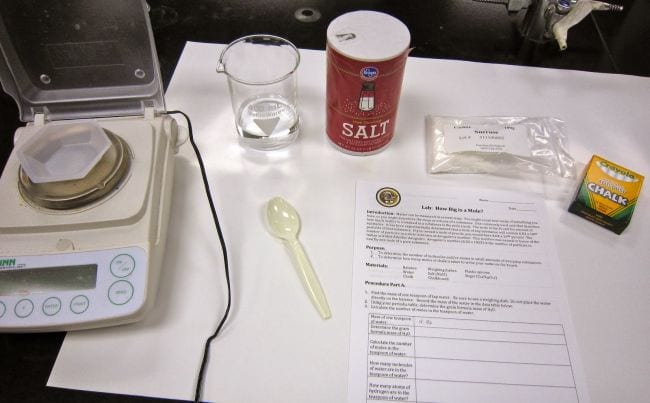
Discover the size of a mole
The mole is a key concept in chemistry, so it’s important to ensure students really understand it. This experiment uses simple materials like salt and chalk to make an abstract concept more concrete. Make it a project by applying the same procedure to a variety of substances, or determining whether outside variables have an effect on the results.
Learn more: How Big Is a Mole?

Cook up candy to learn mole and molecule calculations
This edible experiment lets students make their own peppermint hard candy while they calculate mass, moles, molecules, and formula weights. Tweak the formulas to create different types of candy and make this into a sweet science fair project!
Learn more: Candy Chemistry

Make soap to understand saponification
Take a closer look at an everyday item: soap! Use oils and other ingredients to make your own soap, learning about esters and saponification. Tinker with the formula to find one that fits a particular set of parameters.
Learn more: Saponification
Uncover the secrets of evaporation
Explore the factors that affect evaporation, then come up with ways to slow them down or speed them up for a simple science fair project.
Learn more: Evaporation
More Chemistry Experiment Science Fair Ideas
These questions and prompts can spark ideas for unique chemistry experiments:
- Compare the properties of sugar and artificial sweeteners.
- Explore the impact of temperature, concentration, and seeding on crystal growth.
- Test various antacids on the market to find the most effective product.
- What is the optimum temperature for yeast production when baking bread from scratch?
- Compare the vitamin C content of various fruits and vegetables.
- How does temperature affect enzyme-catalyzed reactions?
- Investigate the effects of pH on an acid-base chemical reaction.
- Devise a new natural way to test pH levels (such as cabbage leaves).
- What’s the best way to slow down metal oxidation (the form of rust)?
- How do changes in ingredients and method affect the results of a baking recipe?
Like these chemistry experiments? Don’t miss STEM Activities for Kids of All Ages and Interests .
Plus, get all the latest teaching news and ideas when you sign up for our free newsletters.

You Might Also Like
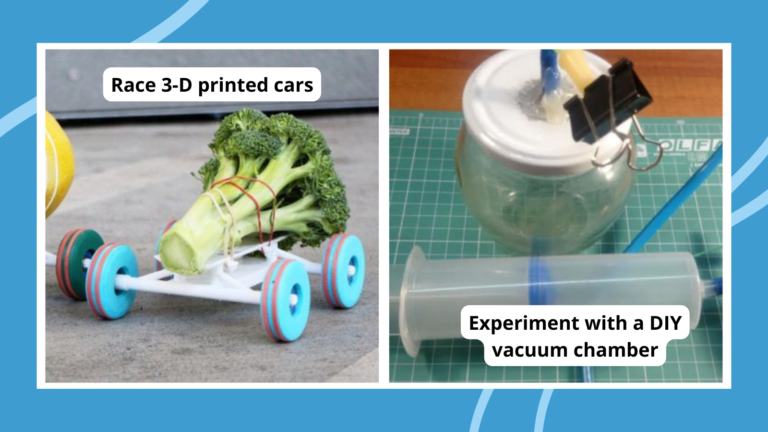
70 Best High School Science Fair Projects in Every Subject
Fire up the Bunsen burners! Continue Reading
Copyright © 2024. All rights reserved. 5335 Gate Parkway, Jacksonville, FL 32256
Scientists develop most sensitive way to observe single molecules
Scientists at the University of Wisconsin-Madison have developed the most sensitive method yet for detecting and profiling a single molecule -- unlocking a new tool that holds potential for better understanding how the building blocks of matter interact with each other. The new method could have implications for pursuits as varied as drug discovery and the development of advanced materials.
The technical achievement, detailed this month in the journal Nature , marks a significant advance in the burgeoning field of observing individual molecules without the aid of fluorescent labels. While these labels are useful in many applications, they alter molecules in ways that can obscure how they naturally interact with one another. The new label-free method makes the molecules so easy to detect, it is almost as if they had labels.
"We're very excited about this," says Randall Goldsmith, a UW-Madison professor of chemistry who led the work. "Capturing behaviors at the level of single molecules is an amazingly informative way of understanding complex systems, and if you can build new tools that grant better access to that perspective, those tools can be really powerful."
While researchers can glean useful information from studying materials and biological systems at larger scales, Goldsmith says that observing the behavior of and interactions between individual molecules is important for contextualizing that information, sometimes leading to new insights.
"When you see how nations interact with each other, it all comes down to interactions between individuals," says Goldsmith. "You wouldn't even think of understanding how groups of people interact with each other while ignoring how individuals interact with each other."
Goldsmith has been chasing the allure of single molecules since he was a postdoctoral researcher at Stanford University more than a decade ago. There, he worked under the chemist W.E. Moerner, who received the Nobel Prize in chemistry in 2014 for developing the first method of using light to observe a single molecule.
Since Moerner's initial success, researchers around the world have devised and refined new ways to observe these tiny bits of matter.
The method that the UW-Madison team developed relies on a device called an optical microresonator, or microcavity. As its name suggests, the microcavity is an extremely tiny space where light can be trapped in both space and time -- at least for a few nanoseconds -- where it can interact with a molecule. Microcavities are more commonly found in physics or electrical engineering laboratories, not chemistry labs. Goldsmith's history of combining concepts from disparate scientific fields was recognized in 2022 with a Polymath award from Schmidt Futures.
Microcavities are built from incredibly small mirrors fashioned right on top of a fiber optic cable. These fiber optic mirrors bounce the light back and forth many times very quickly within the microcavity.
The researchers let molecules tumble into the cavity, let the light pass through it, and can not only detect the molecule's presence, but also learn information about it, such as how fast it moves through water. This information can be used to determine the molecule's shape, or conformation.
"Conformation at the molecular level is incredibly important, particularly for thinking about how biomolecules interact with each other," says Goldsmith. "Let's say you have a protein and you have some small-molecule drug. You want to see if the protein's druggable, which is to say, 'Does the drug have some kind of major interaction with the protein?' One way you might be able to see that is if it introduces a conformational change."
There are other ways to do that, but they require large amounts of sample material and time-consuming analyses. With the newly developed microcavity technique, Goldsmith says, "we can potentially build a black-box tool to give us the answer in tens of seconds."
The team, which included Lisa-Maria Needham, a former postdoctoral researcher who is now a laboratory director at the University of Cambridge, has filed a patent for the device. Goldsmith says the device and methods will now be refined over the next couple of years. In the meantime, he says he and his collaborators are already thinking about the many ways it could be useful.
"We're excited about many other applications in spectroscopy," he says. "We hope we can use this as a stepping stone to other ways to learn about molecules."
This research was primarily funded by the National Institutes of Health (R01GM136981), with resonator construction supported by the Q-NEXT Quantum Center, a U.S. Department of Energy, Office of Science, National Quantum Information Science Research Center, under award number DE-FOA-0002253.
- Organic Chemistry
- Nature of Water
- Inorganic Chemistry
- Quantum Physics
- Materials Science
- Evaporation
- Macromolecule
- Plasma (physics)
- Fluid mechanics
Story Source:
Materials provided by University of Wisconsin-Madison . Original written by Will Cushman. Note: Content may be edited for style and length.
Journal Reference :
- Lisa-Maria Needham, Carlos Saavedra, Julia K. Rasch, Daniel Sole-Barber, Beau S. Schweitzer, Alex J. Fairhall, Cecilia H. Vollbrecht, Sushu Wan, Yulia Podorova, Anders J. Bergsten, Brandon Mehlenbacher, Zhao Zhang, Lukas Tenbrake, Jovanna Saimi, Lucy C. Kneely, Jackson S. Kirkwood, Hannes Pfeifer, Edwin R. Chapman, Randall H. Goldsmith. Label-free detection and profiling of individual solution-phase molecules . Nature , 2024; 629 (8014): 1062 DOI: 10.1038/s41586-024-07370-8
Cite This Page :
Explore More
- More Effective Multipurpose Robots
- CO2 Conversion at a Much Larger Scale
- The Embryo Assembles Itself
- Thawing Permafrost: Not A Tipping Point
- Climate Change Was No Problem for Sharks
- Fungus Breaks Down Ocean Plastic
- Kinship and Ancestry of the Celts
- How Statin Therapy May Prevent Cancer
- Origins of 'Welsh Dragons' Exposed
- Resting Brain: Neurons Rehearse for Future
Trending Topics
Strange & offbeat.

IMAGES
VIDEO
COMMENTS
Computational Chemistry Research Topics. Computational chemistry is a way to use computers to help chemists understand chemical reactions. This can be done by simulating reactions or by designing new molecules. If you are looking for essential chemistry research topics in computational chemistry, here are some ideas to get you started:
Organic Chemistry Research Topics. Organic Chemistry Research Topics are as follows: Development of novel synthetic routes for the production of biologically active natural products. Investigation of reaction mechanisms and kinetics for organic transformations. Design and synthesis of new catalysts for asymmetric organic reactions.
Easy Chemistry Research Topics. The science studied in high schools is way simpler compared to postgraduate one. You can find easy chemistry topics to research if you focus on certain academic levels and sub-areas. For example, physical chemistry has easy chemistry topics to do research paper on.
Chemistry Research Area #3: Materials Science and Nanotechnology. Materials science and nanotechnology are fields that hold the key to groundbreaking innovations in various industries. For high school students looking for chemistry research ideas, these areas offer a unique blend of chemistry, physics, and engineering, providing a glimpse into ...
Interesting Chemistry Research Areas. As one sees chemistry topics for research project, it is crucial to choose something that interests you and can fully reveal innovative approach to studies or laboratory work. For example, one can combine biology with genome analysis, which will lead to study of NanoChemistry - innovative and hot topic!
ACS Publications regularly produces collections of the most important chemistry research topics. These Virtual Collections of the most important chemistry research topics bring together the most important ideas in the field in a variety of ways, including Special Issues and ACS Selects from across the portfolio journals. These collections reflect the most important chemistry research […]
Easy Research Topics in Chemistry. These are a few chemistry research topics that are important and easy simultaneously. So here are some essential chemistry topics which may interest you: Introduction to modern liquid chromatography; Rational molecular design for achieving persistence and reducing toxicity;
Some Basic & Easy Chemistry Research Topics. 1. Acids and Bases- Introduction. 2. Acid rain and its formation. 3. Why do atoms combine to form molecules? 4. Introduce the discovery of the Periodic Table of the Elements (1860s - 1870s) ... Unique & Innovative Chemistry Research Topics. 1. Snow pollution and its disadvantages. 2. Sapphires and ...
19 of the Most Interesting Chemistry Research Topics: Q2 2019. Freddy Tellez. Sep 13, 2019. 1 min read. Get access to some of the most interesting chemistry research topics with these Virtual Collections from ACS Publications. Virtual Collections include Virtual Issues, Virtual Special Issues, and ACS Selects from ACS journals.
21 Cutting-Edge Chemistry Topics. Freddy Tellez. Jul 31, 2020. 14 min read. ACS Publications regularly produces collections of the most important chemistry research topics. These Virtual Collections of the most important chemistry research topics bring together the most important ideas in the field in a variety of ways, including Special Issues ...
Physical chemistry research topics. Laws of Thermodynamics. Energy Balance. Gases: Gas Law. harles and Gay Lussac's law. General Ideal Gas Law. The mass of a chemical compound. The moles of an atomic species. The flow of Fluids in Closed Ducts.
Explore 201+ chemistry project topics - from organic synthesis to environmental analysis - and uncover the wonders of chemical science. ... Refine Your Topic and Formulate a Research Plan: Once you've selected a topic, refine it further by clearly defining your research question or hypothesis. Develop a research plan outlining the ...
Physical Chemistry Topics. The role of sulfur-based emissions in contributing to air pollution. Discuss the evolution of the atomic structure over time. How to use mass number to find the number of fundamental particles in ions and atoms. Discuss the existence of isotopes in various reactions.
Contents hide. 1 Organic chemistry research topics. 2 Inorganic chemistry research paper topics. 3 Biochemistry research paper topics. 4 Medicinal chemistry research paper topics. 5 Chemistry project topics on nanomaterials. 6 Green chemistry research paper topics. 7 Chemistry research paper topics on education.
Chemical Diversity of Circumstellar Envelopes Around Evolved Stars. Advances our understanding of how atoms, ions, and molecules come together and come apart. It explores the role of chemistry in our everyday lives - from electronic devices to health and wellbeing.
Physical Chemistry Research Topics. Organic Chemistry Research Topics. Inorganic Chemistry Research Topics. Biochemistry Research Ideas. Analytical Chemistry Research Topics. Nuclear Chemistry Research Topics. Green Chemistry Research Topics. Advanced Chemistry Topics for Research. Innovative Chemistry Research Paper Topics.
Many students encounter difficulties when choosing chemistry topics. That's because many learners struggle with many topic ideas. Others have to consider bordering disciplines. Unfortunately, many students look for easy and popular chemistry topics for research. But, this might not be efficient because research papers should be original.
Physical Chemistry Projects. Chemical Kinetics: Investigate the rate of chemical reactions under different conditions and analyze reaction mechanisms. Electrochemistry: Explore the principles of electrochemical cells, study electrode processes, and investigate applications in energy storage.
200 Outstanding Chemistry Topics For Research Papers. Chemistry is an interesting science because you can study global phenomena or the smallest particles of various organic or inorganic compounds. When choosing chemistry research paper topics, you can focus on a specific section, select an entire industry, and be guided by authoritative sources.
If you'd like to better your chemistry skills, take a look at these topics: 13. Investigate how molecules are made in nature,such as what reactions are performed by enzymes to make natural products. 14. Study a reaction that changes color as it proceeds using your phone to measure the RGB-code evolution. 15.
Easy Chemistry Topics. At the very end of our list, you can find the easy chemistry topics. These are perfect for when you need to write an essay quickly (usually in less than an hour). You don't want to do a lot of research and you want to find all the relevant information with a single Google search. These are the topics for you:
Read interesting chemistry news and breakthrough research on related topics like Biochemistry, Chemical Engineering, Materials Science, Nanoparticles, and Polymers. Our comprehensive coverage spans the spectrum of chemistry, from organic and inorganic chemistry to biochemistry, analytical chemistry, and beyond.
Extinguish flames with carbon dioxide. This is a fiery twist on acid-base experiments. Light a candle and talk about what fire needs in order to survive. Then, create an acid-base reaction and "pour" the carbon dioxide to extinguish the flame. The CO2 gas acts like a liquid, suffocating the fire.
The new label-free method makes the molecules so easy to detect, it is almost as if they had labels. "We're very excited about this," says Randall Goldsmith, a UW-Madison professor of chemistry ...